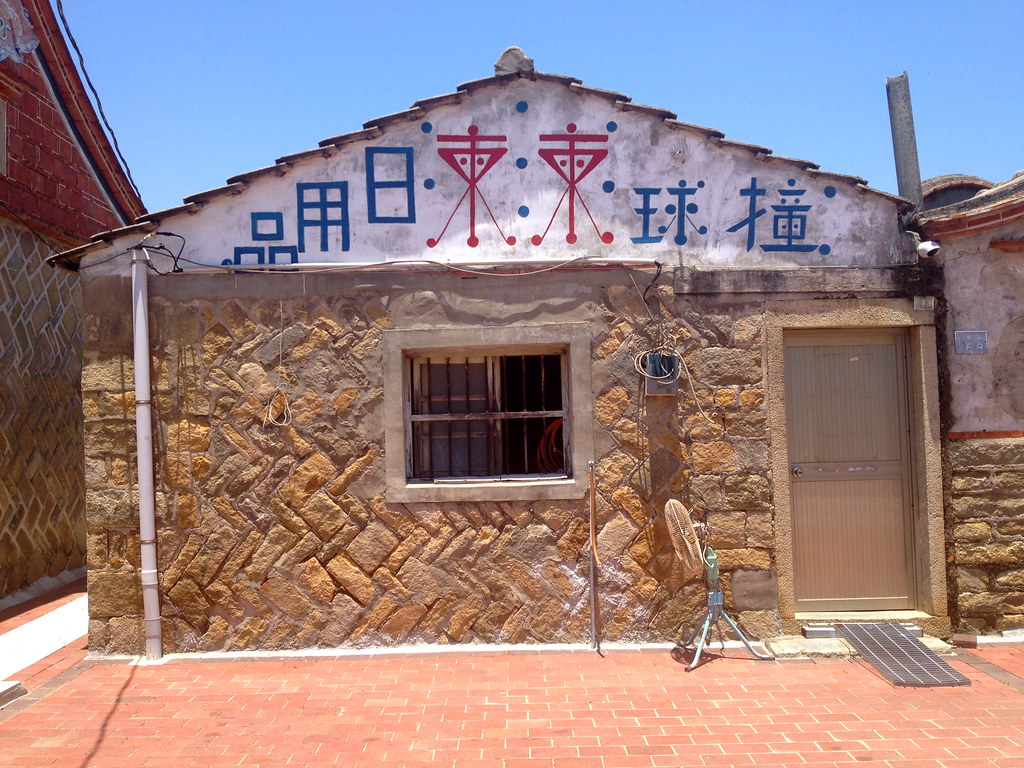First, I'm sorry for the boring title.
Secondly, I've been toying with the idea of starting an ELT blog, separate from Lao Ren Cha (but obviously with lots of links between the two). I haven't decided to commit to it just yet, and I'm curious about outside opinions - a good way to go, or just keep my ELT commentary to Lao Ren Cha, even though it's not quite the focus of this blog? The argument for a new blog is obvious - it would be more targeted. The argument against is that I have enough trouble finding the time to maintain this blog and I'm not sure I have time at all for another.
Anyway, here are some reflections on doing Delta in a more general sense, contrasted to my previous post on doing the Delta specifically in Taiwan.
The good:
I was impressed with the level and methods of assessment on Delta - basically all three modules taken together assess you in three distinct ways: a task-based exam (Module One), a portfolio (Module Two) and a paper (Module 3). In my opinion (and according to good testing practice) this gives you a full, accurate look at what a teacher is capable of in a variety of situations, from theory to teaching to syllabus design, and how much they've progressed. I liked that no one method was used, which also ensures that someone who is, say, not particularly good at tests, or papers, or what have you, still has a chance to shine in another module with some other assessment method. I especially liked this as, although I have always thought of myself as a good test-taker, I flamed out on the Module One exam and while I did pass, I didn't get the Merit or Distinction I had been gunning for, which I do think I was capable of earning. It was a relief to have other ways to prove myself in later modules.
I also learned a hell of a lot. It's fairly common to hear folks, most of whom have never attempted Delta, to slam it as empty credentialism, a money-making scheme for Cambridge. It's no surprise - they do the same thing for CELTA, and often claim "all you need to know" you can pick up from experience. I reject this notion on its face - yes, experience is valuable, but input from people more experienced and knowledgeable than you as you gain that experience is what makes it truly worthwhile. If you spend 5 years teaching, with no input or feedback beyond what's in your head, the experience is still great but it is simply not going to be worth as much as if you spend 5 years teaching, and throughout those years are observed, get feedback, are assessed, attend input sessions, gain a strong theoretical background via training (so you'll know why good strategies work, not just "weird tricks". Teaching isn't a diet fad) and attempt higher-level teaching accomplishments such as good syllabus design with guidance rather than with a slapdash "let's see what works" approach.
So, I'm just not on board with that side of the debate, and as I see it the proof is really in the papers: I know more after Delta - significantly more - than I did before. Period. Though a lot of CELTA was pretty common-sense (though not necessarily easy for everyone to implement in practice), a lot of the theory and practice in Delta is not always, or particularly, intuitive and by Module Two - at least if you are trying to write the best possible language skills/systems assignments (LSAs) - you are delving past the introductory textbooks and deep into some fairly technical research papers and journal articles. Sometimes you're just looking for citable confirmation of things you know to be true (also a valid thing!) but at other times you're coming across completely new ideas. For example, when I did my LSA on helping pre-intermediate learners use the definite article, I was already aware of the idea of "the-flooding", but what I didn't know was the extent to which it had been studied and documented. But when I did my final LSA on discourse (hedging for intermediate learners in a business e-mail writing class), I was quite surprised to learn that the concept of hedging was far broader than I'd originally thought, and it was challenging to narrow my focus enough to write a solid essay and plan a focused class on a sub-topic of same.
I appreciated that it is carefully delineated into sections with distinct learning goals that, while they don't have to be taken in order per se, build on each other.
Module One: If you do Module One first - which I recommend you do - you get the theoretical foundation you need to do well in the other two modules (which can then be taken in any order). The exam seems daunting when you begin, but by the end you'll look back on it as the easiest part of the Delta. If you take a step back and look at what the exam aims to accomplish, if you study well you'll gain:
- A fairly solid background in terminology (if concepts can only be fully understood through having language to describe them, which I do believe to be true, then this is worthwhile)
- An overview of systems - all of them, as you won't know which will appear on the exam
- An overview of basic concepts in testing and assessment
- The chance to look more deeply at the assumptions that underlie language teaching materials, and which materials are appropriate for learners at what point and different ways of approaching different learning targets
- An overview of, with the chance to interact and think about beliefs about teaching
- The ability to apply these concepts to feedback on actual learner work
Module Two: Module Two helps you dive into your actual classroom practice and re-examine your habits and norms, thinking more deeply about what you do in class, why, and how it affects learners, while giving you the chance to learn in fairly great detail about four (out of a possible eight) skills/systems areas. You choose two skills from reading, listening, speaking and writing - one choice must be receptive, the other productive - and two systems from discourse, phonology, lexis and grammar. Then you narrow down your focus to look at one area within your selected skill or system - for example, when I did an assignment on listening I chose connected speech in authentic listening - to learn and write about it in some depth before teaching a class on that topic (as a result your choices ought to reflect what your learners need at the time) and getting detailed feedback on it. The classes themselves are a bit fake-feeling, I mean, the learners are learning something useful but in real life teaching is never so carefully compartmentalized into 40-60 minute increments. If you look at it another way, though, that narrow time focus also allows you to examine, almost microscopically, your habits and practices and how they affect learners. When you go back to teaching "normally", you'll be more inclined to think deeply about what you are doing, why, and what learners are getting from it.
Module Three then takes a step back and has you working with syllabus design and course planning, including needs analysis and assessment - all things any well-trained teacher would do well to get outside their own head and their own coping strategies to learn about. You also have the chance to "specialize" - to choose one area of ELT to focus on - which looks good on a CV (all of the very best teaching jobs, at least in the private sector, like to see some form of specialization). What dedicated teacher wouldn't want a chance to learn about the principles of syllabus design, and then apply those principles to designing a syllabus for a real group of learners, getting feedback on your work as you go? What teacher wouldn't be well-served by reading more of what experts say on testing?
So, let's say you do Module One, and to improve your chances of getting full points on the systems task (it used to be Paper One Task Four but that may have changed), you do the work in About Language. You learn about phonology, the basics of grammar and the basics of lexis (semantics, morphology), and perhaps you bone up on these latter points though an introductory Linguistics textbook. To make sure you are best able to look at class materials, textbook materials and student work - and get maximum points in those areas - you get a crash course in discourse fundamentals via Beyond The Sentence. Later, when you do Module Two and it's time to choose a skill or system, you have a reasonably strong foundation from which to do so, and you can build on that by looking more in-depth at a more narrowly-focused topic. With that knowledge you dive into how to sequence individual classes, and what to plan in them, in Module Three, and your Module One background in testing and assessment helps you in that paper, as well.
Think about that - does it sound like "meaningless credentialism" to you? Then consider what all of the anti-training types are really saying - I don't want a fundamental knowledge of theory and systems! My coping strategies are good enough! It's not necessary for me to be observed on my teaching and I don't need any feedback! I don't need to know the basics of syllabus design or testing. It is not important for me to have read up on what people before me, who have a wealth of expertise, research findings and knowledge, have to say about teaching certain skills or systems. I do not need external feedback on my self-reflection at any point - everything I need I can come up with in my own head because I'm a super genius, or something, able to duplicate in moments the work of years of others' dedicated research, and fabricate brilliant new teaching ideas without any contact with other ideas or professionals! Or alternatively, teaching isn't a real profession, any idiot could do it and there is nothing more to it than throwing out some vocabulary and grammar and doing some drills, perhaps with a game. It is not necessary to think about it any more deeply than that.
Does anyone with either attitude sound like someone you'd want on your team?
I also like that doing these three modules pushed me to do what I might not have otherwise done - or otherwise done as well, sans feedback - such as reading up on the practice of Business English teaching or gaining a fundamental knowledge of assessment. It gave me the chance to work with ideas I might not have otherwise gotten the chance to work with, such as syllabus design, as it's surprising how few schools require any sort of syllabus from teachers.
Finally, I like that I was able to do the whole thing at a distance, without leaving Taiwan, and more cheaply than a regular postgraduate degree. This can be done through The Distance Delta or Bell. They are more or less the same, the only difference being that The Distance Delta wants you to do an orientation abroad for Module Two, which is not required at Bell. The Distance Delta, however, gives you access to International House's online library, which Bell does not. I like that, while many countries and institutions don't necessarily recognize it as such, the Delta is recognized in Europe as equal in level to a Master's degree (they're both rated Level 7 by Ofqual), and when you finish you do come out feeling like you have a Master's worth of knowledge, or nearly so, along with something most Master's programs don't provide - in-class practicums with assessment and feedback. And when I do get a Master's, I like that it will likely entitle me to an exemption from some courses or modules.
In fact, you could say I appreciate that the way I did it is not the only way. You can do the modules separately as you are able, you can do them online, you can do them face-to-face (though it's hard at times to find a center that will deliver a single module face-to-face), you can do them part-time or full-time, you can do them in one go in an intensive course, or as part of a Master's in at least one case.
But of course, with all of that good stuff, there's also bad:
I hate to harp on price, because while a lot of people will accuse Delta of being nothing more than a moneymaker for Cambridge, I actually get the feeling it doesn't turn a huge profit. Remember your tuition has to cover tutors, assessors, overseers (the folks who consistently review the Delta requirements and tweak them as needed), office space, assessment development, writing and handbook updates, IT, certification creation and printing, administration, accounting and more. And a lot of the fees charged are so that the centers offering the courses can turn a profit, only some (if any?) of it actually goes back to Cambridge. For a few hundred pounds for Modules 1 and 3, and a few thousand for Module 2 (a chunk of which goes to your local tutor), I doubt this is the cash cow that some people think it is.
But, having taken all of that into consideration, honestly, Module Two especially is quite financially burdensome for English teachers. We are not rich, generally. We don't make heaps of money. I get that education costs money and somebody's gotta pay, and perhaps if you have a fantastic salary in South Korea (where pay is better than Taiwan relative to cost-of-living, though I've heard it has not gone up in correlation with the increased standard, and cost, of living there in recent years) it's no big deal, however, there is a point at which I question how fair it is to make good, justifiable CPD (continuing professional development) something that is a financial strain for a career teacher.
With this in mind, another issue isn't with Delta itself but with the industry. In any other professional industry not only would qualified people get priority in hiring, but CPD directly related to one's work would be sponsored in part by the company. British Council does offer this, but basically nobody else does.
Another flaw is with some of the assessment methods. I know I praised them above, but that doesn't make them perfect. For instance, while I understand why the exam is timed (you can't have people writing pages and pages of stuff just to try to squeeze more points out of inefficient or off-the-mark writing), the time given is just an eensy bit too short to be reasonable. An extra 15-30 minutes for each paper would set a limit on how much could possibly be written while offering a reasonable amount of time in which to do the test, which raises its validity. Right now, part of what you're tested on is how fast you can write, and that's not really the assessment criteria that counts. Creating a computer-based test where answers can be typed would also be a help in the modern world. And I'm not just saying this because I used up most of my Paper One time on the old Task 4 (a massive systems task) and didn't even get to Task 3 (yet I still passed) - even if I'd gotten the score I feel I was capable of, I would still be saying it. It's just not write to set a test and then set timing for it that is clearly, obviously, too short. (I have the same complaint about IELTS writing, by the way. Far too short a time to produce something good written by hand).
I have less of a problem with the Module Three paper and the Module Two portfolio, and I realize why there are limits set on what you turn in. My only (small) complaint is that what is expected is not always realistic, especially for the assessed classes. In reality, for a systems lesson, one hour is barely enough time to intro the topic, do an activity to set the target language, do meaning, form, pronunciation and use and then practice it with limited feedback. I would do all of that in an hour and a half, but if you move just a tad too quickly (yes, too quickly) you can get it done in an hour. It is not enough time to include extended practice. It is not enough time to answer more than one or two in-depth learner questions, and maybe not even that. It is not long enough to extend the practice as long as you might like or give as much feedback as you'd like. It is not enough time to explore any sort of teachable moment or extra 'noticing'. The result is that while you learn a lot about your teaching, you never quite teach a class like that again, because in the real world it's simply unrealistic. Plus, the feedback you get often includes notes like "it would have been good to include extended practice in collocations" or what have you, and you're all yeah I think so too, but that is not possible in a one-hour class, JEEZUS. You want to see that, GIVE ME MORE TIME.
What's more, when you choose a topic, you're not supposed to be thinking about the class you're eventually going to teach - you're meant to concentrate on the paper first and then plan a class related to it, using one or more of the teaching suggestions given in the paper. But the class you teach has to be important for the learners, fit in with what they already know and what they need (and the course in general), be pitched to their level and needs etc. - how can you choose a topic and write a paper without thinking about what you will eventually teach? (A lot of Delta veterans admit that it's not possible - you must start out considering your eventual learners, and then basically pretend you didn't).
My only qualm with Module Three is that it continues the tradition of giving you not quite enough time to do the best possible job - you design a 20-hour course, which is great except most courses are longer than that, and the word limit for each section is just a bit too short to include everything they seem to want, which again means you are assessed on the compactness of your writing (forget having any sense of style or attempting to make it pleasurable to read) rather than the ideas therein. And I say this as someone who got a Merit. Otherwise, while I actually cried during this module, after it was all over I'd say it was my favorite of the three. I suspect I'm in the minority on that, though!
Overall, I don't see many faults with the design and implementation of Delta, but there are a few concerns worth mentioning. The timing of the Module One course was just about right, and while Module 3 went by a bit more briskly than I would have liked, it was basically okay. But Module Two was way too fast - it seems to me it'd be smartest to give candidates two full weeks between all assessed lessons (so about 3 weeks total) and an extra week for the experimental lesson somewhere in the middle. But in practice, one LSA (assessed lesson + paper) has to be done in two weeks, and often, just due to the way one's work plan rolls out, it's in the time between LSAs 2 and 3, which is generally when you should be doing your experimental lesson. So you suddenly have way too much work to do and way too little time to do it in. More reasonably, courses might simply start two weeks earlier, allowing again for candidates to do their best work within a reasonable time frame rather than being assessed based on how well you work under pressure, rather than the quality of the work you do. I'm not just saying this to complain - I haven't received my results yet but I received Distinctions on at least two papers and a Merit on a class, and I didn't fail any LSAs - I genuinely feel it would be a better experience for everyone to do it this way.
In short, it would be great if Delta could give us adequate time and word count to do the best we are capable of, rather than making it so we are measured not just on the quality of our work but on how well we cram our work into somewhat unreasonable deadlines and parameters, which I feel does detract from overall validity.
My other qualms with Delta aren't really related to Delta itself - things like the difficulties many face in having a reliable, useable class for Module 3 or finding a local tutor for Module 2 (or having access to appropriate classes for it), and how unsupportive a lot of employers can be - not my employers, but I have seen this happen.
Finally, I'd just like the ELT industry to respect Delta more. There's no reason why governments can't recognize it as a valid teaching credential. Certainly not all Master's degrees (which are accepted in Taiwan regardless of their relevance to the field) nor a teaching license for children is as pointedly directed at teaching adults as the Delta. I'd like to see more sponsorship of it by employers - my employers were supportive but I did notice that neither one offered to help sponsor me. I felt like it was seen as something I could do (and pay for) independently, I don't know, for fun or something, and otherwise was not related to their employment of me, when in fact it's directly related to my development as a teacher. Naw, I'm not mad, I'd just like to see more of a British Council attitude to Delta in the industry overall.
Friday, February 5, 2016
Tuesday, February 2, 2016
Doing the Delta in Taiwan: final thoughts
I've meant to write a blog post detailing my Delta experiences in Taiwan for a few months now, and with results coming any day now, I've been reminded that it's been put off for far too long (in my defense, immediately after finishing Module 2 this past December I came down with bronchitis).
Overall, we did manage to do all three modules in 3 years, and could have done them faster. I would say the only reason we chose to do one every September for 3 years was money, and yes, money was a consideration (Modules 1 and 3 aren't that expensive but Module 2 is; besides, it may not look like heaps of money but we also like to travel and have things like student loans to pay).
But really, the main reason I think we didn't push through and do one in March, the next in September and then another one the next March, to finish in a little over a year, is that while a Delta isn't a Master's degree, it's still extremely stressful. It's hardcore and takes up basically all of your free time. Although I feel I have better 'academic endurance' now, after the first two modules I did, I just didn't feel ready to start a new one just a few months after the last one ended.
So, although it took us 3 years, we've proven it can be done from Taiwan. We're not the first or only Delta holders here - there are a small group of them across the island, mostly in Taipei, who mostly seem to know each other, but we are two of the very few who did the entire thing from Taiwan (there are likely a few others at, say, British Council whom I don't know personally). Others either left to do the three-month intensive course, or had Deltas when they arrived. A few are in the midst of doing the modules, as well.
I'm going to start with this - specifically doing the Delta from Taiwan. If you're reading for reflections on the Delta in general, well, that will probably be my next post!
Some good things about doing it here:
- Getting books: Websites like Book Depository (free shipping!) and Bu ke Lai make it easy, if you order in advance, to get the books you need. Sometimes used bookstores like Whose Books (Shilin, back behind the MRT and Gongguan) have used copies, as well. Of course Caves has a solid ELT selection, but it's easier to go in person than to try and order online. It's not that easy to get books here - see below about that - but it's not that hard, either. While it's no Tokyo, London or New York, I imagine Taipei is far easier for Delta candidates than, say, those stationed in Africa, the Middle East or most of rural China. Not having restricted Internet is great, because while China probably wouldn't ban sites you'd need to get articles and studies, you just never know.
- Weird working hours: these often seem to be a bane in this industry and seemingly especially in Taiwan (I could write a whole critique of capitalism based on what the free market has done to ELT here), but when doing the Delta they are not necessarily a problem - bring a book or printout of the journal article you need to read, and you can get work done at odd times of day rather than feeling stuck at a job all day, unable to study. Split shifts are great for this, as you can find a cafe or just go home and do a bit of studying before heading back to class.
- The lower cost of living: this means that, if you're willing to be a bit skint (this assumes you make enough money at a job where you are reasonably professional enough to be well-paid, it might not hold up if you're at, say, Hess where joke wages mean a joke job...#sorrynotsorry), it's easier here to free up your time and still be able to afford to live. I don't know how I could have afforded to live while working more or less part time to do the Delta in the USA, where I was always, always broke even when I was working full time at a salaried job (and even when I had a second job on top of that, which would have made the Delta impossible!). The generally lower hours of an English teacher (more in the range of 18-25, maybe 30 with prep time, rather than a full-time 40) are also beneficial.
- Good Internet - no seriously, due to various family issues I've been in the US a lot over the past two years, and the Internet there just isn't as good as the excellent fiber optic cable Internet in Taiwan (which Chunghwa Telecom will upgrade for you for free, or at least they used to). You'll be doing the courses almost entirely online, so having access to superfast Internet not slowed down by "ho hum, looks like one section of cable actually rides on 1920s phone lines, and I can't fix it, no fast Internet for me, dum-de-dum" which you get in the US).
- The time difference! Man, when the deadline is 9am GMT, that means you have until late afternoon in Taiwan to finish your assignments! Woo! A Sunday night deadline (as is the norm for Module 3) means Monday morning for you.
- British Council - they are fairly active in the ELT community here and there you will find the greatest concentration of qualified teachers. They are able to hold Module 1 exams and are a good place to go to do your Module 2 observations. There isn't always a British Council wherever you are, which may be a hindrance.
- Fairly reliable group classes - I mean, unless you're at, say, Global Village. But it won't be like my friend who worked in Saudi Arabia at an actual university and was having trouble getting everything ready, on time and energetic for students who weren't that interested in an actual education (and she's a good teacher, that wasn't the problem).
- People here who do Delta really care about their teaching and their learners - I'm sure they do everywhere, that's not to poop on Delta holders in other countries, but there are enough challenges (below!) and little enough professional payout (though we'll see), and it's hard enough to find a tutor and pay for the course on low Taiwanese salaries, that those who do decide to go for it REALLY want it. You won't find anyone who does it because 'that's what you do' or because they were asked to, but maybe weren't even that enthusiastic. I'm sure such people exist (I'm also sure they're in the minority, as Delta is stressful enough that you wouldn't stick with it without a good reason), but you generally will not find them in Taiwan. It makes for a good community of professional teachers who care about their learners, their own competence, and the industry.
- It's a good filter - it's far easier to tell good schools from bad, good jobs from bad and good bosses from bad (as well as suss out the attitudes of your coworkers, who may not be bad but may not value professional development, which is at least useful to know about them) when you have done something like Delta, based on how they react to it. Do they look worried that now you are going to cost more? You don't want to work for them anyway. Do they seem excited that you care about your career and learners? Great, you've found a winner! Having one is also good for getting to know the professional ELT community in Taiwan, small as it is. It puts you on the map as a serious person and just by dint of observing teachers and finding a tutor you are likely to meet others who are at the level where you want to be.
- It leads to some good opportunities - good employers will give you pay raises and more responsibility, it'll be easier to get an 'in' as an IELTS examiner (for example), the qualification looks good to potential students (it is something of a credentialist society), you are in a better position to take on teacher training roles - perhaps someday as a CELTA tutor or other type of teacher trainer? - and it helps you specialize, leading to more lucrative work.
- It simply makes you a better teacher, which I do believe and which is worthwhile regardless of where you are. But more on that in another post.
...and now for the bad:
- Finding books: yes, I'll put this here too. The cheapest books are usually used books bought via Amazon or associated sellers, and it is impossible to get a good rate on shipping to Taiwan. To get the best possible rate, which was important as I was going part-time every semester except the last one to give Delta my all, we had used books shipped to my in-laws at the far cheaper domestic rates, and they were kind enough to forward them all to us in one big box. I don't know how we would have otherwise gotten some of the titles we needed. And unlike a major Western city or even perhaps a city like Tokyo, there is no library you have easy access to that will have the titles you need.
- Exam snafus: there are two registered exam centers for Module 1 in Taiwan - British Council Taipei and a YMCA location. The British Council location wasn't listed on Cambridge's website at first, and nobody seems to know why. It was hard to convince them, once we did manage to register, that there was a special rate for Distance Delta candidates at BC. They originally wanted to charge us a ridiculously high rate per paper (there are 2, so for 2 of us that's 4 fees) which would have cost almost as much as the course! YMCA's contact window was not very helpful and avoided our questions about fees, so we can assume they'd be high, or he wasn't very good at the 'communication' part of his job.
- Finding a local tutor for Module 2: We were lucky, we had an offer of a tutor from someone who is personally invested in raising the bar of English teaching in Taiwan and we arranged to do the course in time, as there's a fair chance he'll move to Australia in the not-too-distant future. There are plenty of qualified people to be tutors, but many, if not most, are very busy people and not necessarily able to take on the fairly heavy workload of tutoring a Module 2 candidate. I have heard of people who want to do Module 2 in Taiwan and just...don't, because they can't find anyone to tutor them (and in fact this is one reason why we left it to the end - finding that tutor seemed impossible when we started).
- Low pay - Delta is not a particularly expensive qualification compared to similar-level qualifications in other professions and especially compared to a Master's degree, but it can't be denied that the pay in Taiwan is below average for East Asia. This is usually OK as the cost of living is also on the low side, but when you start looking at programs that cost in the hundreds or thousands of pounds, well, it's just not that easy to finance them on the salaries provided by Taiwan's stagnant economy. I'm fairly well-paid as English teachers go and I found it hard to come up with Module 2 tuition (1 and 3 aren't so bad, they're in the hundreds).
- Lack of a CELTA (or decent alternative to one) program in Taiwan - though I hear this is going to change, the lack of a good practicum-based initial certification program creates another hurdle to anyone who arrives in Taiwan, gets a job with no certification, and (like me) actually decides to stick with it because they find something of value in the profession. Before they can even consider Delta, which can be done remotely from Taiwan, they have to do CELTA, which can't. That means a 4-week vacation from work (at no pay, though to be fair even jobs that offered paid vacation probably wouldn't pay for such a long leave), tuition fees, an international trip and international accommodation and living expenses when you may be maintaining an apartment in Taipei (or another city, but Taipei is by far the most expensive place to live). It's no wonder that so many English teachers never even begin, because while getting a CELTA is supposed to be less of a commitment time-wise (and to an extent financially) than getting a Delta, in Taiwan the opposite is true and the folks at Cambridge would be wise to consider that in their market analysis. I hear, several times a month, from teachers who actually do want to get a CELTA but can't because they can't afford to leave for that long. Offering one in Taipei would help to mitigate the problem, especially if it were a part-time program.
- Lack of any sort of face-to-face Delta courses in Taiwan - I mean hey, if we can't even get a CELTA course running, a Delta course isn't going to happen either. But a face-to-face Delta course would make it easier for those who don't do distance learning well, and would help in having a tutor automatically provided. Also, for the Distance Delta, Module 2 requires a face-to-face orientation (with a fee) that is only two weeks, but that's still a fairly big expense, especially as few if any such orientations are held near Taiwan or in relatively cheap places to stay. (This is why we did Distance Delta for Modules 1 and 3, but moved to Bell for Module 2, and I'd recommend you do the same).
- An unprofessional ELT industry/work environment for most people - people will argue over and over about whether training is important to a good teacher but I'm gonna stop that on my blog at least with "yes, of course it does". It's a no-brainer that a teacher who gets professional feedback, assessment and mentoring is going to be a better teacher than one left to their own devices. This can be informally done, yes, but training programs such as CELTA and Delta are quality programs that provide proof that it was done. This is not to minimize the importance of experience, but to point out that experience with guidance and outside feedback is going to be better than experience where you spend the entire time finding coping strategies inside your own head.
So, related to that, it astounds me that schools in Taiwan are just so unprofessional in this way. I am lucky to work for two schools (and have a bevy of private students) that do care about professionalism and training, but my situation really is not the norm. It's terrifying how many schools would rather hire an inexperienced teacher for NT$600/hour than a trained one for NT$650 or a very well trained one for NT$700 or $800, or a salary (without then overworking them). The dollar is the bottom line, and quality doesn't seem to matter - that's not to say all qualified teachers are good quality but yes, generally, the overall quality of education will go up. The result is fewer job opportunities for experienced, trained teachers, and not really much more pay (you'd be lucky to get a 10% jump) for those who do seek professional development. That encourages people not to do something like the Delta, because it's a big time and money investment for not that much payout in Taiwan. On one hand, it's good to narrow down the job field to only the best jobs, on the other, it stinks that the industry is so unprofessional when it could be better. It's also no wonder that the English level in Taiwan, while not bad - I'm not one of those "Taiwanese can't speak English!" types - could be better.
- Unsupportive bosses: again I didn't have this problem. The directors and managers at the two places where I take group classes were quite supportive of my doing the Delta, but I recognize that my situation is not the norm. When I worked at my former company, in theory they were supportive of Brendan's and my doing the CELTA, but in practice they completely screwed Brendan visa-wise by first approving our leave, and then suddenly, just before our trip, refusing to hold his visa/work permit while we were gone. Technically legal but a super crappy thing to do and the top reason, among others, why both of us quit. It would have been understandable if they'd said it was impossible to hold two visas when we first asked, or before we paid for the trip, but to wait until a few weeks before is just unprofessional and crappy, and if you hadn't noticed, I cannot and will not forgive them Other bosses might refuse to modify your schedule, not give you classes with a minimum of 5 learners (especially important for Module 2, and to some degree Module 3 although for that you may design a course for a one-on-one class) or give you other necessary support to finish.
- Visa issues for those who do modules abroad: if you don't want to do a distance course, or want to do something intensive abroad rather than spending a whole semester on it part-time, depending on the module, employers may not be overjoyed to hold your visa/work permit while you are gone, which pretty much forces you to do it as a distance course. If you do all three modules intensively, it will take 3 months and almost no employers are willing to hold a visa for that long, which means a visa break, which can create problems. (I didn't put this under 'unsupportive bosses' because it is understandable to a degree why an employer would not want to do this, my point is it creates problems, not that it is entirely the school's fault). Not everyone handles distance learning well, or likes the format. Distance learning also means finding a local tutor for Module 2, which can be difficult for the reasons above, so making it harder to take an intensive course where a tutor is provided is problematic.
* * *
I know it sounds like there are more downsides than upsides to doing a Delta in Taiwan, and there is some truth to that. It is definitely not as easy here as it would be in a city where you had more access to books, were paid more, where schools and employers were more supportive of professional development, local tutors were easier to find and you could expect a bigger career boost, or could take a course locally.
But it is important to remember that some of those upsides are pretty big ones - the lower cost of living making it easier to work part-time and the less rigid work schedule are two big ones, and it is certainly better to do it here than many other countries that have even fewer ELT resources, where it is more difficult to order them. It may have been easier resource-wise to do it in the West, but I might not have been able to afford it! So, it's not all bad.
And all in all, even though it's not always a huge boon to one's career in Taiwan, although I am willing to bet more opportunities will open up to me for having it in the long run, it is good for development generally and a worthwhile thing to do, and what's better in terms of getting something done than intrinsic motivation?
Questions? Comments? I'm always available!
Overall, we did manage to do all three modules in 3 years, and could have done them faster. I would say the only reason we chose to do one every September for 3 years was money, and yes, money was a consideration (Modules 1 and 3 aren't that expensive but Module 2 is; besides, it may not look like heaps of money but we also like to travel and have things like student loans to pay).
But really, the main reason I think we didn't push through and do one in March, the next in September and then another one the next March, to finish in a little over a year, is that while a Delta isn't a Master's degree, it's still extremely stressful. It's hardcore and takes up basically all of your free time. Although I feel I have better 'academic endurance' now, after the first two modules I did, I just didn't feel ready to start a new one just a few months after the last one ended.
So, although it took us 3 years, we've proven it can be done from Taiwan. We're not the first or only Delta holders here - there are a small group of them across the island, mostly in Taipei, who mostly seem to know each other, but we are two of the very few who did the entire thing from Taiwan (there are likely a few others at, say, British Council whom I don't know personally). Others either left to do the three-month intensive course, or had Deltas when they arrived. A few are in the midst of doing the modules, as well.
I'm going to start with this - specifically doing the Delta from Taiwan. If you're reading for reflections on the Delta in general, well, that will probably be my next post!
Some good things about doing it here:
- Getting books: Websites like Book Depository (free shipping!) and Bu ke Lai make it easy, if you order in advance, to get the books you need. Sometimes used bookstores like Whose Books (Shilin, back behind the MRT and Gongguan) have used copies, as well. Of course Caves has a solid ELT selection, but it's easier to go in person than to try and order online. It's not that easy to get books here - see below about that - but it's not that hard, either. While it's no Tokyo, London or New York, I imagine Taipei is far easier for Delta candidates than, say, those stationed in Africa, the Middle East or most of rural China. Not having restricted Internet is great, because while China probably wouldn't ban sites you'd need to get articles and studies, you just never know.
- Weird working hours: these often seem to be a bane in this industry and seemingly especially in Taiwan (I could write a whole critique of capitalism based on what the free market has done to ELT here), but when doing the Delta they are not necessarily a problem - bring a book or printout of the journal article you need to read, and you can get work done at odd times of day rather than feeling stuck at a job all day, unable to study. Split shifts are great for this, as you can find a cafe or just go home and do a bit of studying before heading back to class.
- The lower cost of living: this means that, if you're willing to be a bit skint (this assumes you make enough money at a job where you are reasonably professional enough to be well-paid, it might not hold up if you're at, say, Hess where joke wages mean a joke job...#sorrynotsorry), it's easier here to free up your time and still be able to afford to live. I don't know how I could have afforded to live while working more or less part time to do the Delta in the USA, where I was always, always broke even when I was working full time at a salaried job (and even when I had a second job on top of that, which would have made the Delta impossible!). The generally lower hours of an English teacher (more in the range of 18-25, maybe 30 with prep time, rather than a full-time 40) are also beneficial.
- Good Internet - no seriously, due to various family issues I've been in the US a lot over the past two years, and the Internet there just isn't as good as the excellent fiber optic cable Internet in Taiwan (which Chunghwa Telecom will upgrade for you for free, or at least they used to). You'll be doing the courses almost entirely online, so having access to superfast Internet not slowed down by "ho hum, looks like one section of cable actually rides on 1920s phone lines, and I can't fix it, no fast Internet for me, dum-de-dum" which you get in the US).
- The time difference! Man, when the deadline is 9am GMT, that means you have until late afternoon in Taiwan to finish your assignments! Woo! A Sunday night deadline (as is the norm for Module 3) means Monday morning for you.
- British Council - they are fairly active in the ELT community here and there you will find the greatest concentration of qualified teachers. They are able to hold Module 1 exams and are a good place to go to do your Module 2 observations. There isn't always a British Council wherever you are, which may be a hindrance.
- Fairly reliable group classes - I mean, unless you're at, say, Global Village. But it won't be like my friend who worked in Saudi Arabia at an actual university and was having trouble getting everything ready, on time and energetic for students who weren't that interested in an actual education (and she's a good teacher, that wasn't the problem).
- People here who do Delta really care about their teaching and their learners - I'm sure they do everywhere, that's not to poop on Delta holders in other countries, but there are enough challenges (below!) and little enough professional payout (though we'll see), and it's hard enough to find a tutor and pay for the course on low Taiwanese salaries, that those who do decide to go for it REALLY want it. You won't find anyone who does it because 'that's what you do' or because they were asked to, but maybe weren't even that enthusiastic. I'm sure such people exist (I'm also sure they're in the minority, as Delta is stressful enough that you wouldn't stick with it without a good reason), but you generally will not find them in Taiwan. It makes for a good community of professional teachers who care about their learners, their own competence, and the industry.
- It's a good filter - it's far easier to tell good schools from bad, good jobs from bad and good bosses from bad (as well as suss out the attitudes of your coworkers, who may not be bad but may not value professional development, which is at least useful to know about them) when you have done something like Delta, based on how they react to it. Do they look worried that now you are going to cost more? You don't want to work for them anyway. Do they seem excited that you care about your career and learners? Great, you've found a winner! Having one is also good for getting to know the professional ELT community in Taiwan, small as it is. It puts you on the map as a serious person and just by dint of observing teachers and finding a tutor you are likely to meet others who are at the level where you want to be.
- It leads to some good opportunities - good employers will give you pay raises and more responsibility, it'll be easier to get an 'in' as an IELTS examiner (for example), the qualification looks good to potential students (it is something of a credentialist society), you are in a better position to take on teacher training roles - perhaps someday as a CELTA tutor or other type of teacher trainer? - and it helps you specialize, leading to more lucrative work.
- It simply makes you a better teacher, which I do believe and which is worthwhile regardless of where you are. But more on that in another post.
...and now for the bad:
- Finding books: yes, I'll put this here too. The cheapest books are usually used books bought via Amazon or associated sellers, and it is impossible to get a good rate on shipping to Taiwan. To get the best possible rate, which was important as I was going part-time every semester except the last one to give Delta my all, we had used books shipped to my in-laws at the far cheaper domestic rates, and they were kind enough to forward them all to us in one big box. I don't know how we would have otherwise gotten some of the titles we needed. And unlike a major Western city or even perhaps a city like Tokyo, there is no library you have easy access to that will have the titles you need.
- Exam snafus: there are two registered exam centers for Module 1 in Taiwan - British Council Taipei and a YMCA location. The British Council location wasn't listed on Cambridge's website at first, and nobody seems to know why. It was hard to convince them, once we did manage to register, that there was a special rate for Distance Delta candidates at BC. They originally wanted to charge us a ridiculously high rate per paper (there are 2, so for 2 of us that's 4 fees) which would have cost almost as much as the course! YMCA's contact window was not very helpful and avoided our questions about fees, so we can assume they'd be high, or he wasn't very good at the 'communication' part of his job.
- Finding a local tutor for Module 2: We were lucky, we had an offer of a tutor from someone who is personally invested in raising the bar of English teaching in Taiwan and we arranged to do the course in time, as there's a fair chance he'll move to Australia in the not-too-distant future. There are plenty of qualified people to be tutors, but many, if not most, are very busy people and not necessarily able to take on the fairly heavy workload of tutoring a Module 2 candidate. I have heard of people who want to do Module 2 in Taiwan and just...don't, because they can't find anyone to tutor them (and in fact this is one reason why we left it to the end - finding that tutor seemed impossible when we started).
- Low pay - Delta is not a particularly expensive qualification compared to similar-level qualifications in other professions and especially compared to a Master's degree, but it can't be denied that the pay in Taiwan is below average for East Asia. This is usually OK as the cost of living is also on the low side, but when you start looking at programs that cost in the hundreds or thousands of pounds, well, it's just not that easy to finance them on the salaries provided by Taiwan's stagnant economy. I'm fairly well-paid as English teachers go and I found it hard to come up with Module 2 tuition (1 and 3 aren't so bad, they're in the hundreds).
- Lack of a CELTA (or decent alternative to one) program in Taiwan - though I hear this is going to change, the lack of a good practicum-based initial certification program creates another hurdle to anyone who arrives in Taiwan, gets a job with no certification, and (like me) actually decides to stick with it because they find something of value in the profession. Before they can even consider Delta, which can be done remotely from Taiwan, they have to do CELTA, which can't. That means a 4-week vacation from work (at no pay, though to be fair even jobs that offered paid vacation probably wouldn't pay for such a long leave), tuition fees, an international trip and international accommodation and living expenses when you may be maintaining an apartment in Taipei (or another city, but Taipei is by far the most expensive place to live). It's no wonder that so many English teachers never even begin, because while getting a CELTA is supposed to be less of a commitment time-wise (and to an extent financially) than getting a Delta, in Taiwan the opposite is true and the folks at Cambridge would be wise to consider that in their market analysis. I hear, several times a month, from teachers who actually do want to get a CELTA but can't because they can't afford to leave for that long. Offering one in Taipei would help to mitigate the problem, especially if it were a part-time program.
- Lack of any sort of face-to-face Delta courses in Taiwan - I mean hey, if we can't even get a CELTA course running, a Delta course isn't going to happen either. But a face-to-face Delta course would make it easier for those who don't do distance learning well, and would help in having a tutor automatically provided. Also, for the Distance Delta, Module 2 requires a face-to-face orientation (with a fee) that is only two weeks, but that's still a fairly big expense, especially as few if any such orientations are held near Taiwan or in relatively cheap places to stay. (This is why we did Distance Delta for Modules 1 and 3, but moved to Bell for Module 2, and I'd recommend you do the same).
- An unprofessional ELT industry/work environment for most people - people will argue over and over about whether training is important to a good teacher but I'm gonna stop that on my blog at least with "yes, of course it does". It's a no-brainer that a teacher who gets professional feedback, assessment and mentoring is going to be a better teacher than one left to their own devices. This can be informally done, yes, but training programs such as CELTA and Delta are quality programs that provide proof that it was done. This is not to minimize the importance of experience, but to point out that experience with guidance and outside feedback is going to be better than experience where you spend the entire time finding coping strategies inside your own head.
So, related to that, it astounds me that schools in Taiwan are just so unprofessional in this way. I am lucky to work for two schools (and have a bevy of private students) that do care about professionalism and training, but my situation really is not the norm. It's terrifying how many schools would rather hire an inexperienced teacher for NT$600/hour than a trained one for NT$650 or a very well trained one for NT$700 or $800, or a salary (without then overworking them). The dollar is the bottom line, and quality doesn't seem to matter - that's not to say all qualified teachers are good quality but yes, generally, the overall quality of education will go up. The result is fewer job opportunities for experienced, trained teachers, and not really much more pay (you'd be lucky to get a 10% jump) for those who do seek professional development. That encourages people not to do something like the Delta, because it's a big time and money investment for not that much payout in Taiwan. On one hand, it's good to narrow down the job field to only the best jobs, on the other, it stinks that the industry is so unprofessional when it could be better. It's also no wonder that the English level in Taiwan, while not bad - I'm not one of those "Taiwanese can't speak English!" types - could be better.
- Unsupportive bosses: again I didn't have this problem. The directors and managers at the two places where I take group classes were quite supportive of my doing the Delta, but I recognize that my situation is not the norm. When I worked at my former company, in theory they were supportive of Brendan's and my doing the CELTA, but in practice they completely screwed Brendan visa-wise by first approving our leave, and then suddenly, just before our trip, refusing to hold his visa/work permit while we were gone. Technically legal but a super crappy thing to do and the top reason, among others, why both of us quit. It would have been understandable if they'd said it was impossible to hold two visas when we first asked, or before we paid for the trip, but to wait until a few weeks before is just unprofessional and crappy, and if you hadn't noticed, I cannot and will not forgive them Other bosses might refuse to modify your schedule, not give you classes with a minimum of 5 learners (especially important for Module 2, and to some degree Module 3 although for that you may design a course for a one-on-one class) or give you other necessary support to finish.
- Visa issues for those who do modules abroad: if you don't want to do a distance course, or want to do something intensive abroad rather than spending a whole semester on it part-time, depending on the module, employers may not be overjoyed to hold your visa/work permit while you are gone, which pretty much forces you to do it as a distance course. If you do all three modules intensively, it will take 3 months and almost no employers are willing to hold a visa for that long, which means a visa break, which can create problems. (I didn't put this under 'unsupportive bosses' because it is understandable to a degree why an employer would not want to do this, my point is it creates problems, not that it is entirely the school's fault). Not everyone handles distance learning well, or likes the format. Distance learning also means finding a local tutor for Module 2, which can be difficult for the reasons above, so making it harder to take an intensive course where a tutor is provided is problematic.
* * *
I know it sounds like there are more downsides than upsides to doing a Delta in Taiwan, and there is some truth to that. It is definitely not as easy here as it would be in a city where you had more access to books, were paid more, where schools and employers were more supportive of professional development, local tutors were easier to find and you could expect a bigger career boost, or could take a course locally.
But it is important to remember that some of those upsides are pretty big ones - the lower cost of living making it easier to work part-time and the less rigid work schedule are two big ones, and it is certainly better to do it here than many other countries that have even fewer ELT resources, where it is more difficult to order them. It may have been easier resource-wise to do it in the West, but I might not have been able to afford it! So, it's not all bad.
And all in all, even though it's not always a huge boon to one's career in Taiwan, although I am willing to bet more opportunities will open up to me for having it in the long run, it is good for development generally and a worthwhile thing to do, and what's better in terms of getting something done than intrinsic motivation?
Questions? Comments? I'm always available!
Friday, January 22, 2016
A Cambridge Delta Reading List
Well, I'm finally done. I actually have been for some time, but I got bronchitis and some other stuff happened and I'm only now finally feeling like writing about my Delta experience. I've written about this before, but only from the perspective of having done one or two modules. Now that I've done the entire Delta, I feel more qualified to write holistically about my experiences.
That'll take awhile though, so I thought I'd start out with an essential Delta reading list. Sandy Millin has one going, and though I generally agree with hers, my recommendations are not quite the same.
Obviously most people are unlikely to be able to read all of these before they start a Delta, so I've starred (*) the ones that are the best choices for pre-reading
Some of these titles are only helpful for one module, some will inform your understanding and learning in all three, but all provide the essential knowledge needed to do well on Delta:
*About Language (Scott Thornbury)
This provides an essential overview of the language system of English, which will help you quite a bit on Module 1 Paper 1 Task 4 (though I've heard they've changed around the tasks, so this may now be Task 5), inform your systems assignment decisions (especially if you do a grammar assignment) and papers in Module 2, and be useful to know when figuring out what learners need in Module 3. What's more, it gives you the essential background in basic phonology that make it possible to skip a foundational phonology text (though you may want to read about connected speech and intonation elsewhere, perhaps in Field's book on listening, recommended below). All in all, an essential text as you won't pass Delta without a knowledge of systems.
Testing for Language Teachers (Arthur Hughes) - only the first few chapters are necessary
This will help you out in Paper 2 on Module 1, in the task where you analyze a test for strengths and drawbacks. It will also inform your choices of assessment methods in Module 3 and give you solid background knowledge - though nothing you can cite - for assessing progress in your Module 2 classes. Overall a working knowledge of key concepts in testing is necessary to do well on Delta.
Syllabus Design (David Nunan)
(* only for Module 3 pre-reading)
This is almost entirely for Module 3, but you can't write the paper without having read this text or something similar. I chose this text over others (e.g. Kathleen Graves' Designing Language Courses) as it's short and to the point, so it's a good book to read before you attempt to write your Module 3 paper.
*How Languages are Learned (Patty Lightbown and Nina Spada)
This is solid general background reading and will help quite a bit on Module 1, Paper 2 Task 4 (the one where you try to suss out the assumptions of other language teachers based on some sort of excerpt), as well as inform your choices in Modules 2 and 3.
Beyond The Sentence: an introduction to discourse analysis (Scott Thornbury)
Extremely useful for all three modules - obviously for a Module 2 systems lesson on discourse, but also in Module 1 for Paper 1 tasks 3 and 4 (in which you analyze lesson content and a learner's production, where a knowledge of how that lesson and how that production is organized - or not - in terms of discourse), as well as in Paper 2 tasks 2 and 3 (where you analyze coursebook materials, and being able to provide ideas taken from a fundamental knowledge of discourse will help earn marks). It will also help you in Module 3, in terms of deciding if a dip into discourse-related topics would be suitable for your group of learners. All in all I found this to be one of the more enlightening Delta books I read, as I began with zero knowledge of discourse.
How to Teach Grammar (Scott Thornbury)
(good to read as you are looking at Module 1 Paper 2 tasks 2 and 3, or Module 2 for a grammar systems assignment)
Of all the skills and systems books out there, this is the only one I'm putting in the "core list" as it is the most informative one across a range of topics. It specifically focuses on grammar, but "grammar" is such an open-ended word, and the teaching methods discussed in the book (inductive and deductive learning, guided discovery, the relationship of lexis to grammar etc.) so adaptable, that it can be used to inform a number of teaching decisions even on non-grammar topics. Plus, "teaching grammar" is such a bugbear for many language teachers, and has such a bad reputation among those who have an outdated view of what 'teaching grammar' means, that it's essential on all levels.
An A-Z of ELT (Scott Thornbury)
This is not a book to 'read', though I suppose you could do so. It will help you in the terminology sections of Module 1 (the first two tasks) but the real key is to understand the concepts that underpin the terms, which will help you through the rest of the course.
*An overview text of ELT as a profession
(Can be skipped if you have already read such a book)
If you haven't read one already (perhaps for a CELTA course), an overview of ELT would be a good book to digest before starting. Tricia Hedge's Teaching and Learning in the Language Classroom or or Jeremy Harmer's The Practice of English Language Teaching are good options.
*An introductory course book in Linguistics
(if you haven't already read one)
This would be a smart thing to read as well, as you'll be expected to be familiar with a lot of the terminology and basic concepts. Except for the syntax chapter, which I couldn't follow to save my life, I recommend Linguistics for Non-Linguists, though any decent introductory text for a Linguistics 101 course would be suitable.
* * *
That's about it for a core reading list, but of course that's not all you're going to be reading. During the course, you're going to want to read more on skills and systems - especially for Module 2, but even for Module 3 it's useful to have this knowledge as you decide what your learners would benefit from in the course you design.
With that in mind, here are the best books I've found for macroskills:
Reading: Teaching Reading Skills in a Foreign Language (Christine Nuttall)
This is really the seminal book on reading, and is updated regularly.
Listening: Listening in the Language Classroom (John Field)
Similarly, this is the seminal book on listening and it really informed my skills essay on connected speech. Other books are out there but this is the winning choice.
Writing: How to teach writing (Jeremy Harmer)
This is a fairly easy foundational text in teaching writing. By the time I got to my Module 2 skills assignment on writing (the second-to-last thing I ever did for Delta) I found it a bit too foundational. But it's great for citations and for anyone who doesn't know how to start a skills assignment in writing - far more so than other books on teaching writing that are out there.
Speaking: How to teach speaking (Scott Thornbury)
The aim of the "How to" series really is to act as foundational texts for newbies in the profession, but for citations and a basic working knowledge, without being overly fusty or theoretical, this is your best choice.
And here are some choices - admittedly incomplete - for systems:
Pronunciation: How to teach pronunciation (Gerald Kelly)
Discourse: I haven't found a great book for this, I would say "Beyond The Sentence" (in the core list above) is the best you are going to do for now, though it's more about core ideas in the field than actually teaching them.
Lexis: I didn't do an assignment on this so I don't have a good suggestion. Anyone? I don't know how good the "How to" book is on this (not every book in that series is good - I found "How to teach with technology" to be rather useless).
Grammar: As above, "How to teach grammar" (Thornbury)
That'll take awhile though, so I thought I'd start out with an essential Delta reading list. Sandy Millin has one going, and though I generally agree with hers, my recommendations are not quite the same.
Obviously most people are unlikely to be able to read all of these before they start a Delta, so I've starred (*) the ones that are the best choices for pre-reading
Some of these titles are only helpful for one module, some will inform your understanding and learning in all three, but all provide the essential knowledge needed to do well on Delta:
*About Language (Scott Thornbury)
This provides an essential overview of the language system of English, which will help you quite a bit on Module 1 Paper 1 Task 4 (though I've heard they've changed around the tasks, so this may now be Task 5), inform your systems assignment decisions (especially if you do a grammar assignment) and papers in Module 2, and be useful to know when figuring out what learners need in Module 3. What's more, it gives you the essential background in basic phonology that make it possible to skip a foundational phonology text (though you may want to read about connected speech and intonation elsewhere, perhaps in Field's book on listening, recommended below). All in all, an essential text as you won't pass Delta without a knowledge of systems.
Testing for Language Teachers (Arthur Hughes) - only the first few chapters are necessary
This will help you out in Paper 2 on Module 1, in the task where you analyze a test for strengths and drawbacks. It will also inform your choices of assessment methods in Module 3 and give you solid background knowledge - though nothing you can cite - for assessing progress in your Module 2 classes. Overall a working knowledge of key concepts in testing is necessary to do well on Delta.
Syllabus Design (David Nunan)
(* only for Module 3 pre-reading)
This is almost entirely for Module 3, but you can't write the paper without having read this text or something similar. I chose this text over others (e.g. Kathleen Graves' Designing Language Courses) as it's short and to the point, so it's a good book to read before you attempt to write your Module 3 paper.
*How Languages are Learned (Patty Lightbown and Nina Spada)
This is solid general background reading and will help quite a bit on Module 1, Paper 2 Task 4 (the one where you try to suss out the assumptions of other language teachers based on some sort of excerpt), as well as inform your choices in Modules 2 and 3.
Beyond The Sentence: an introduction to discourse analysis (Scott Thornbury)
Extremely useful for all three modules - obviously for a Module 2 systems lesson on discourse, but also in Module 1 for Paper 1 tasks 3 and 4 (in which you analyze lesson content and a learner's production, where a knowledge of how that lesson and how that production is organized - or not - in terms of discourse), as well as in Paper 2 tasks 2 and 3 (where you analyze coursebook materials, and being able to provide ideas taken from a fundamental knowledge of discourse will help earn marks). It will also help you in Module 3, in terms of deciding if a dip into discourse-related topics would be suitable for your group of learners. All in all I found this to be one of the more enlightening Delta books I read, as I began with zero knowledge of discourse.
How to Teach Grammar (Scott Thornbury)
(good to read as you are looking at Module 1 Paper 2 tasks 2 and 3, or Module 2 for a grammar systems assignment)
Of all the skills and systems books out there, this is the only one I'm putting in the "core list" as it is the most informative one across a range of topics. It specifically focuses on grammar, but "grammar" is such an open-ended word, and the teaching methods discussed in the book (inductive and deductive learning, guided discovery, the relationship of lexis to grammar etc.) so adaptable, that it can be used to inform a number of teaching decisions even on non-grammar topics. Plus, "teaching grammar" is such a bugbear for many language teachers, and has such a bad reputation among those who have an outdated view of what 'teaching grammar' means, that it's essential on all levels.
An A-Z of ELT (Scott Thornbury)
This is not a book to 'read', though I suppose you could do so. It will help you in the terminology sections of Module 1 (the first two tasks) but the real key is to understand the concepts that underpin the terms, which will help you through the rest of the course.
*An overview text of ELT as a profession
(Can be skipped if you have already read such a book)
If you haven't read one already (perhaps for a CELTA course), an overview of ELT would be a good book to digest before starting. Tricia Hedge's Teaching and Learning in the Language Classroom or or Jeremy Harmer's The Practice of English Language Teaching are good options.
*An introductory course book in Linguistics
(if you haven't already read one)
This would be a smart thing to read as well, as you'll be expected to be familiar with a lot of the terminology and basic concepts. Except for the syntax chapter, which I couldn't follow to save my life, I recommend Linguistics for Non-Linguists, though any decent introductory text for a Linguistics 101 course would be suitable.
* * *
That's about it for a core reading list, but of course that's not all you're going to be reading. During the course, you're going to want to read more on skills and systems - especially for Module 2, but even for Module 3 it's useful to have this knowledge as you decide what your learners would benefit from in the course you design.
With that in mind, here are the best books I've found for macroskills:
Reading: Teaching Reading Skills in a Foreign Language (Christine Nuttall)
This is really the seminal book on reading, and is updated regularly.
Listening: Listening in the Language Classroom (John Field)
Similarly, this is the seminal book on listening and it really informed my skills essay on connected speech. Other books are out there but this is the winning choice.
Writing: How to teach writing (Jeremy Harmer)
This is a fairly easy foundational text in teaching writing. By the time I got to my Module 2 skills assignment on writing (the second-to-last thing I ever did for Delta) I found it a bit too foundational. But it's great for citations and for anyone who doesn't know how to start a skills assignment in writing - far more so than other books on teaching writing that are out there.
Speaking: How to teach speaking (Scott Thornbury)
The aim of the "How to" series really is to act as foundational texts for newbies in the profession, but for citations and a basic working knowledge, without being overly fusty or theoretical, this is your best choice.
And here are some choices - admittedly incomplete - for systems:
Pronunciation: How to teach pronunciation (Gerald Kelly)
Discourse: I haven't found a great book for this, I would say "Beyond The Sentence" (in the core list above) is the best you are going to do for now, though it's more about core ideas in the field than actually teaching them.
Lexis: I didn't do an assignment on this so I don't have a good suggestion. Anyone? I don't know how good the "How to" book is on this (not every book in that series is good - I found "How to teach with technology" to be rather useless).
Grammar: As above, "How to teach grammar" (Thornbury)
Monday, January 4, 2016
New update: Indian food in Taipei
I've updated my Indian food in Taipei post yet again, this time with notes on:
- Mayur Indian's fourth location including masala dosa and vadai
- The ongoing garlic naan scandal at Out of India (I think this scandal might be my own fabrication, but good garlic naan is a big deal to me)
- Updated recommendations for Fusion Asia (try the Lamb Rahra)
- Updated short review of Khana Khazana (it's pretty good but typically north Indian, no idli-dosa here)
...enjoy!
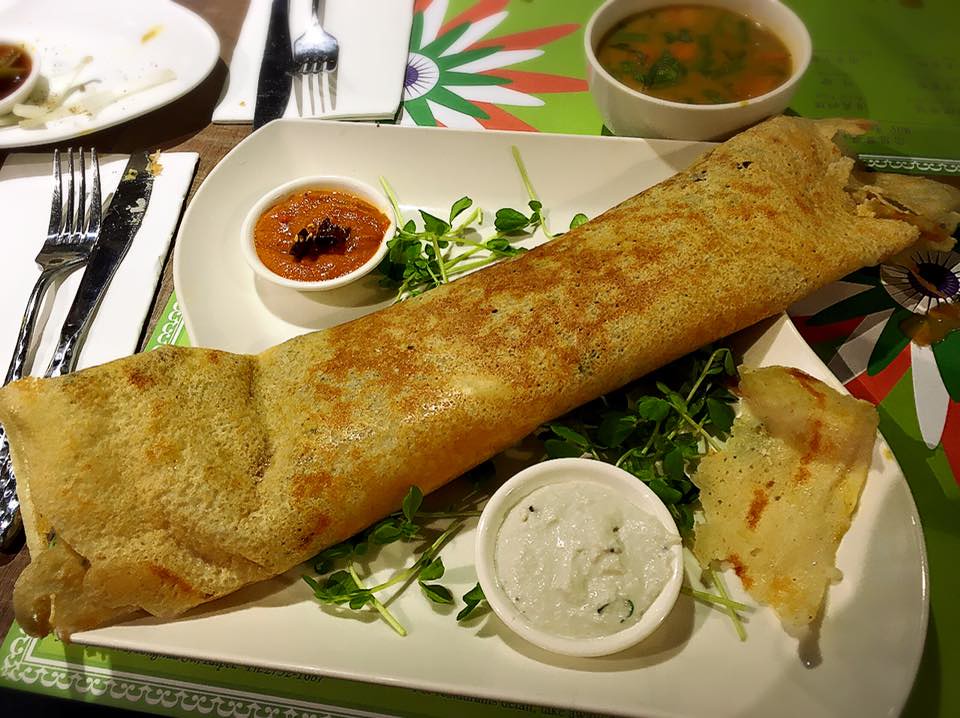
Masala dosa at MIK 4ever, #34 Lane 171 Tonghua Street, one of the only restaurants serving south Indian in Taipei
- Mayur Indian's fourth location including masala dosa and vadai
- The ongoing garlic naan scandal at Out of India (I think this scandal might be my own fabrication, but good garlic naan is a big deal to me)
- Updated recommendations for Fusion Asia (try the Lamb Rahra)
- Updated short review of Khana Khazana (it's pretty good but typically north Indian, no idli-dosa here)
...enjoy!

Masala dosa at MIK 4ever, #34 Lane 171 Tonghua Street, one of the only restaurants serving south Indian in Taipei
Wednesday, December 30, 2015
Chasing the Wind Lions
...such a sappy title but I couldn't help myself!
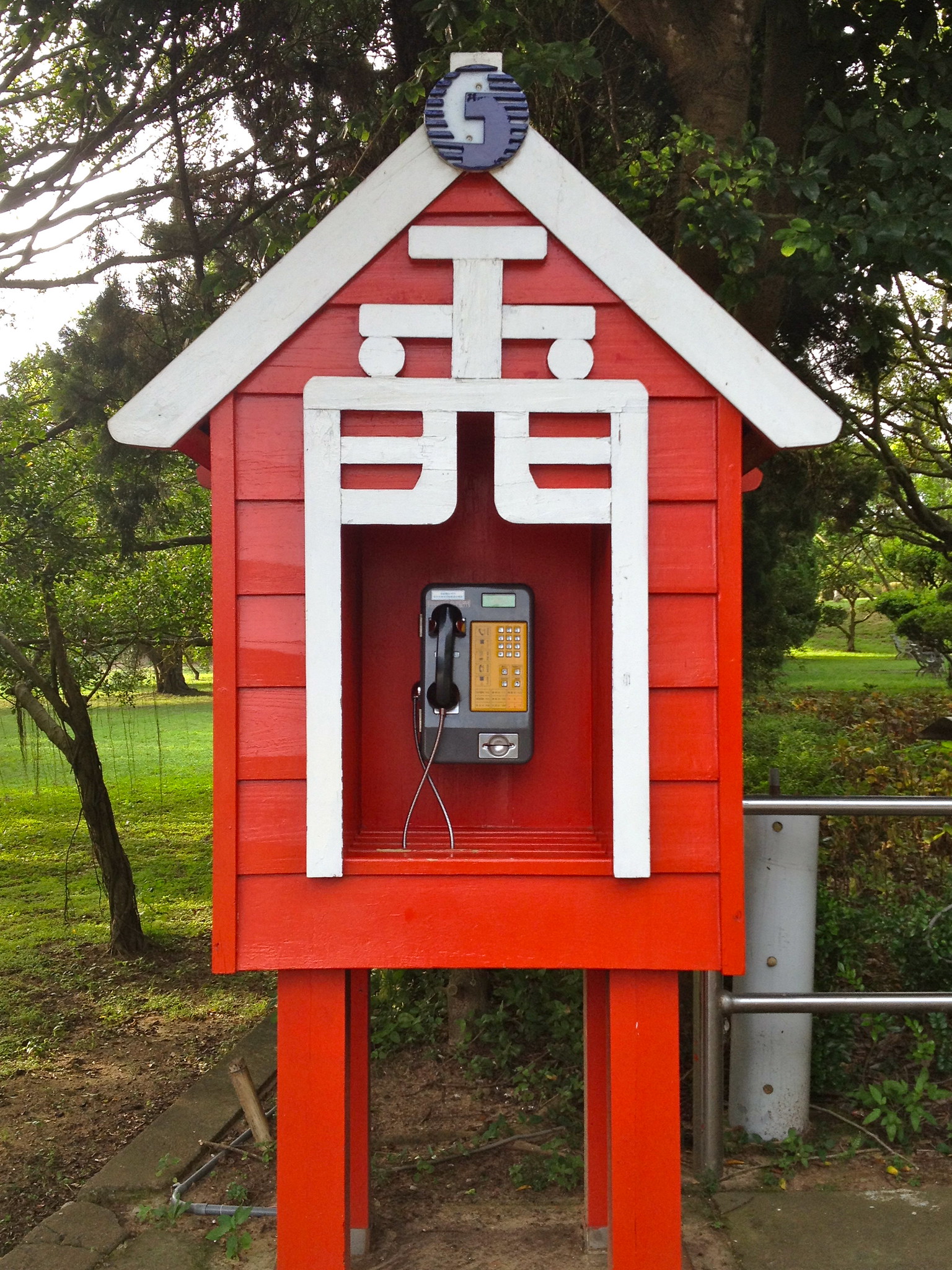
Anyway, as I've mentioned several times but haven't yet posted, over the summer Brendan and I went to Jinmen (Kinmen, Quemoy, whatever) just before I left for yet another trip to the US for yet another family issue (this one less serious). I decided I'd better post about it before I forget all of the particulars!
Two notable things about flying to Jinmen from Taipei: the first is that you pass right over Penghu, so you get a bird's eye few of Magong Island. It's quite something, and is a good reminder of how small Magong really is. Secondly, I didn't think anything of it when I took a few photos of the Central Mountain Range of Taiwan from the airplane as we flew down the coast - only to find it's actually illegal, at least according to Taiwanese law, to take photos of Taiwan from airplanes! Obviously it's a national defense thing, I just hadn't heard of such a law before.
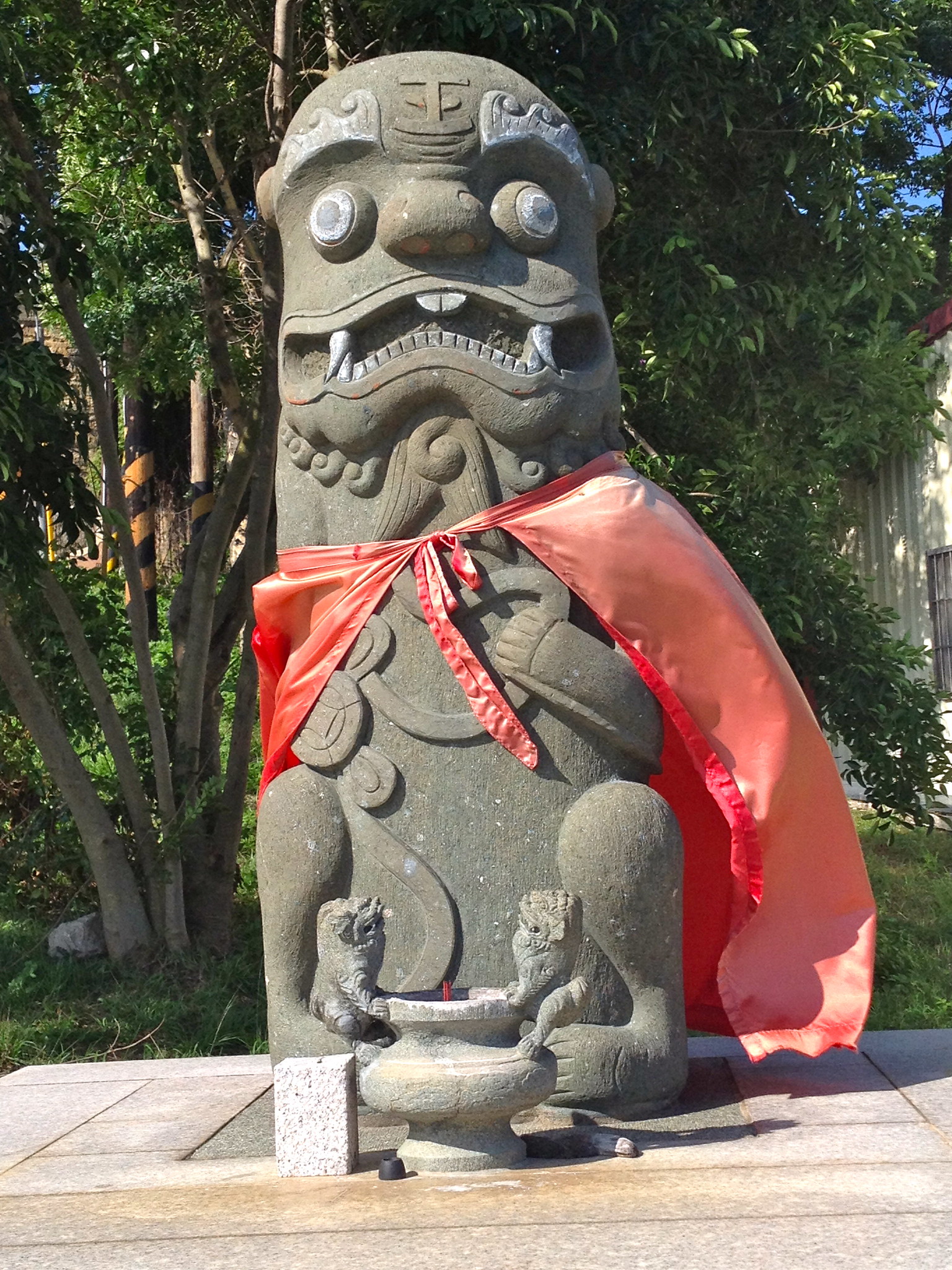
We stayed at ㄚ樂的家, a small "foreign style house" (洋樓) a short drive from Jincheng city - you definitely need to rent a car on Jinmen, though buses do exist - to stay here a car is crucial as it's down several country roads at a tiny hamlet on the waterfront. Worth it!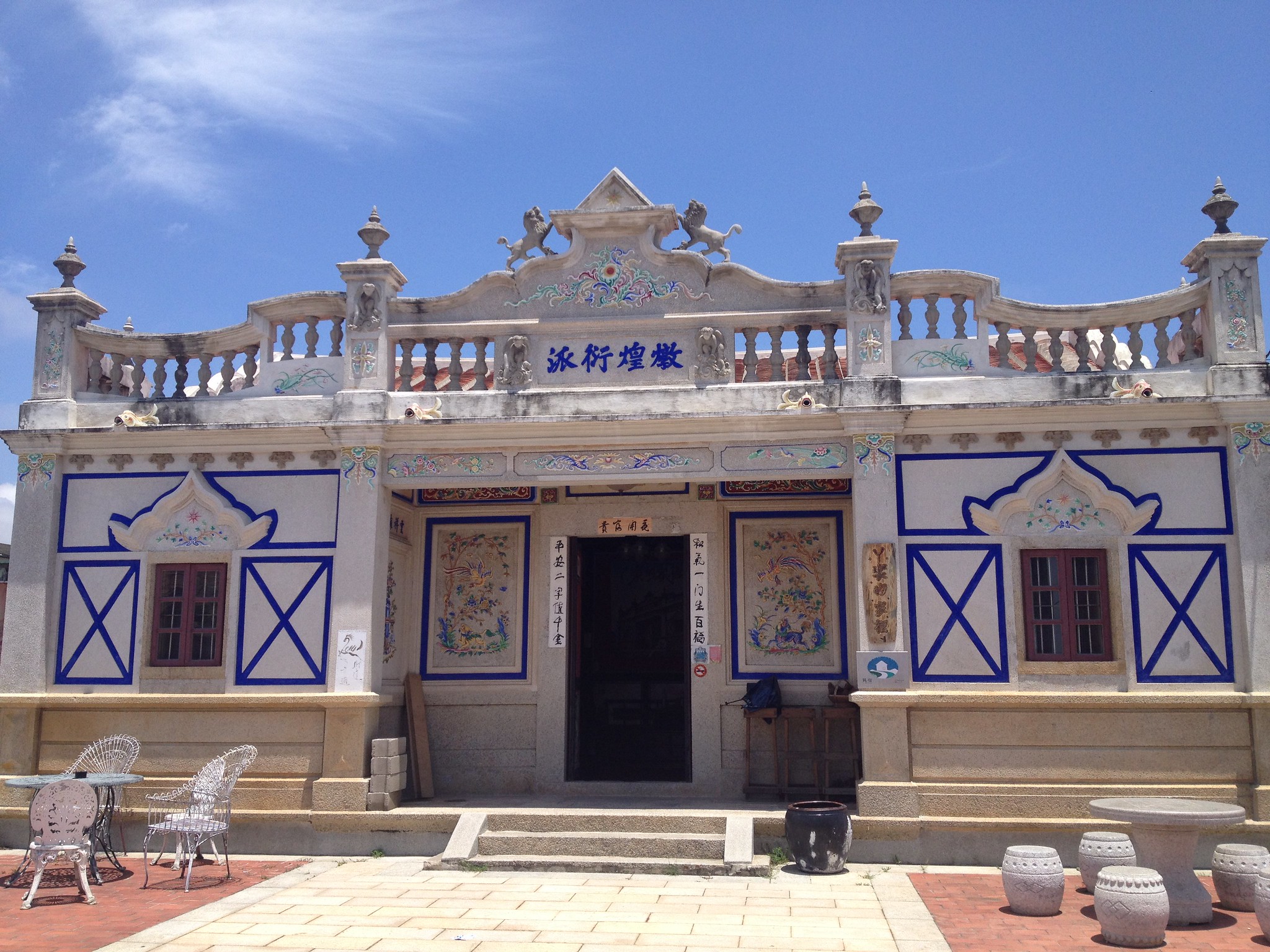
The inside is also preserved in a traditional look, and there is a kitchen and dining area for your use (breakfast is provided - generous portions and very local-style).
A couple of things struck me about Jinmen - not just the sheer number of old houses and traditional architecture, but also the number of abandoned buildings, most of them old, some of them not. Some of these were foreign-style houses, others were more traditionally Chinese buildings, still others seemed to be from the 20th century.
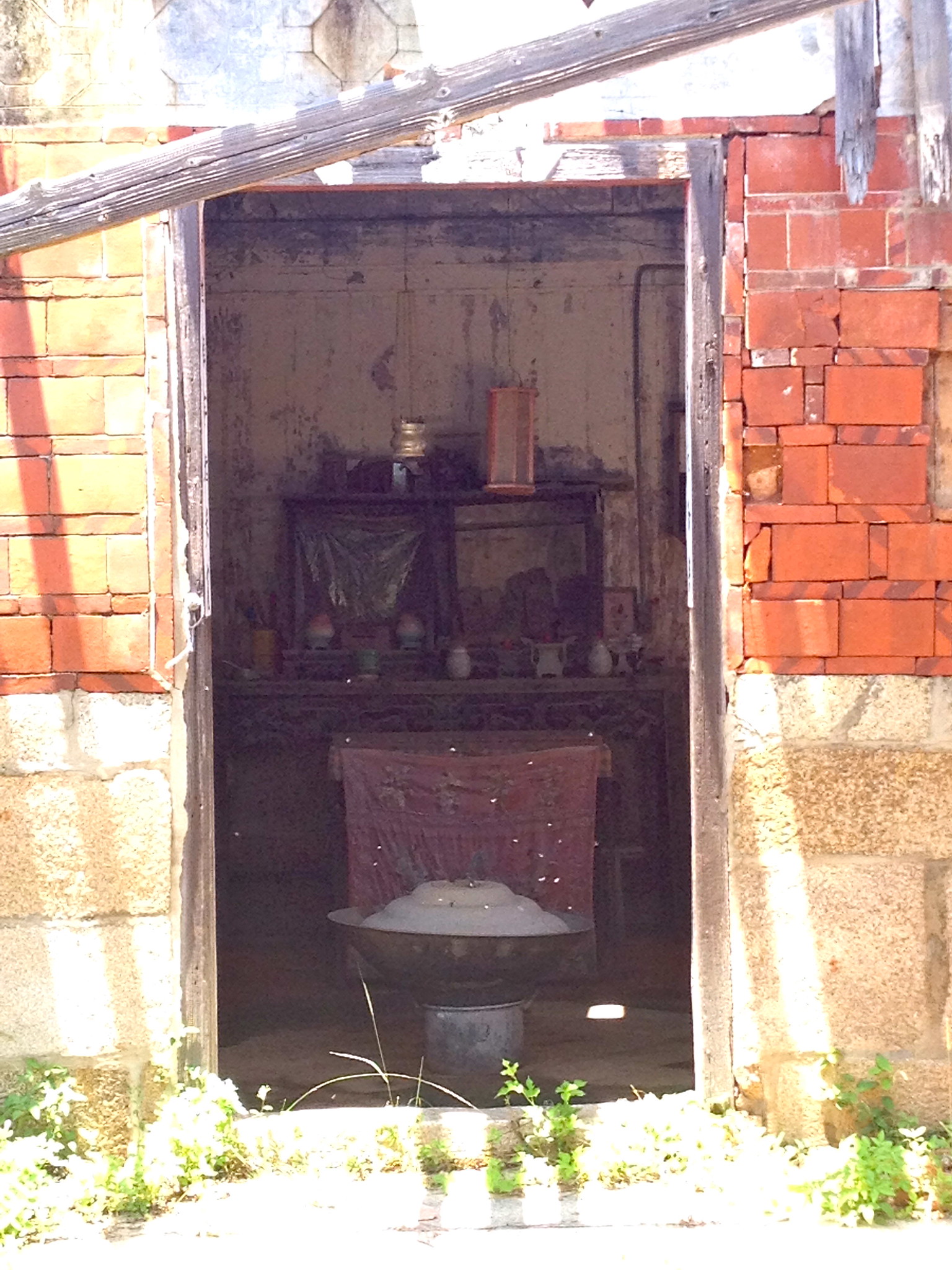
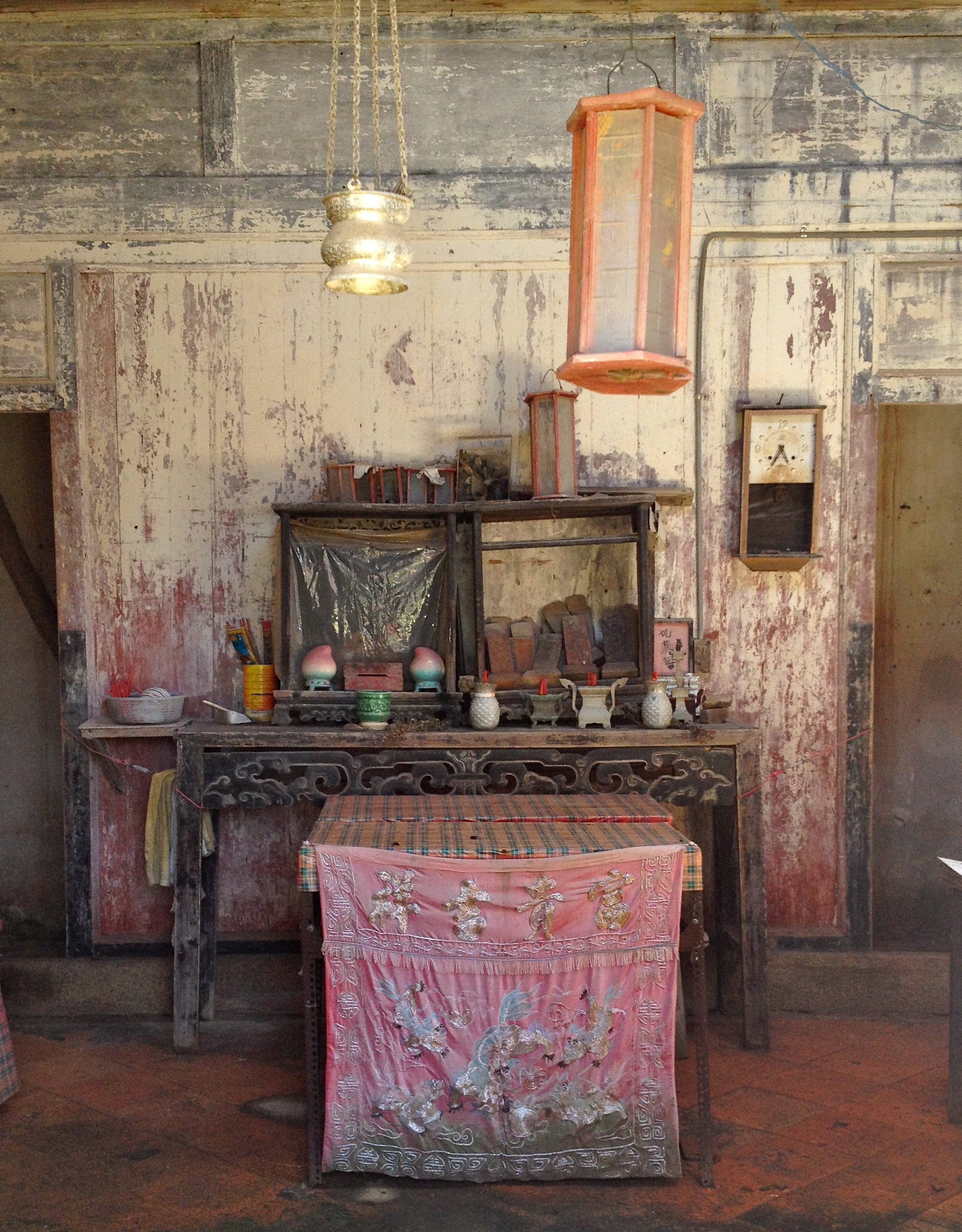
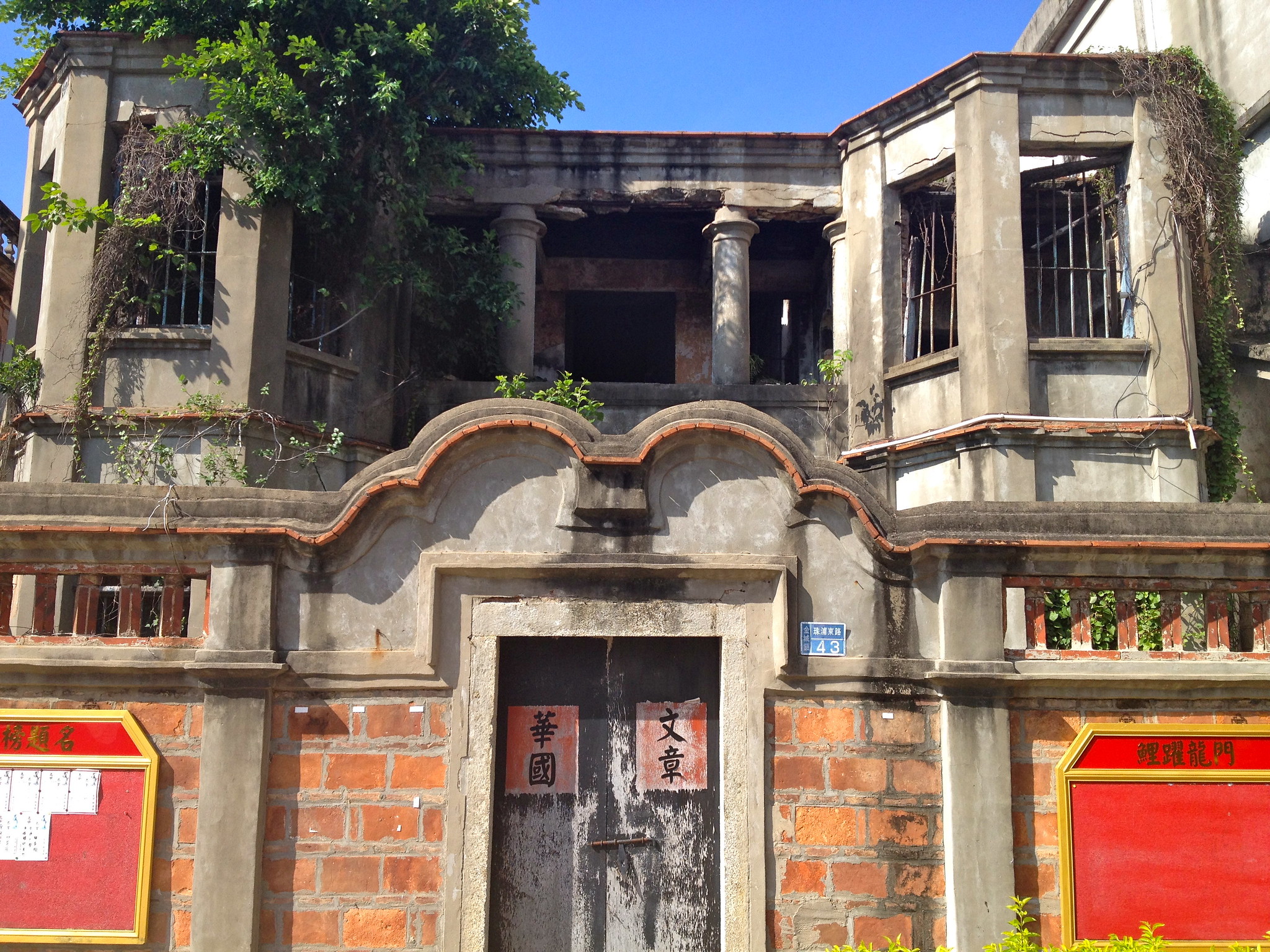

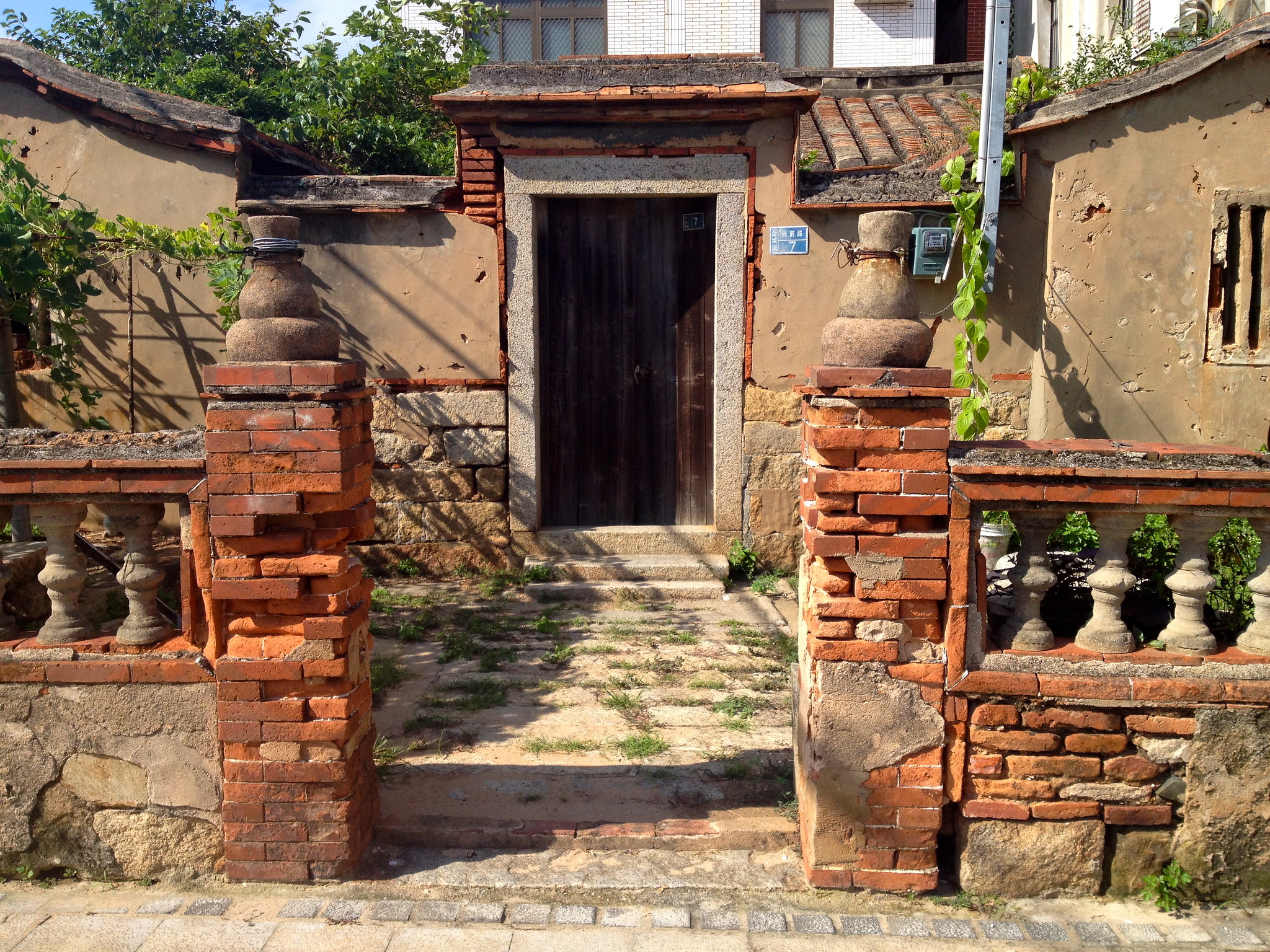
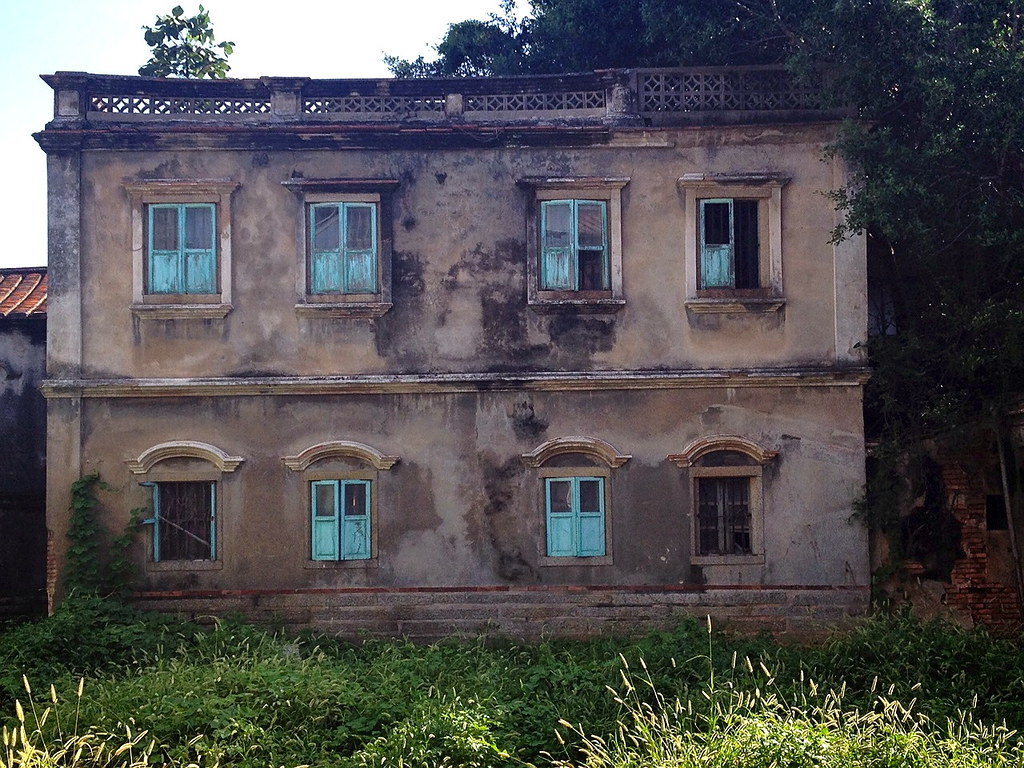
Second, how many buildings still in use retained their traditional flavor:
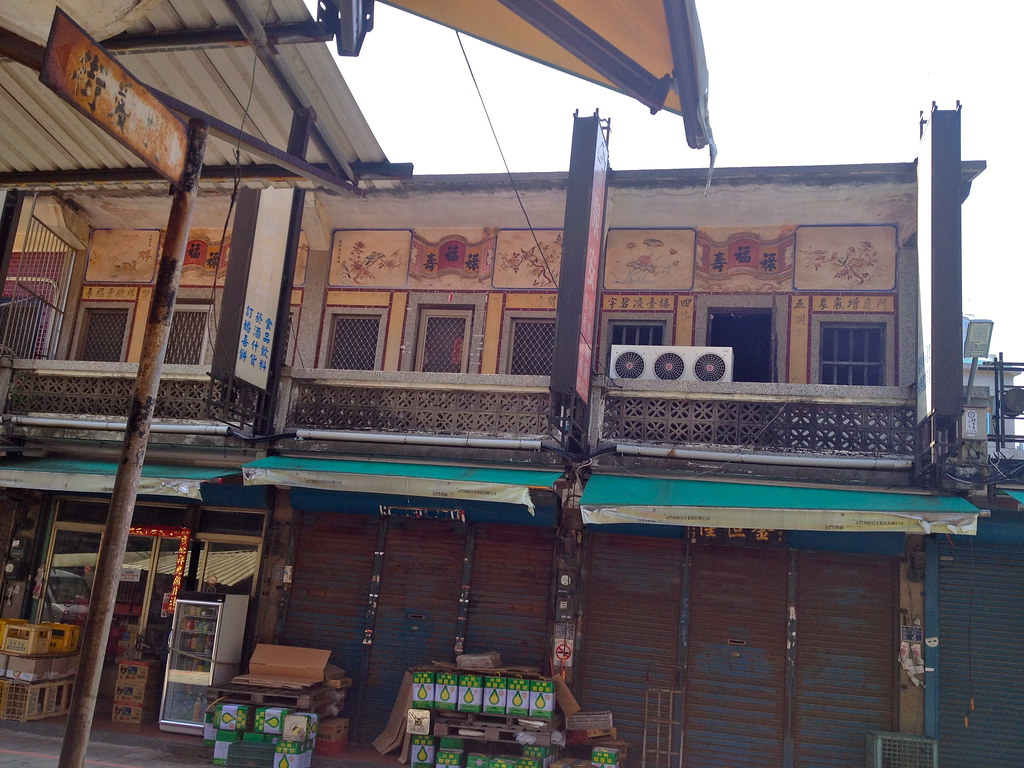
Third, the extent to which a lot of iconography - old, but also at times new - conflates the KMT with the Republic of China, in a way you just don't often see in Taiwan proper these days (I'm not sure I've ever seen it).
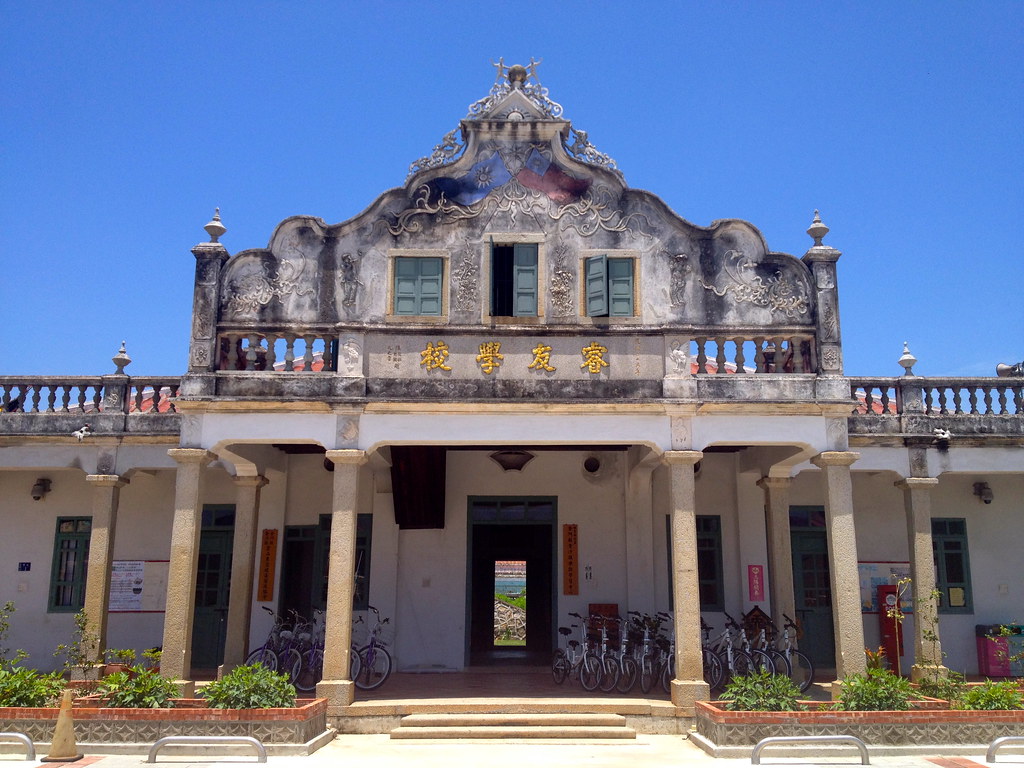
Rui You School (not functional as far as I know) on the eastern side of the island
Check out the top of that building's arch - it's hard to see in the photo, but it's a KMT flag crossed with an ROC flag. Not something I can recall seeing in on the Taiwan mainland, although I am sure it must have at one time been quite common.
On our first day in Jinmen, we took a nap (our flight left at some crazy early time) before driving first into Jincheng city and then over to Shuitou as the sun set. I won't bore you with too many details, as Jinmen is a well-documented destination, and I primarily want to show off photos! We walked down Mofan Street, passed the maternal chastity arch, and checked out the Qing dynasty military headquarters before heading a bit downwind to the Kui pavilion - interesting in its own right but we had more fun wandering the narrow alleys and warrens between mostly abandoned buildings, which were alive with lots of scurrying cats - some well-fed, others not so much.
One quick thing worth noting before we get into photos - the Qing military headquarters' side rooms are used for storage for much of the year, leading to peeks in windows that reveal scenes such as this:

AAAAAHHHHH!
I was so intrigued by this creepy room of bridal mannequins in retro dresses that I went to some effort to ask about it - not really sure how Qing dynasty military operations and mid-century Western brides were related. Turns out they're not, this room is just given over to a local business for storage.

Ruined buildings around Kui pavilion
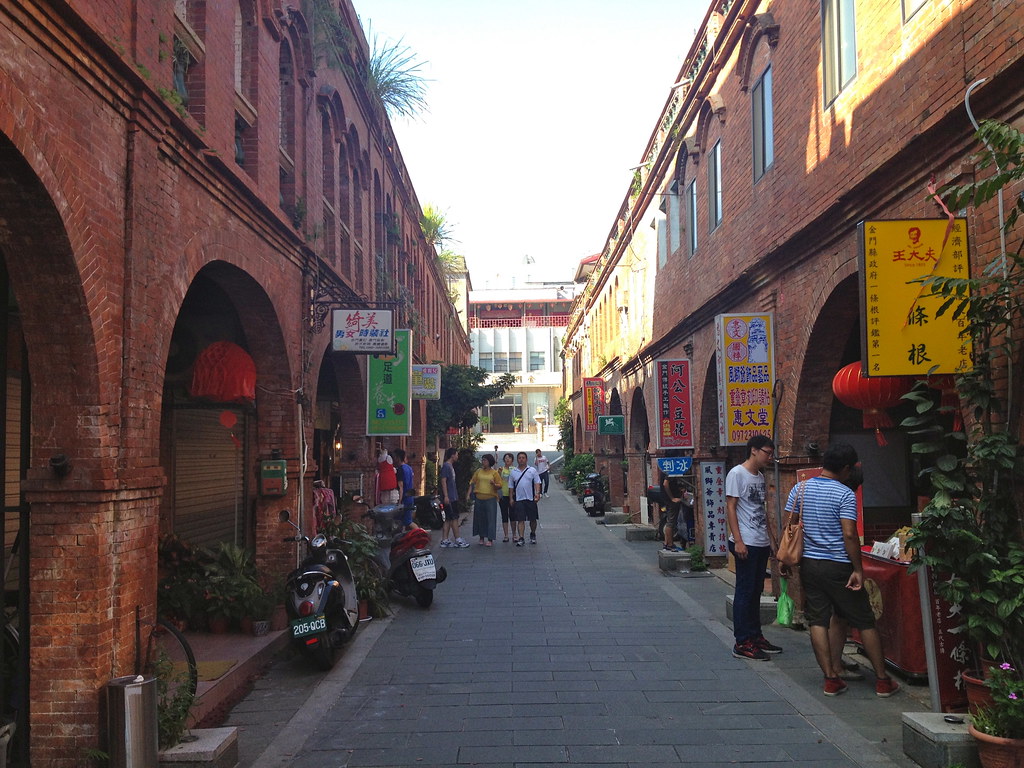
Mofan street - nice to walk down but not a lot going on
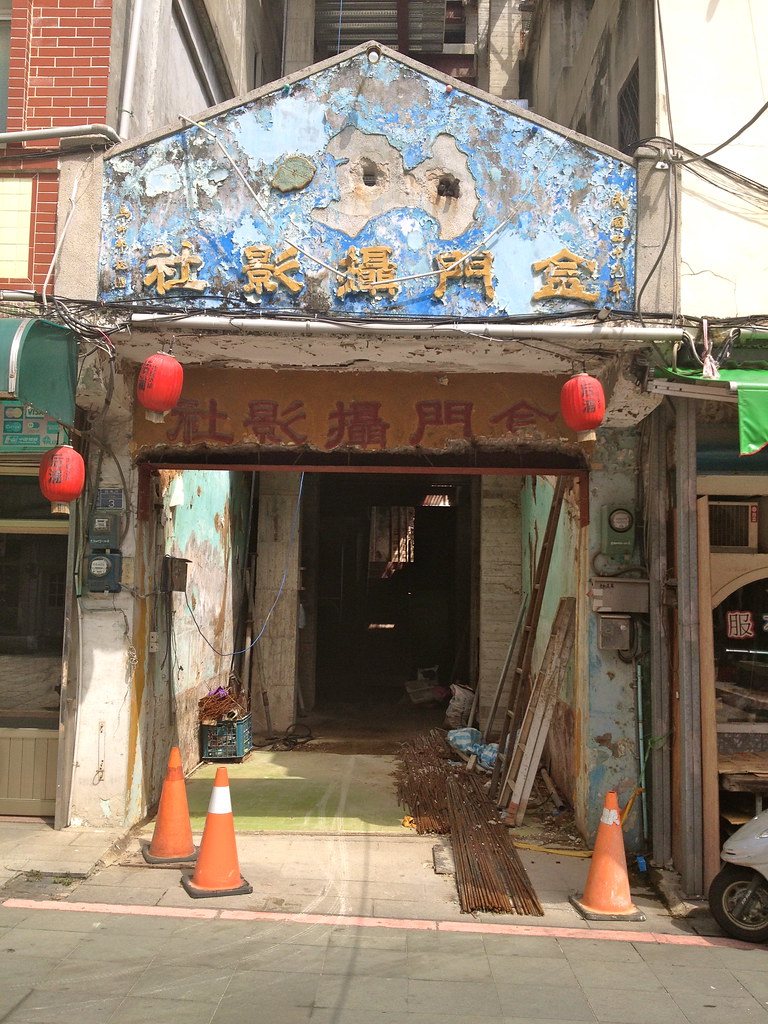
Another interesting old building near the Qing military headquarters
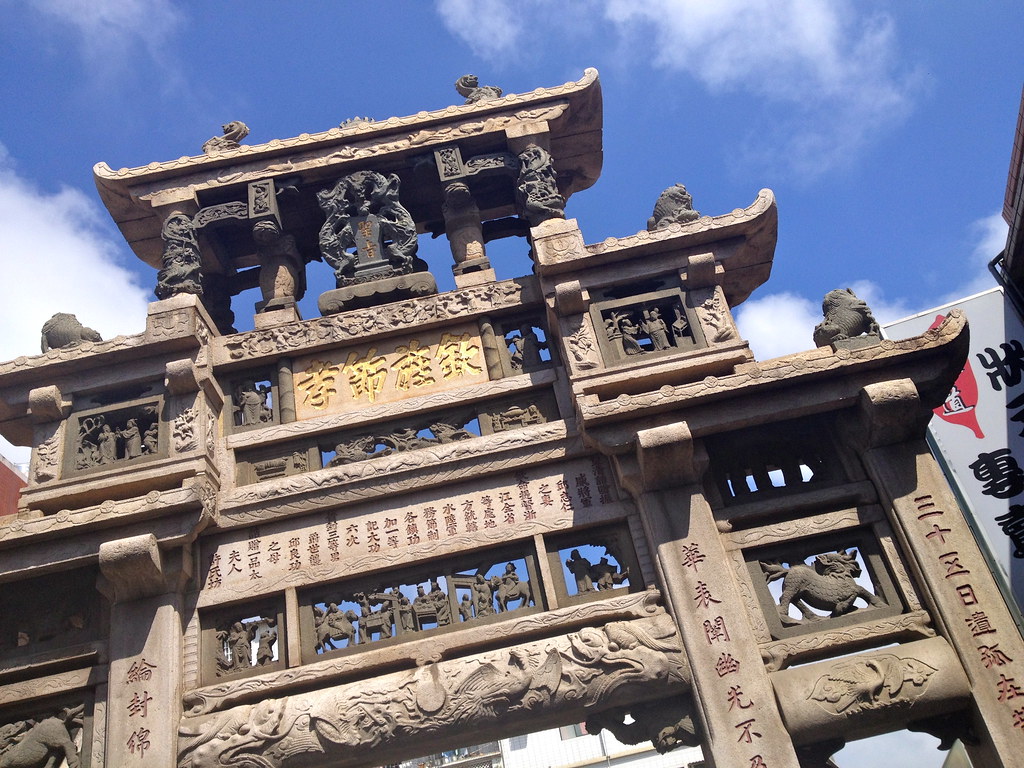
The largest surviving memorial arch in Taiwan (Qiu Liang-gong's maternal chastity arch)
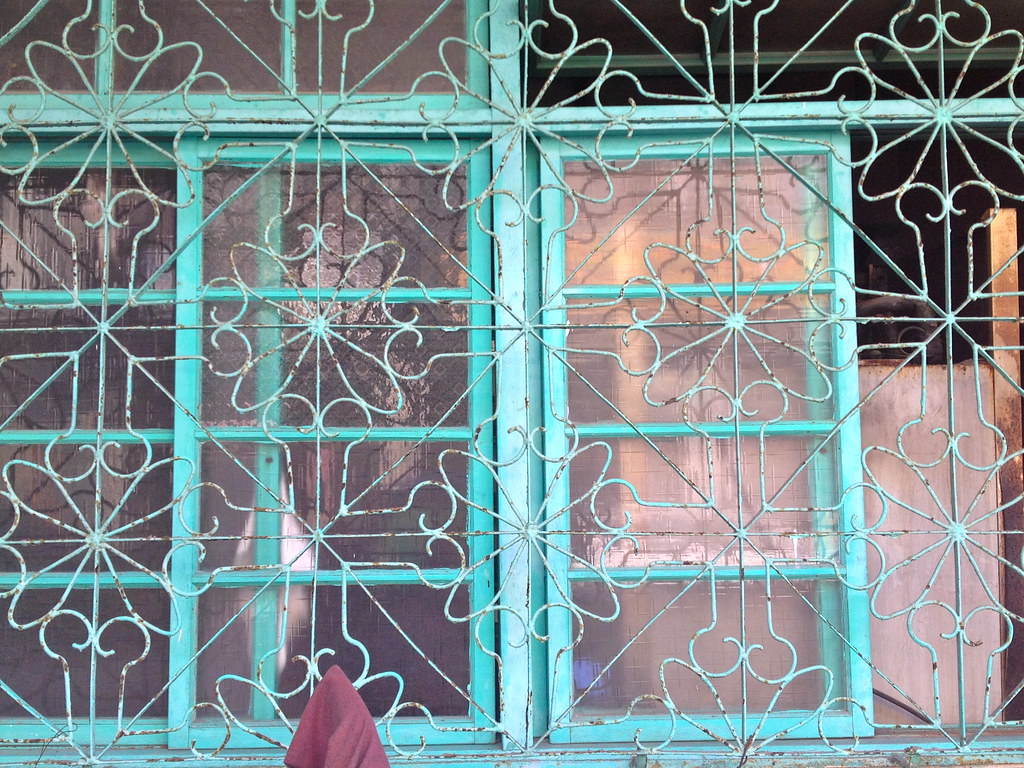
Just a pretty window casement
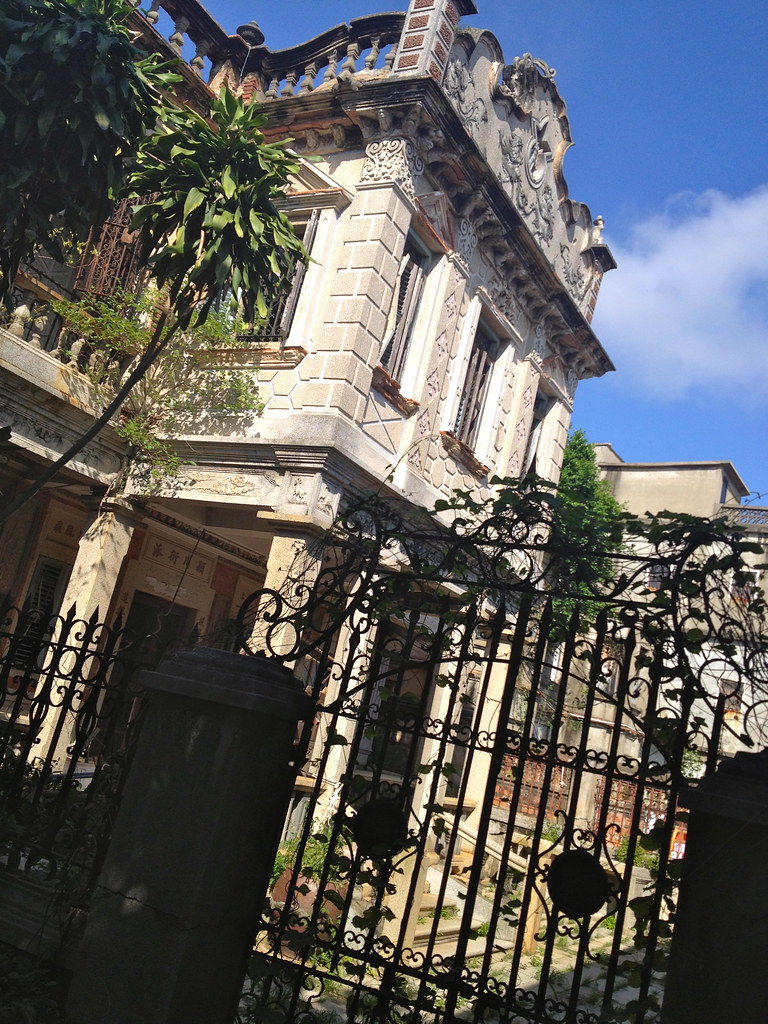
Creepy, cool Frankensteiny abandoned "Western style house" near Kui pavilion
By the way, the Rough Guide recommended oyster thin noodle place near the arch, and the scallion-oyster bun place just under it? Both excellent. Worth it, even though they're in a guidebook. On Minzu Road just near the turn-off to the memorial arch are a few shaved ice places. The one we went to was also excellent, and I have it on good authority the others are too.
For those who need a place to relax, get some air conditioned cooling-off time or just have a decent cup of coffee, near the end of Mofan Street there are two cafes, and the one we went to was pretty good.
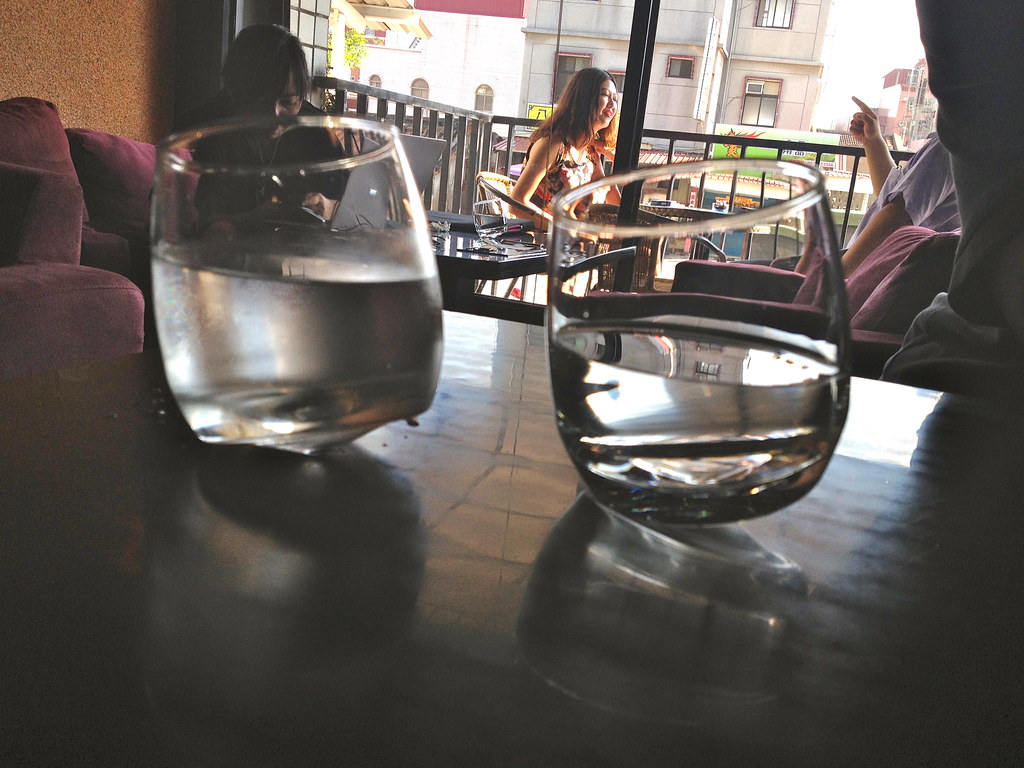
Special water glasses are designed to sit at an angle at this cafe, which also serves coffee grown in Taiwan among other things.
In Shuitou, which is very popular with tourists (and justifiably so), we wandered a bit until it got dark. There is a pretty good restaurant here that serves "Jinmen local food" at a set price per person - no menu, they just bring you a set number of dishes according to the size of your party. It's set in an old foreign-style house (just ask around). The inside looks like this:
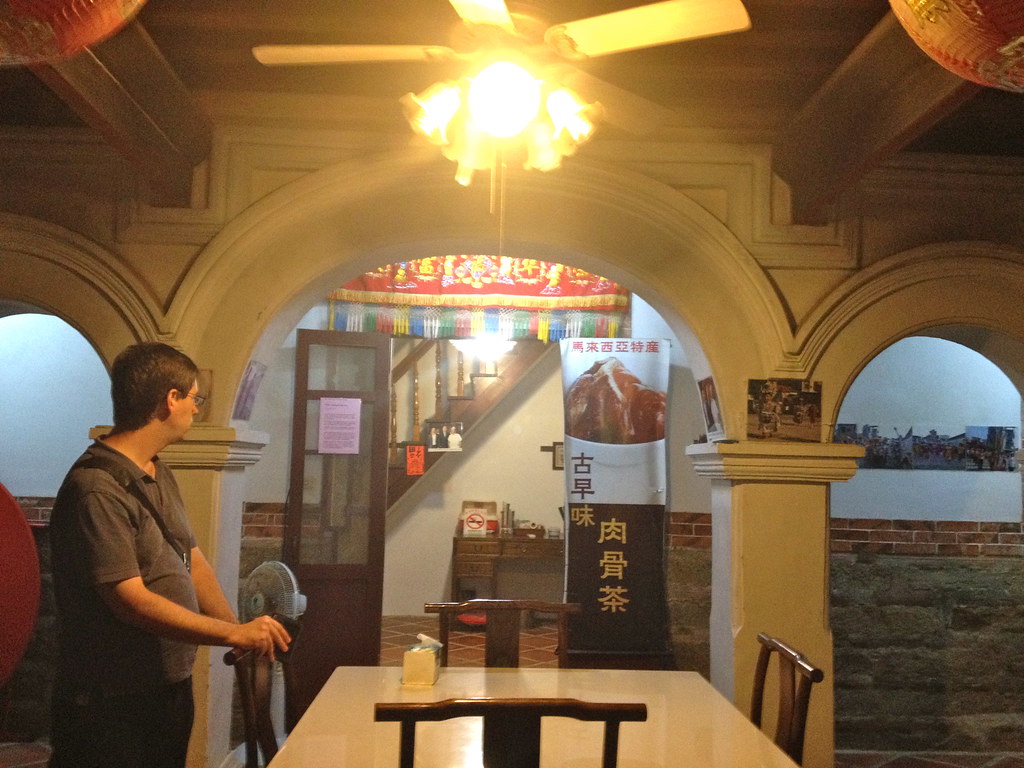
One of the more ostentatious old houses is also a cafe, which is worth a stop (just to get the chance to go in), and is open until 5pm. They don't have food per se, except cafe style snacks like waffles, which are okay but nothing to write home about. Chinese tour groups sometimes come here, which may account for the Mao signs.
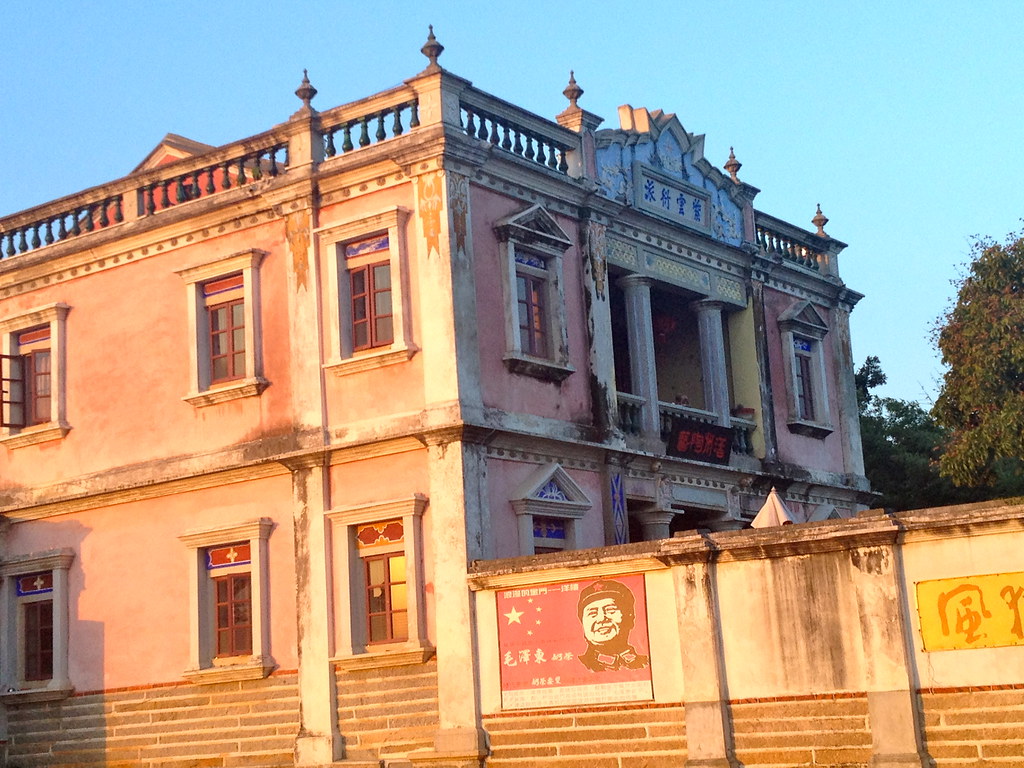
The next day, I realized that I had not seen any wind lion statues at all - and with wind lions being, well, THE famous thing from Jinmen (other than that historic battle, and Kaoliang liquor), so rather than hit sights in the guidebook, we just circled wind lions on a local map (they are all labeled) and took off driving to see how many we could find, with the idea that we'd see interesting stuff along the way. This is where the whole "chasing the wind lions" title comes from - we literally did that, basically for an entire day!
We drove out to the far east of the island, passing through Jinsha, Shamei, Shanwai and Shanhou. Here's the thing about posting in December about a trip you took over the summer, for which the map you'd used, on which you'd circled your various planned destinations, was so tattered by the end of the trip that you threw it out: we stopped in a whole bunch of interesting places not in any guidebook (well, not in our edition of Rough Guide anyhow), but I can't remember exactly where those places are.
I'll do my best - here are some of the wind lions we found, and things we saw along the way. First stop, Huishan Temple (會山寺), just off Huandao E. Road.
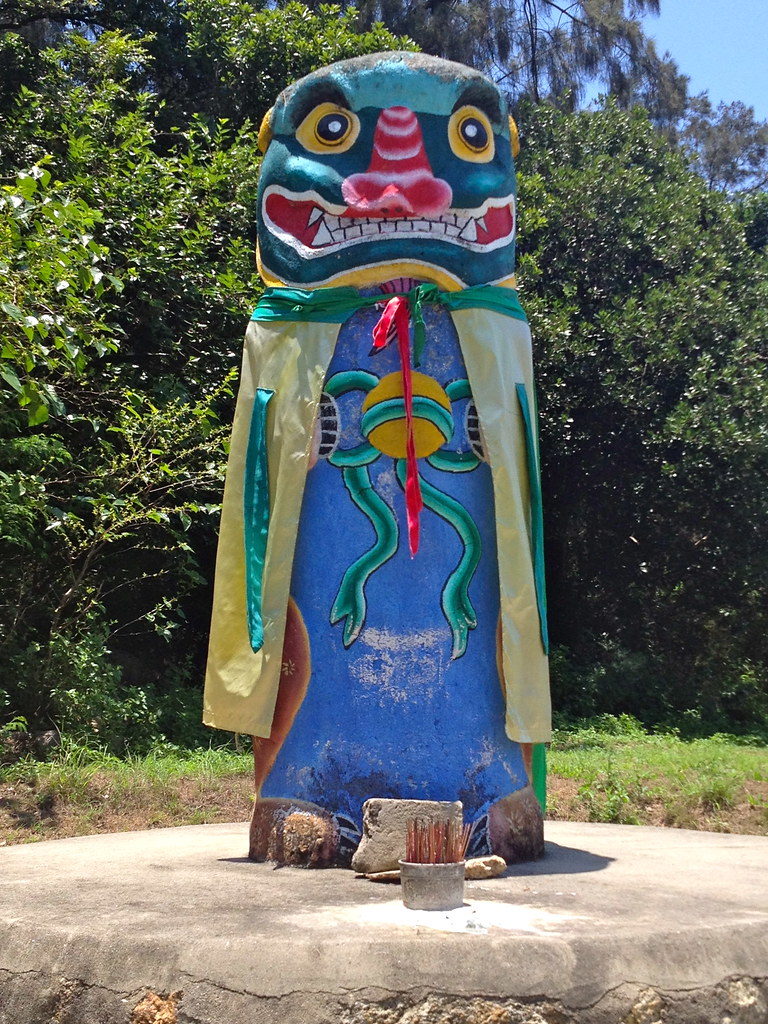
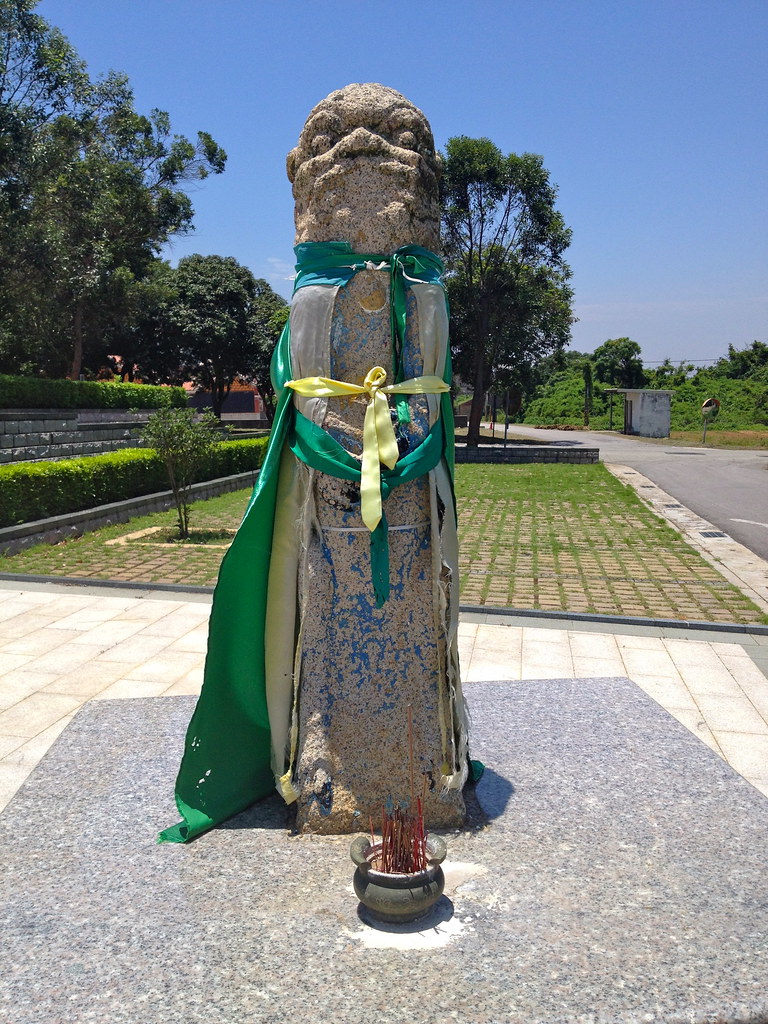
These two lions are a short walk behind (the former) and just out front (the latter) of the temple.
This is not the temple, this is an example of an old house in this area, which is well worth stopping and walking around in despite a few angry dogs, that is still very much in use and beautifully preserved.
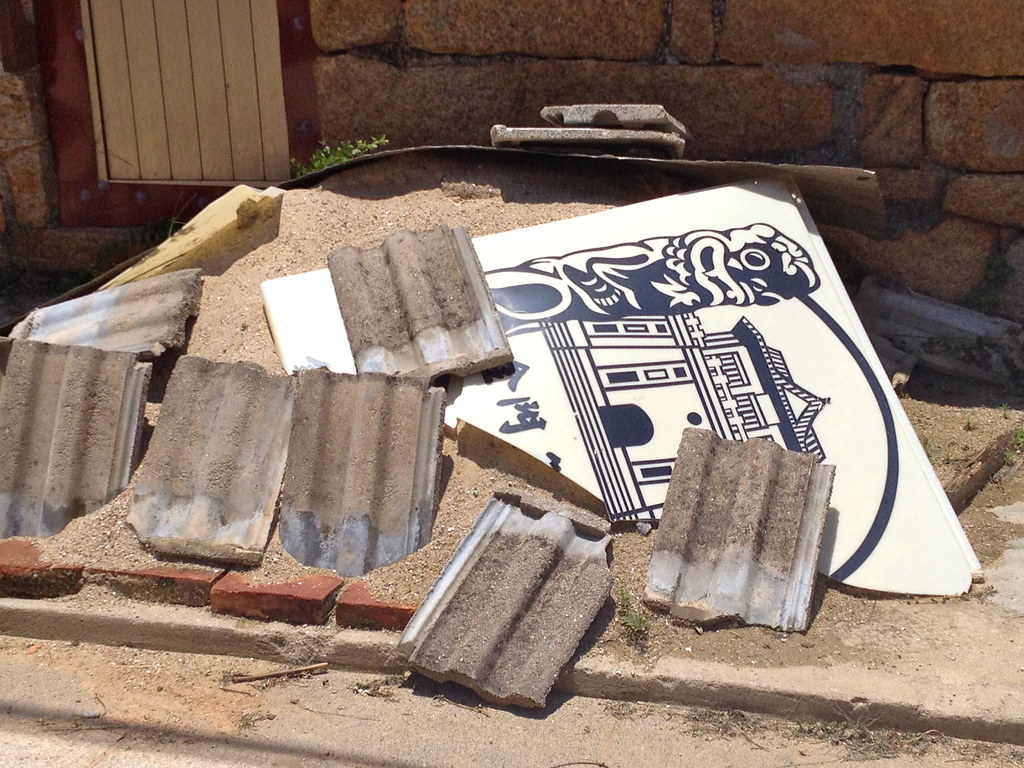
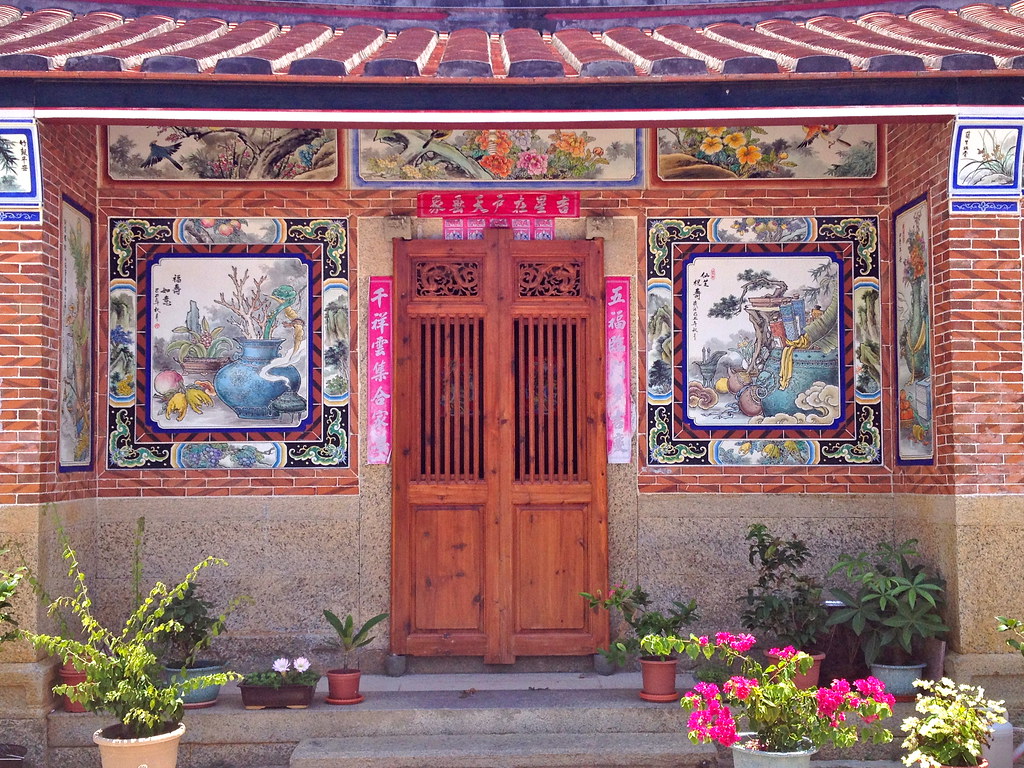
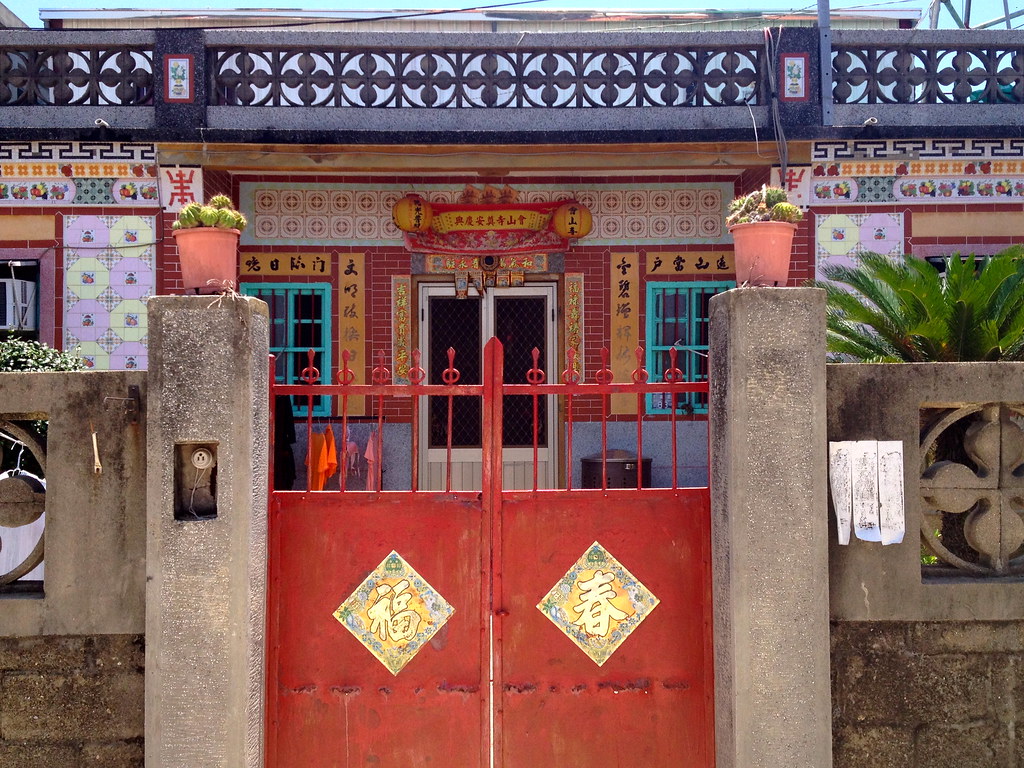

A short drive - also walking distance - from here is a small village, notable (and most easily found) for its old movie theater (closed), which was spruced up and used as the set for the movie Paradise in Service, which I have never seen (but would like to). You can wander in and out of the old shops, which are outfitted with period furniture and even products, at least insofar as they needed to be to function as a movie set. The whole thing is now maintained as a tourist attraction and is genuinely worth a stop, even if none of the old shopfronts are authentic (and I'm not sure they are).
There's a decent cafe here called 心情咖啡 that has good stuff and is a nice place to take a break.
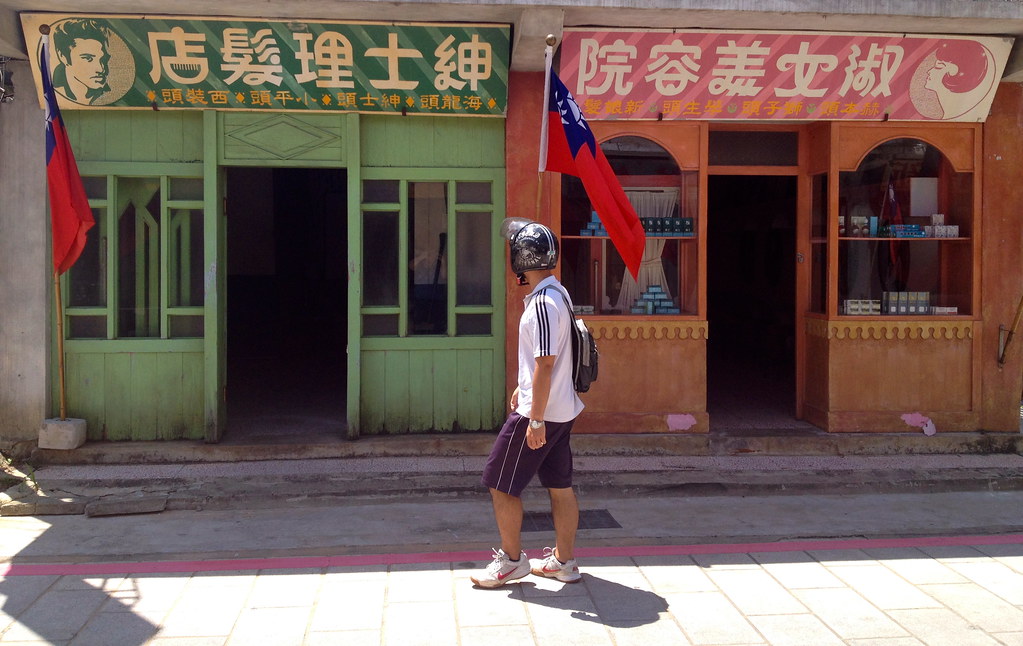
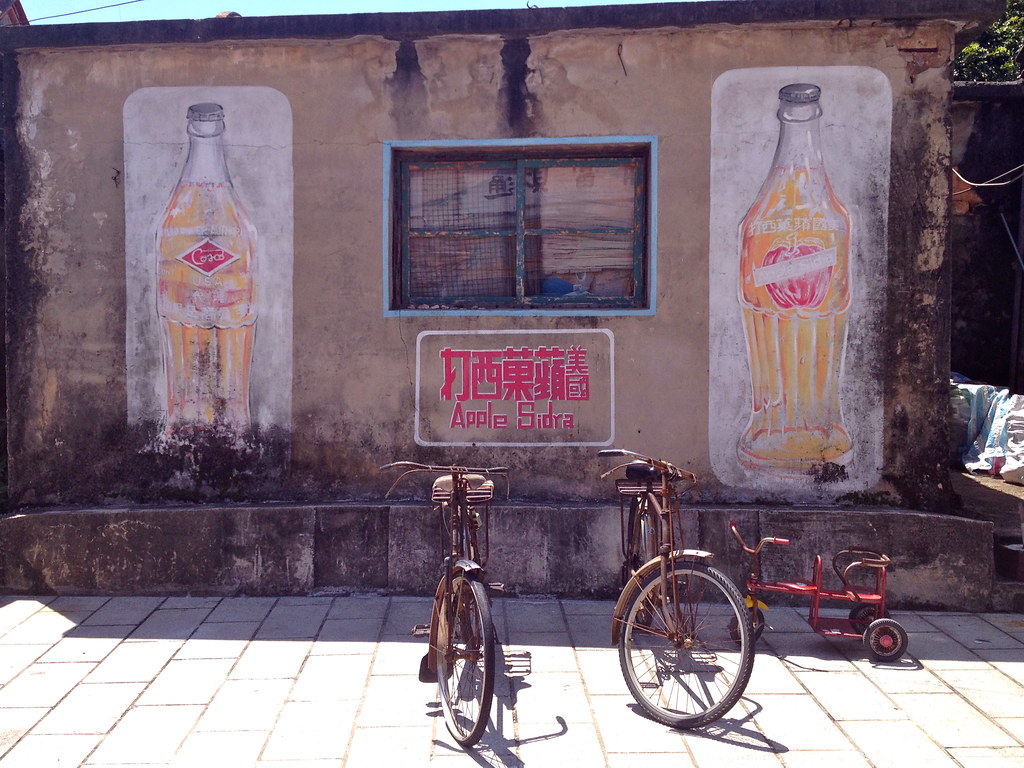
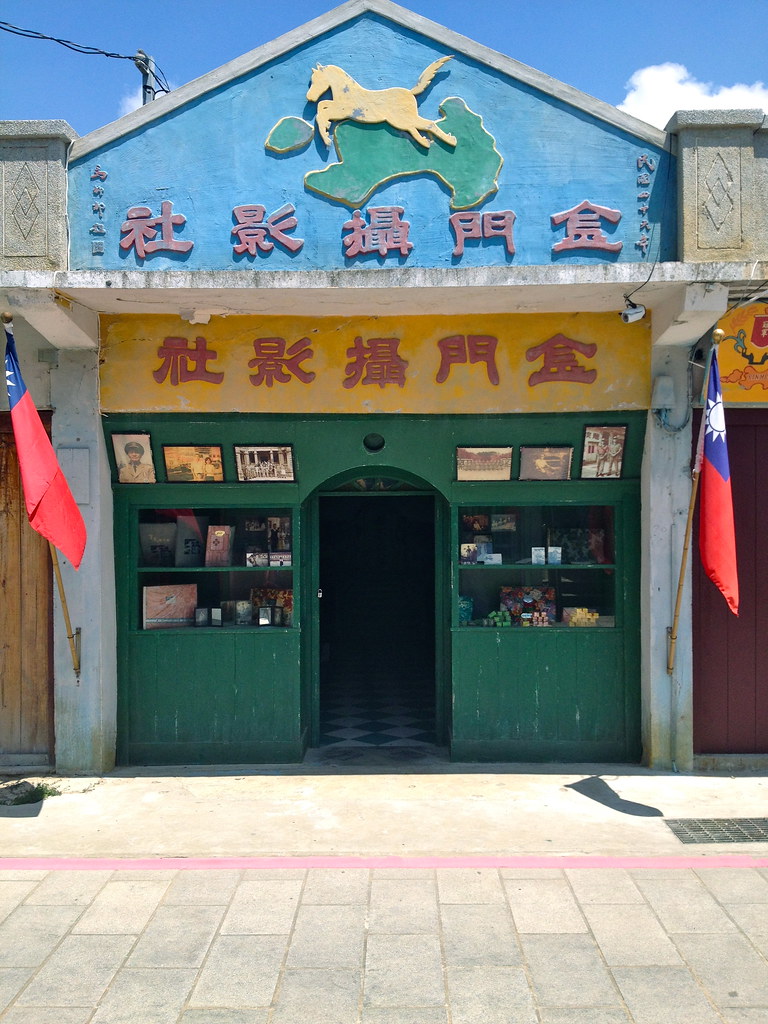
The old movie theater was almost certainly a part of the movie set, and features a few old-style hand-painted movie posters (which are probably too good quality to have just been the background for a movie shoot).
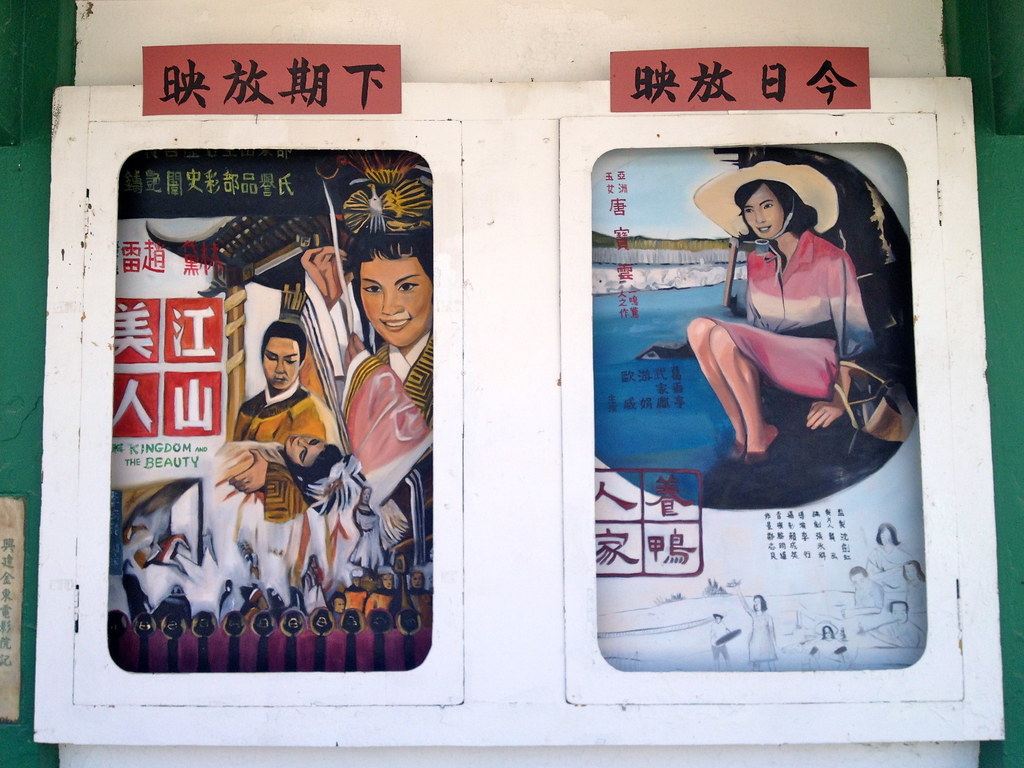
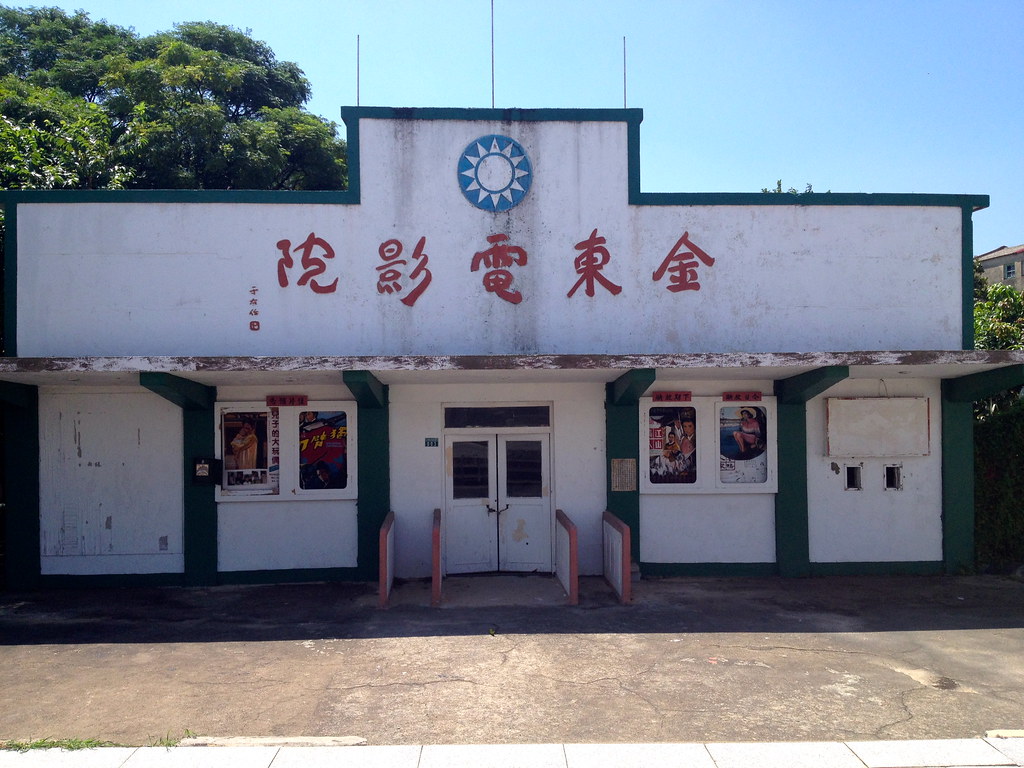
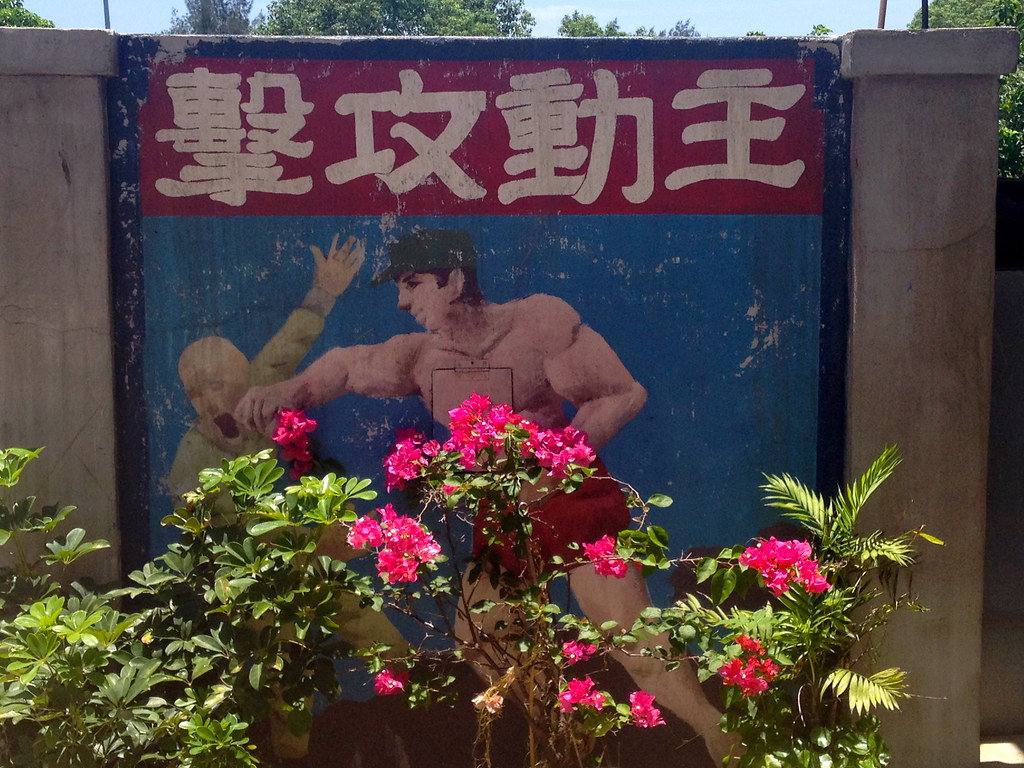
A big, muscled ROC soldier takes out a Voldemort-like Communist
A little further along Yangsha Road, where it meets Dashan Road, you'll come to another set of long-neglected foreign-style houses (at least one has a population of geese in its front yard) and the Rui You school, pictured near the top of this post. There are a few more wind lions around there (I think I've got the correct wind lions matched to their locations:
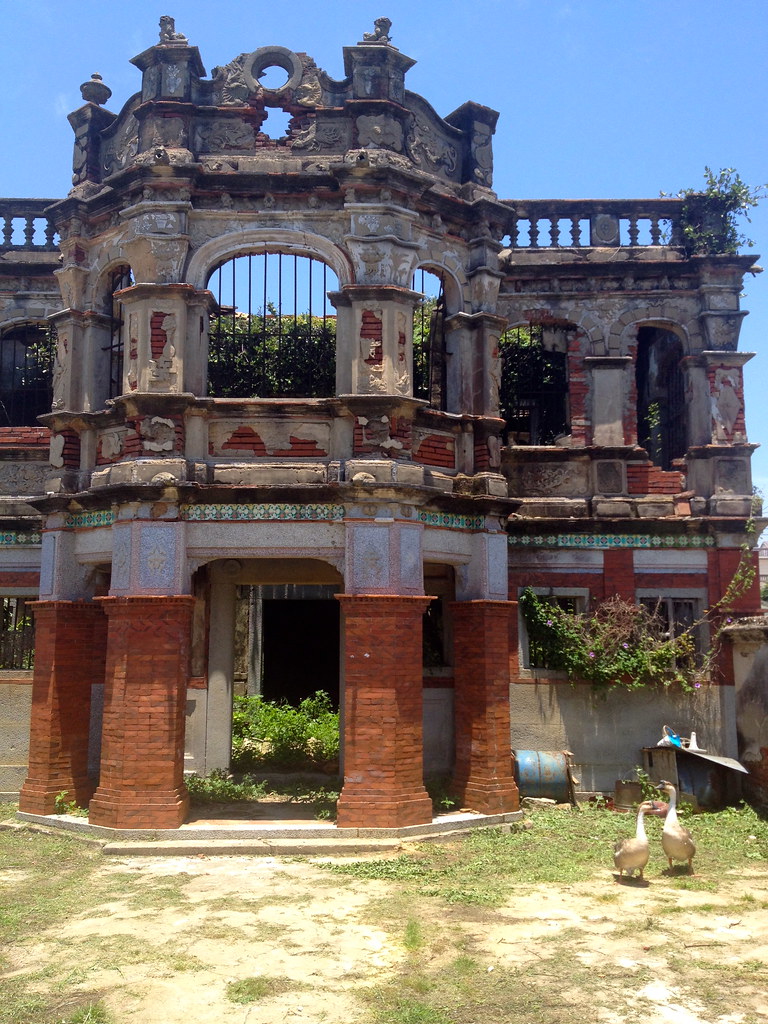
After the "Paradise in Service" movie set, I have to say, I was more intrigued by old-style buildings with old-style signs that are still in use, and not refurbished for a movie.
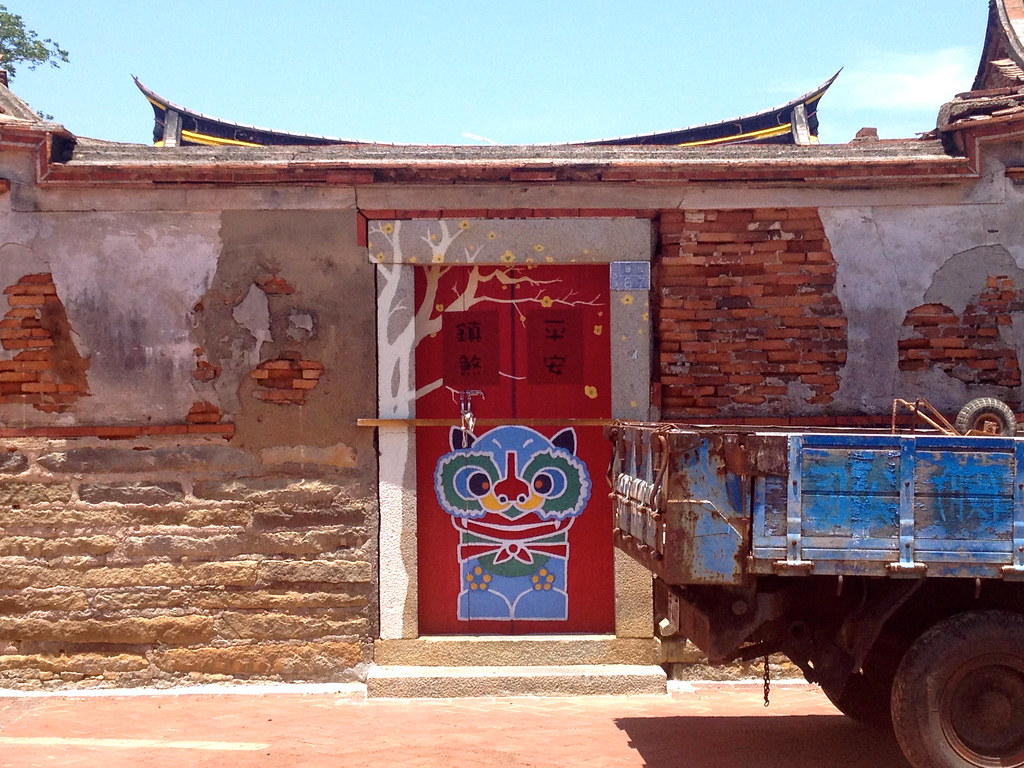
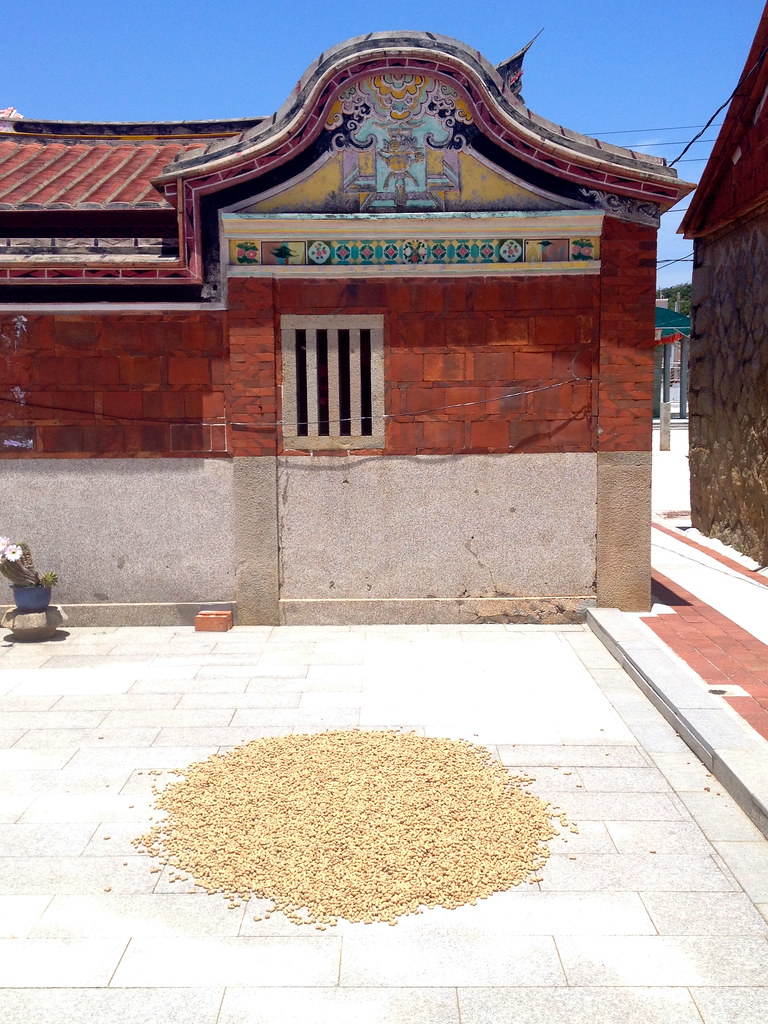
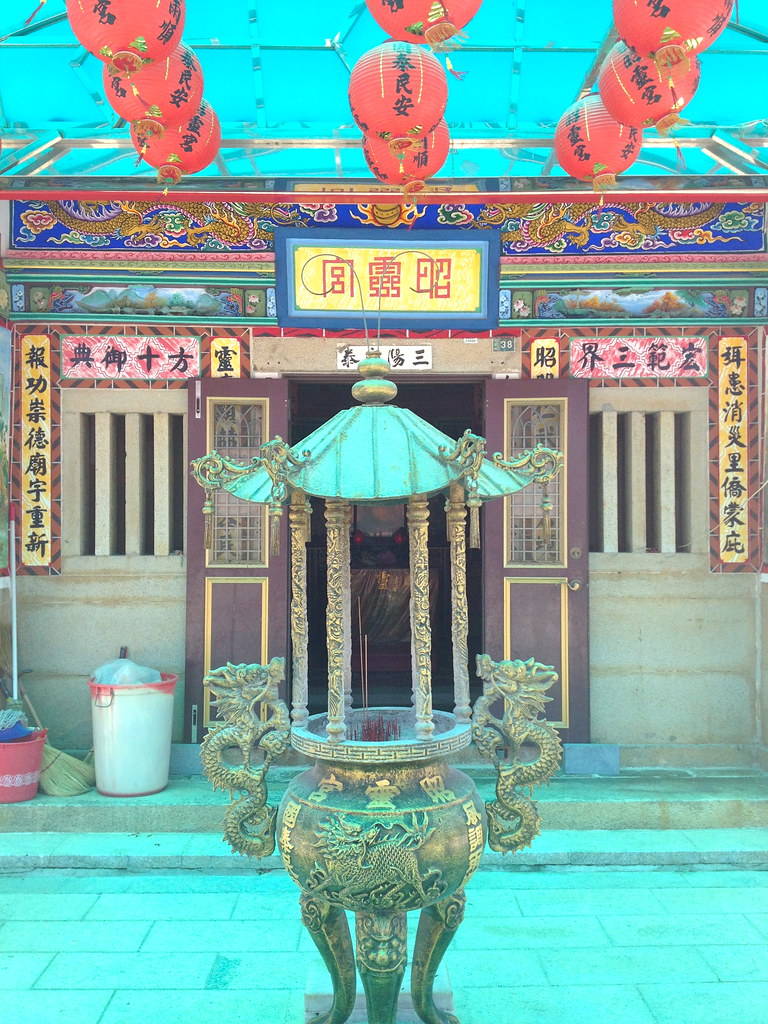

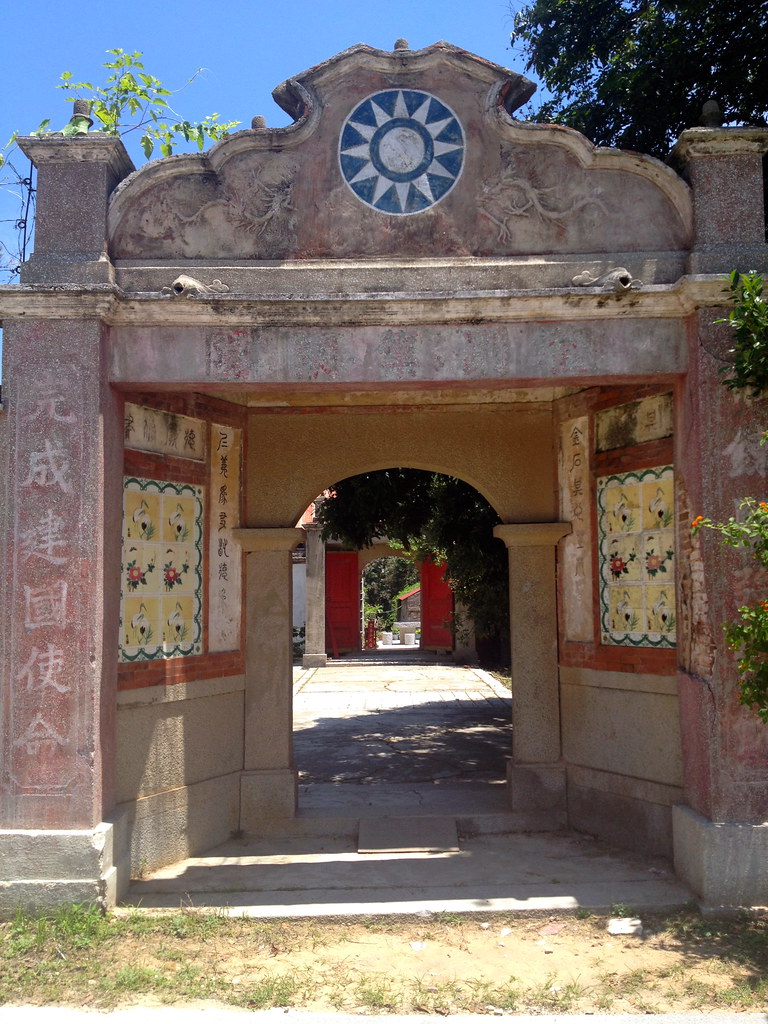
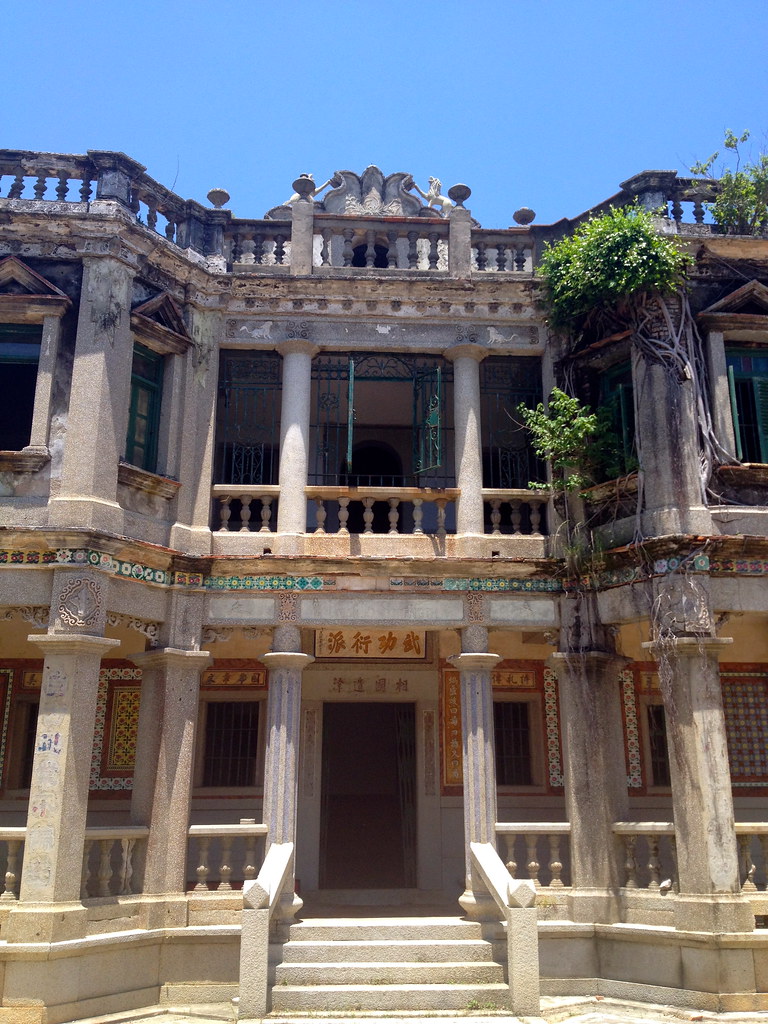

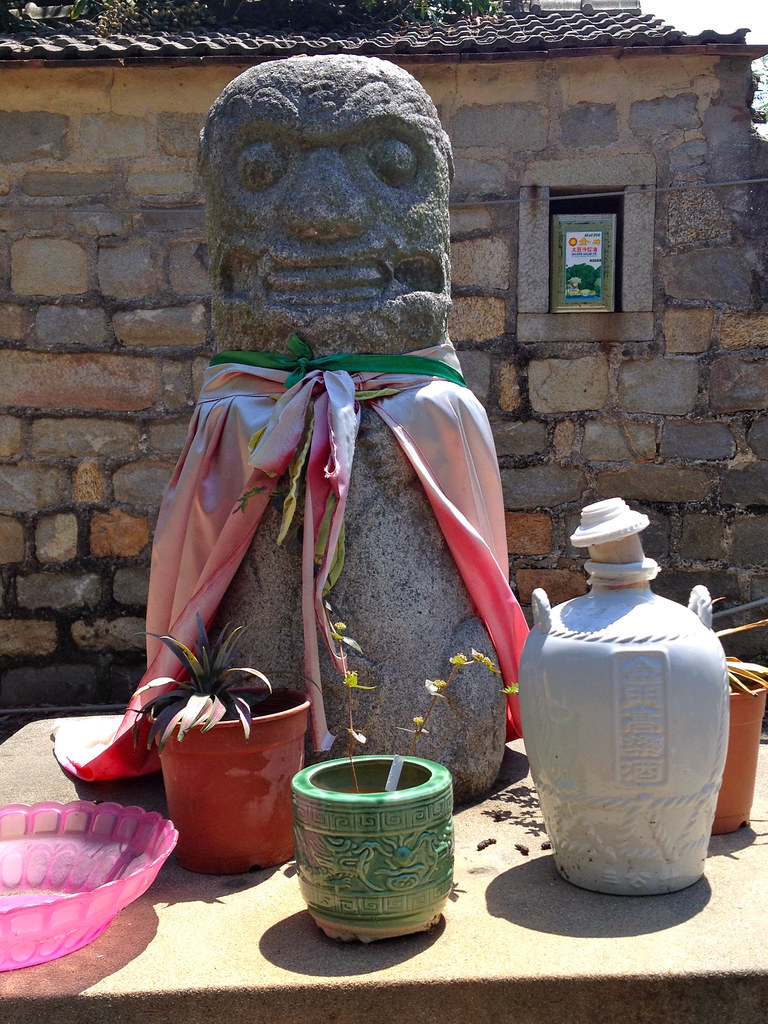
At some point we passed through Shamei and got some of the famous shaobing there (tasty - worth it - check your guidebook) though my favorite part of this section of the drive was stopping to wander some of the quiet backstreets. It is easy to get very hot and very tired in Jinmen, so we took a rest on a stoop in one of the older, more shambling back lanes and chatted with locals while local cats lazed about.
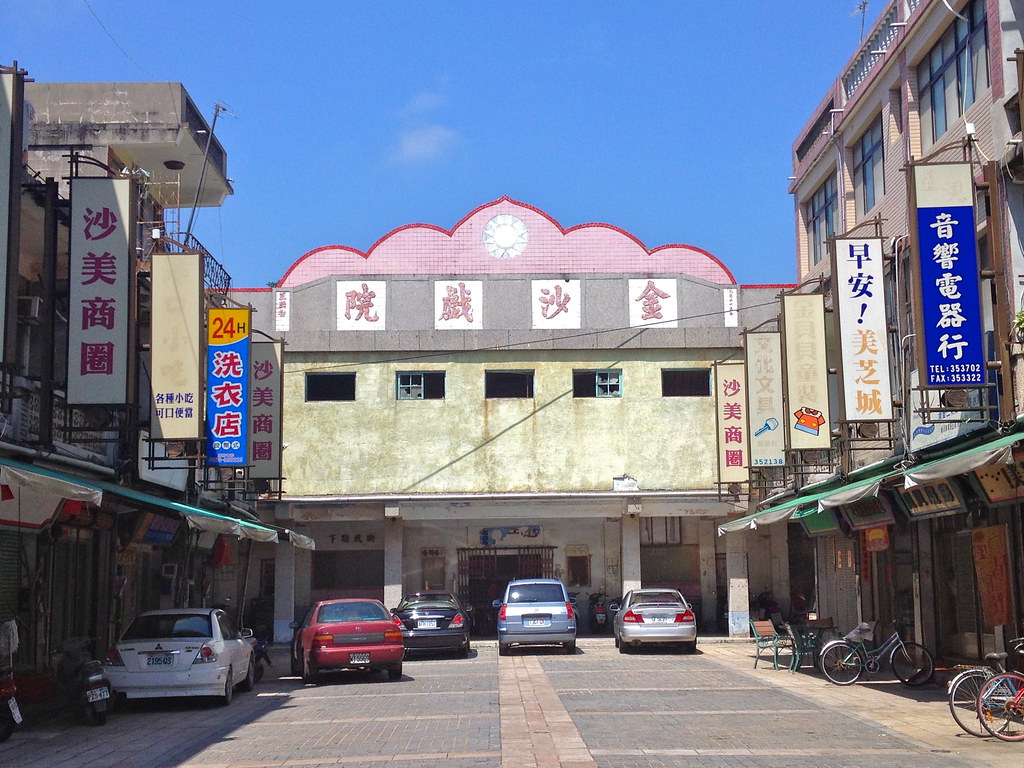
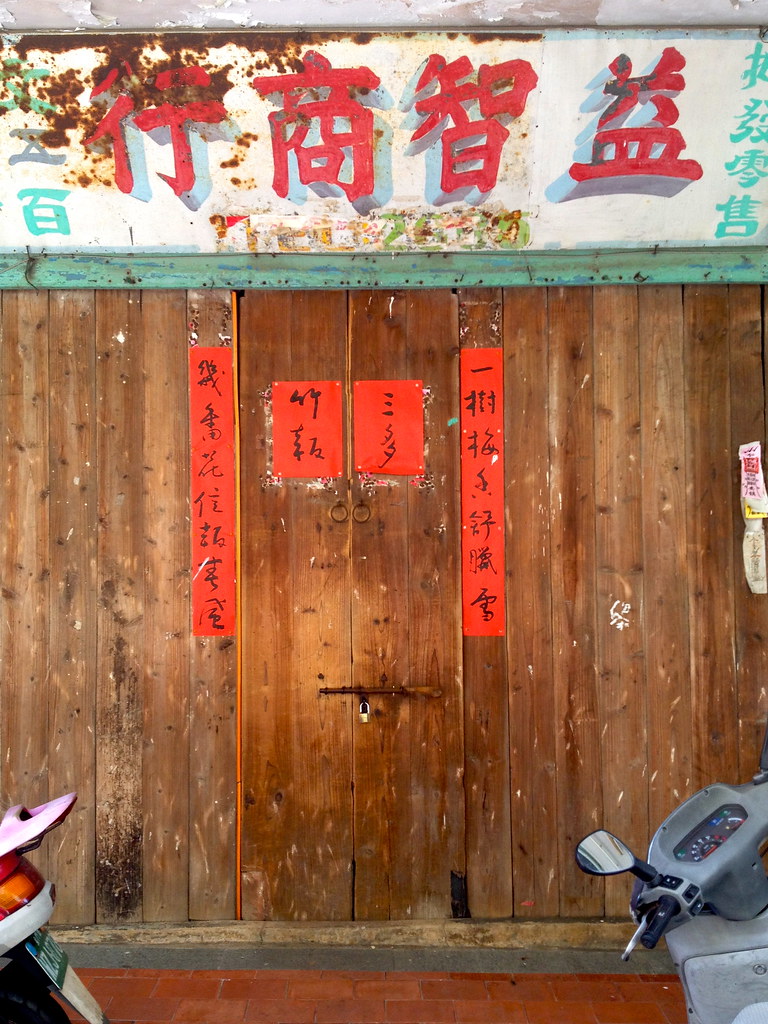
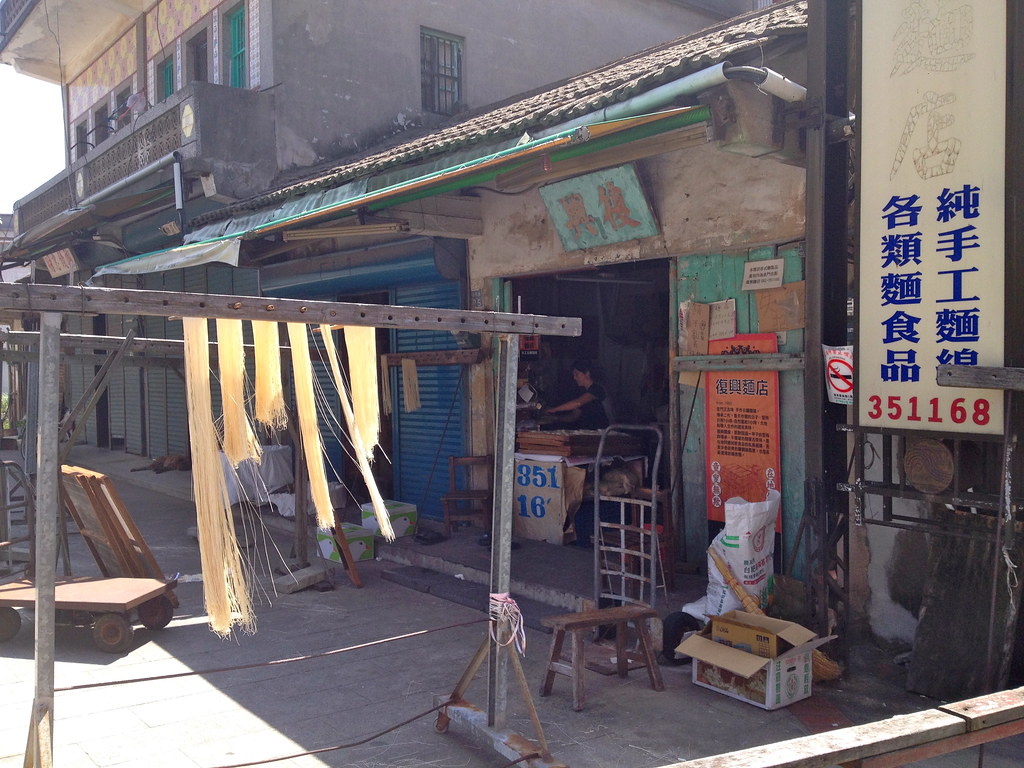
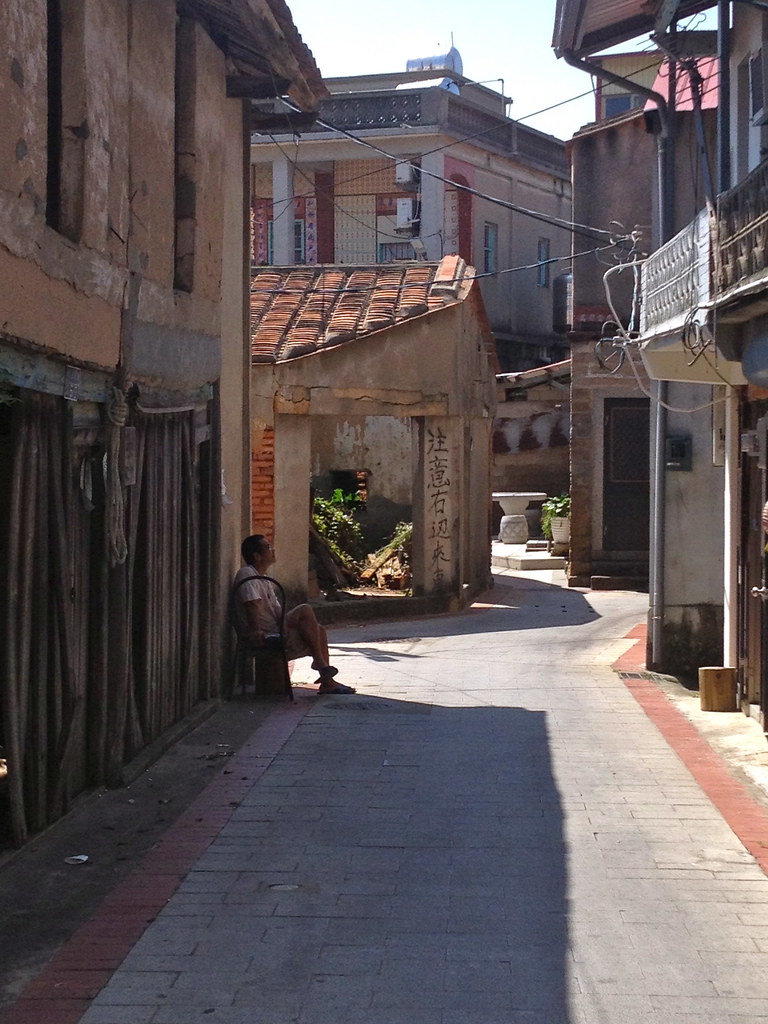
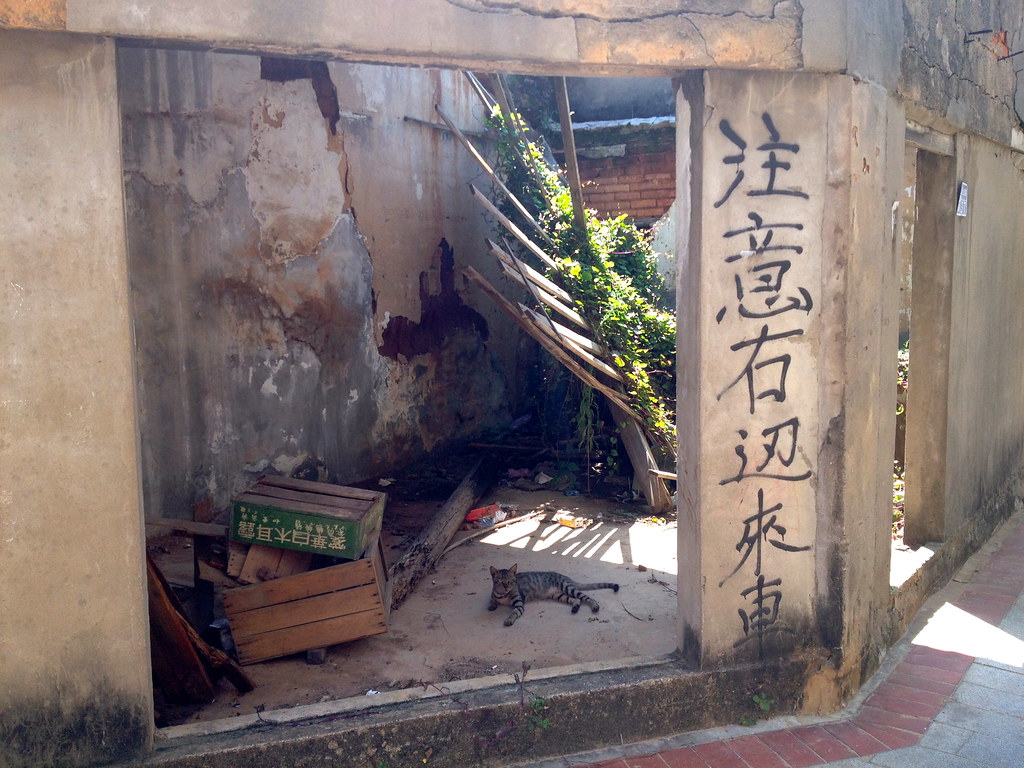
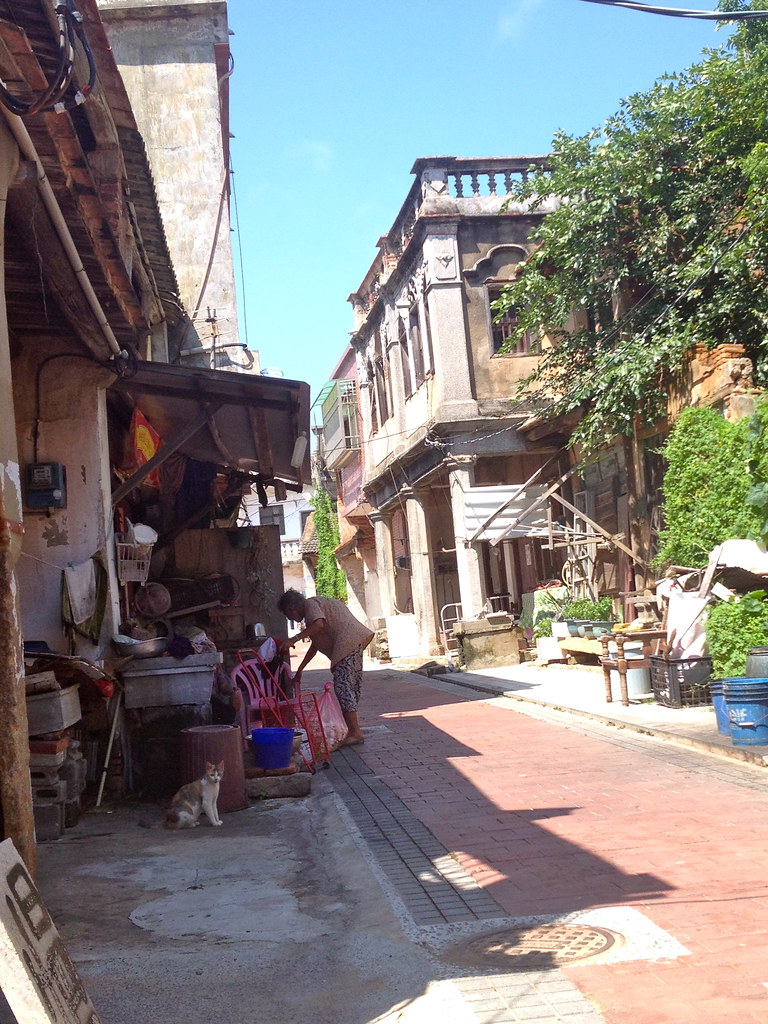
I'm not sure when this happened, though, because after we left the neighborhood with the Rui You School, we followed the road out of town right to the coast (past some interesting-ish views of windfarms), turning at a small reservoir-like lake that is either man-made or man-contained, before heading up a road that led to a turn-off (forgive my vagueness, I really don't remember well) where, completely by accident we came across a tiny little parking area with a stone staircase leading up a hill, which looked like it'd have an ocean view. Why not, right?
Turns out at the top there was some old gate - I actually don't know how old although we checked at the time, but old (like 14th century) and fairly recently restored. Checking the name online after a deft Street View search, it was 觀日門, near Tianpu (田浦) village. Of course then I upload my photo and realize the name is right there. Doof.
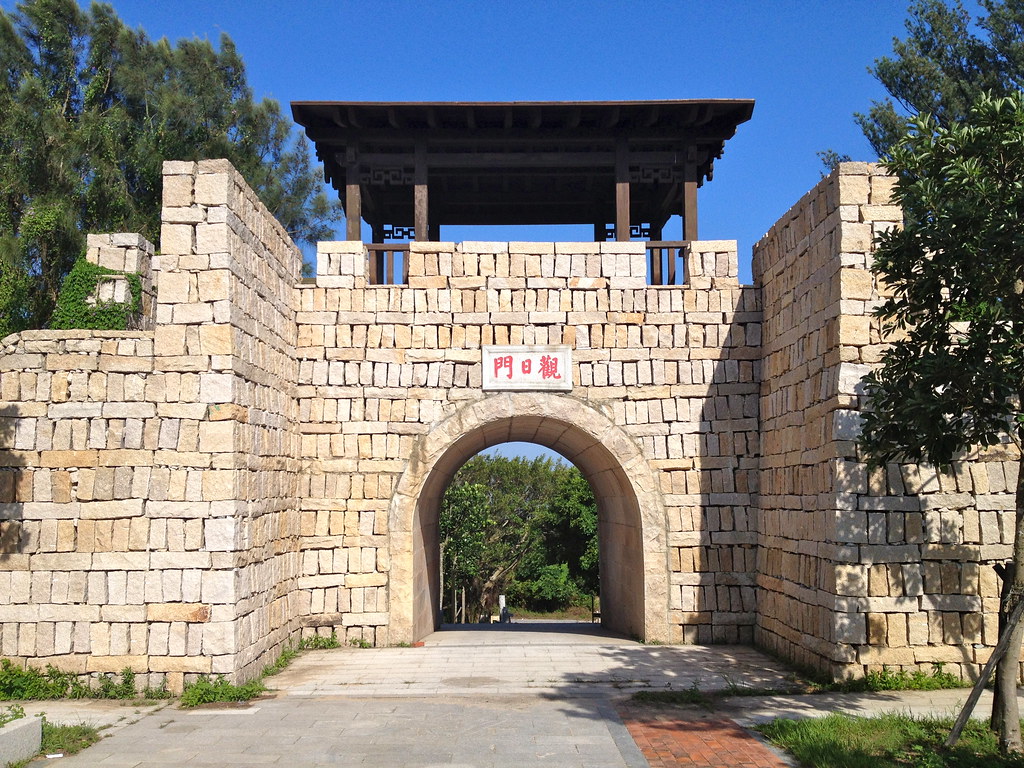
Then we drove along Buhua Road, which is not that interesting in and of itself but is dotted with a fairly high density of wind lions. Here are just a few:
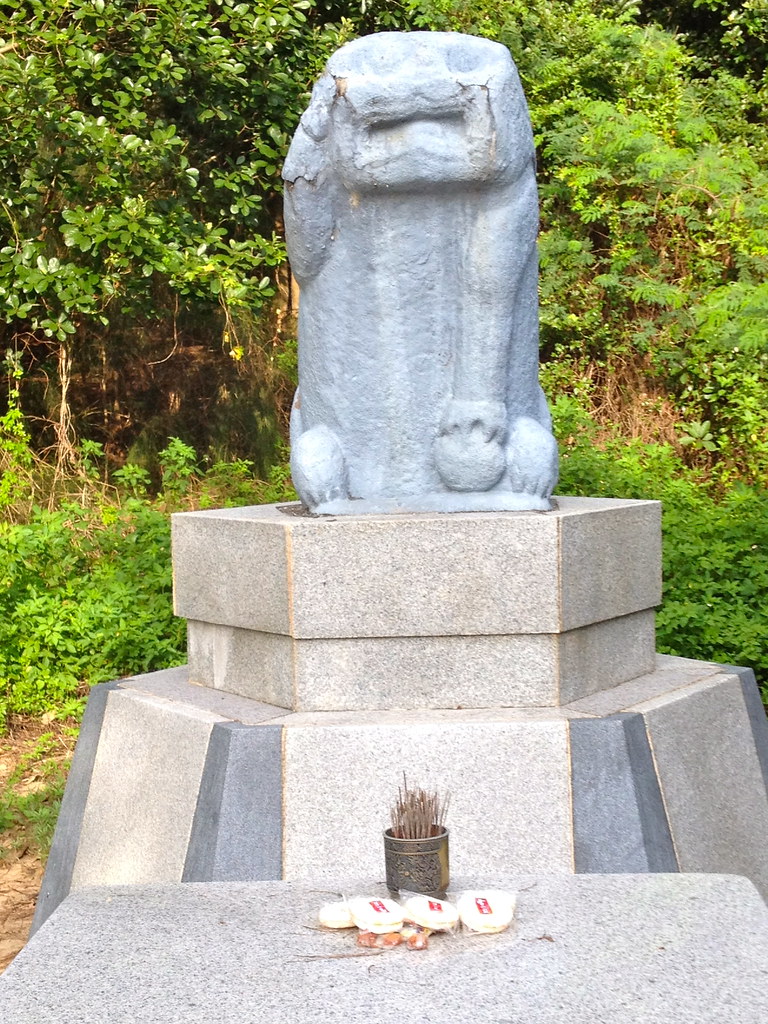
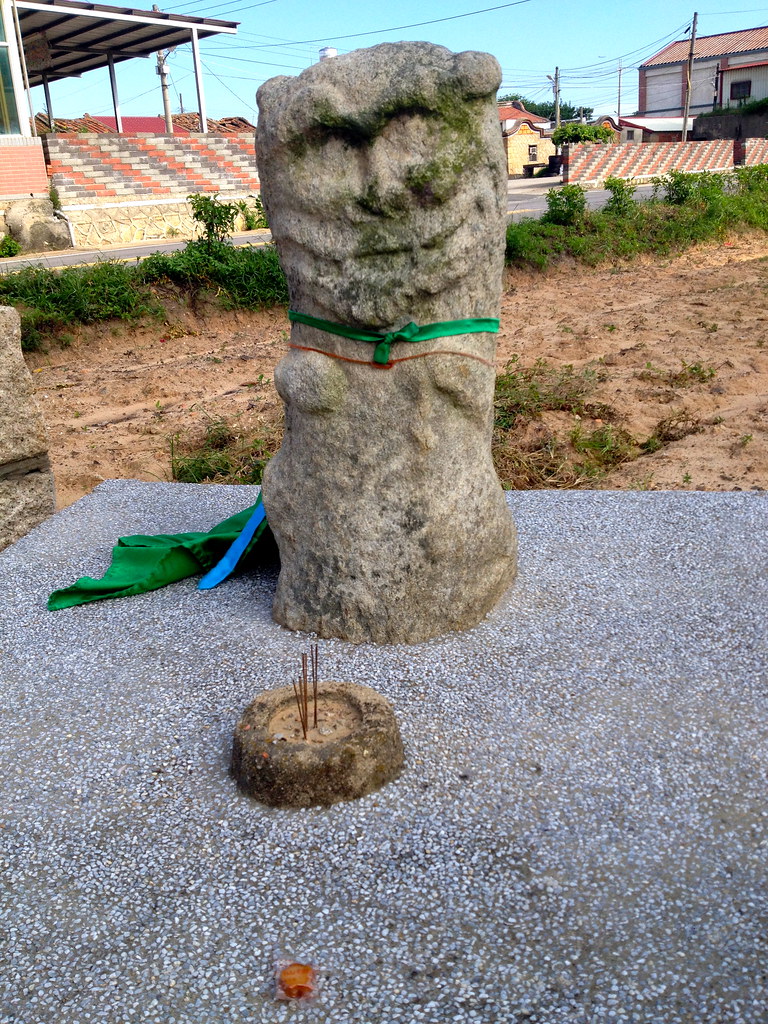
...before heading into the Lake Tai recreation area looking for more wind lions. We missed the museum as it was getting late, but managed to get this lovely picture of the sign for the "amusement zone":

AMUSEMENT IS MANDATORY IN THE AMUSEMENT ZONE.
...and we only found one fairly unimpressive wind lion, but it was cool to ride around the back roads.
We finished off with dinner in Shanwai, after finding a few lions there, too - including this sad-looking colorful one at the edge of a parking lot who is very definitely male:
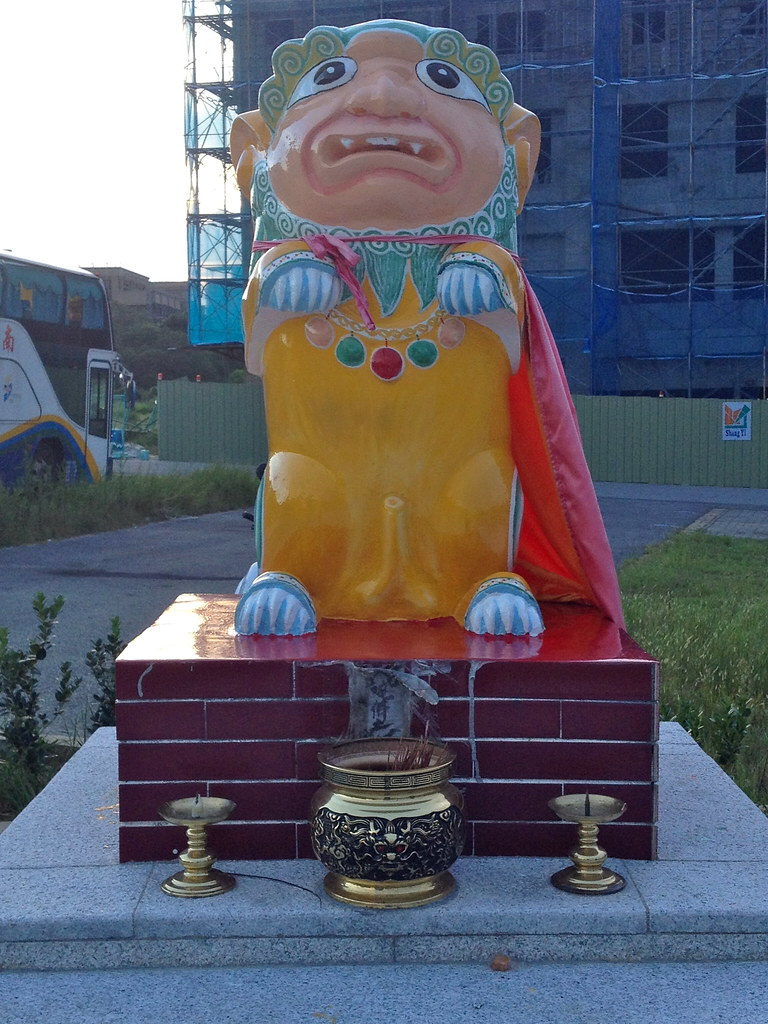
Throughout Shanwai we kept seeing these flags, and although I am fairly knowledgeable about Taiwanese folk religion and culture, I have to admit I don't know what they signify:
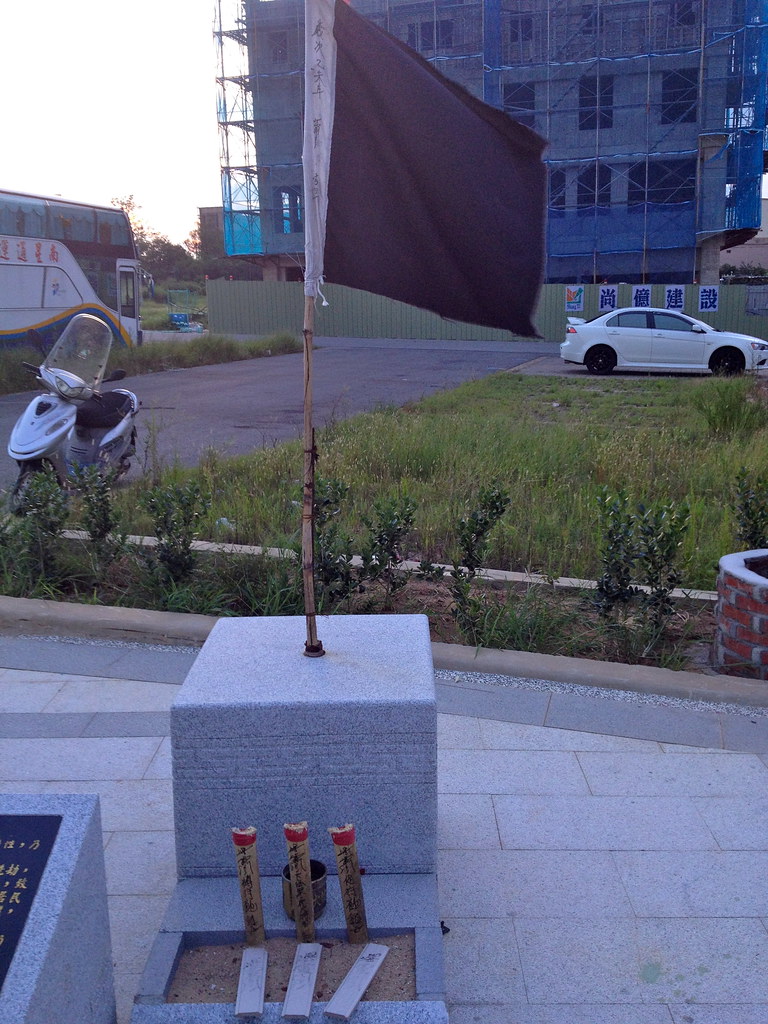
If anybody does know, I'm all ears. I rather hope I didn't take a disrespectful picture (though that's pretty rare in Taiwan, other than perhaps funerals you can photograph nearly everything).
Jinmen is a KMT stronghold, which means that a lot of old statues of Generalissimo and general Mass-Murdering Jerkwad Chiang Kai-shek (ptooey!) are still kicking around, where they might've been taken down in other parts of Taiwan. However, both Brendan and I appreciated the context of the statue in this circle, flanked as he is by a massive election poster - for the DPP! Ha haaaaaa, sucks to be you, Chiang. I hope you choke on it in the afterlife.
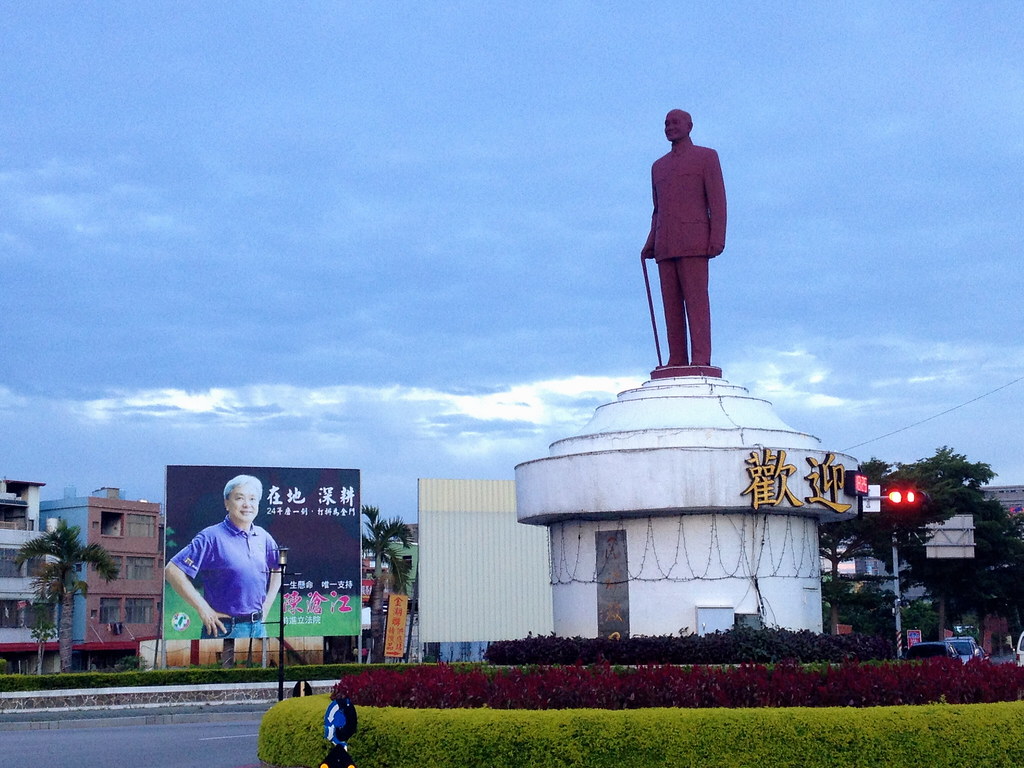
We hiked up a hill past more friendly cats - Jinmen has a lot of cats - to a few more wind lions before having dinner and driving back to our hotel. Wind lions in older sections of towns, usually far from the modern center, tend to be older:
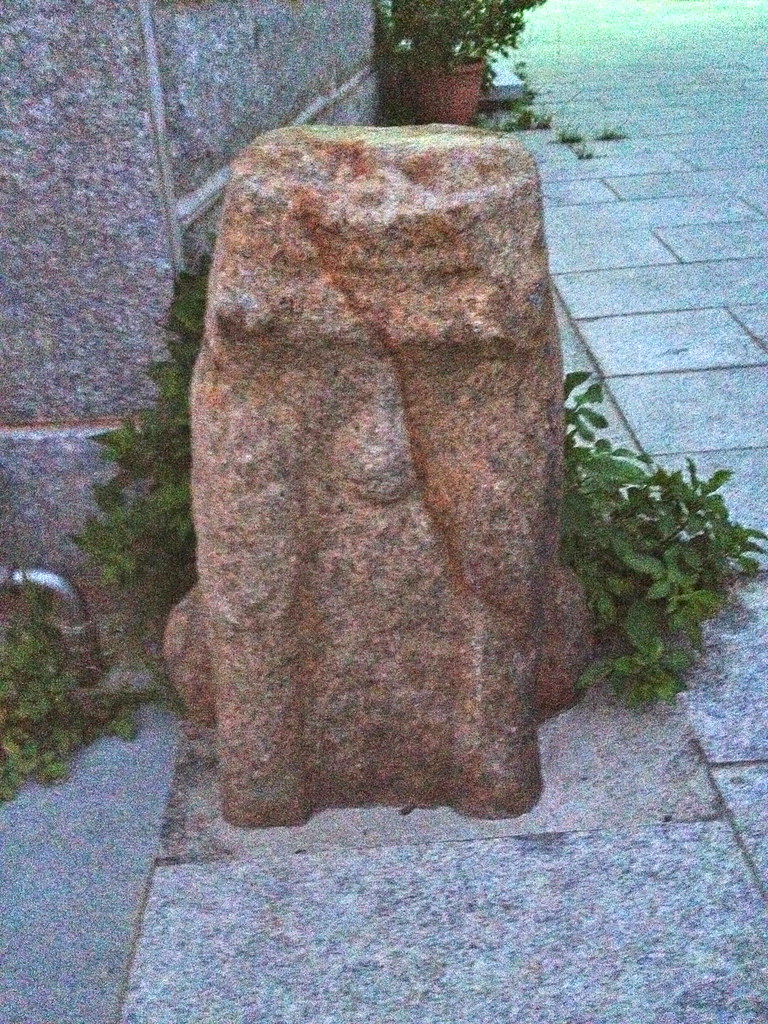
And we also passed this dalmatian-themed hotel with a pet dalmatian:
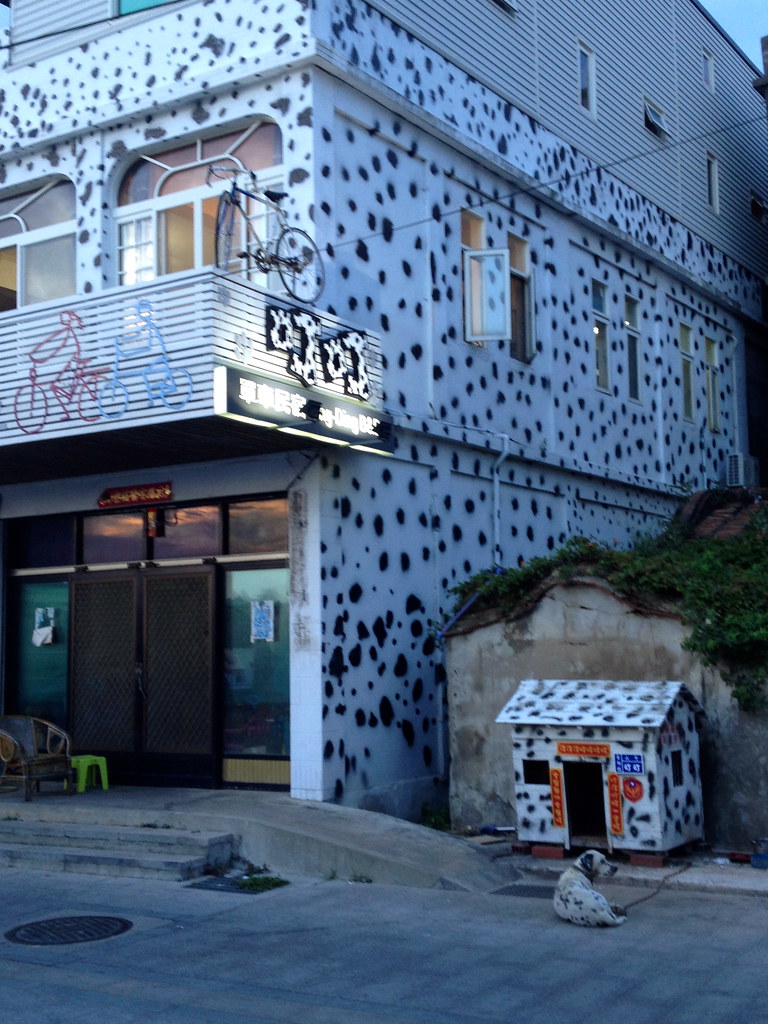
And found parts of Shanwai to be fairly attractive:
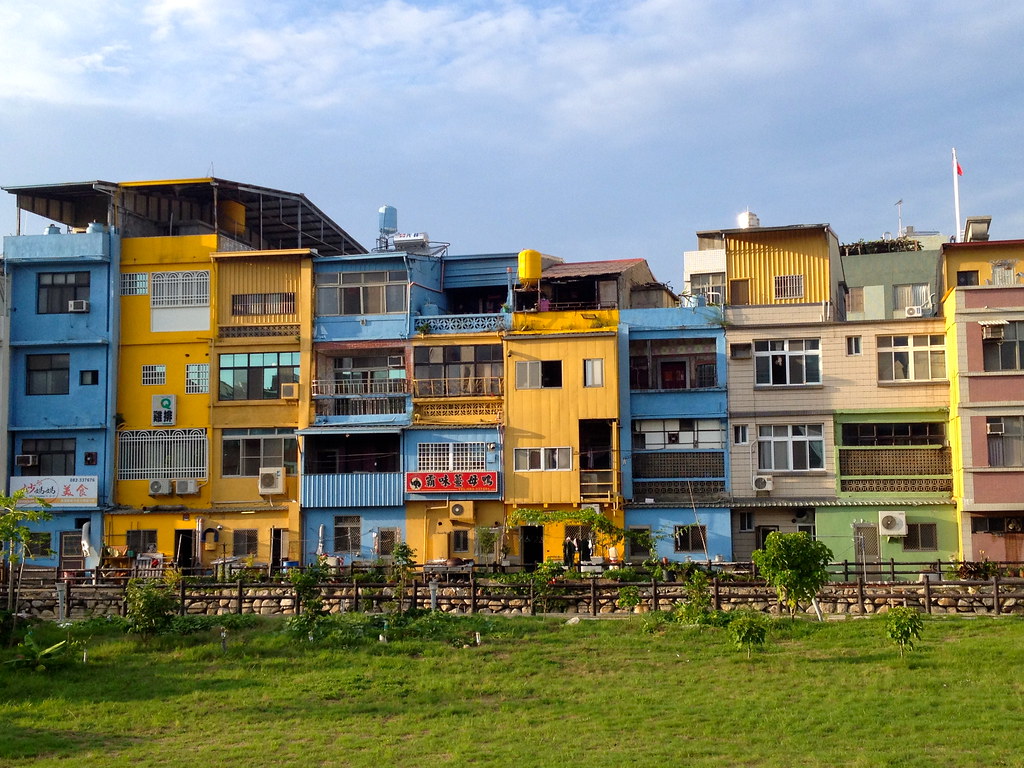
Another good thing about our hotel is you can hang out outside at night and drink Taiwan Beer (or whatever you like), and you can even have free Kaoliang, though I only had a tiny thimbleful. I'm not afraid of strong spirits - my whiskey of choice is Laphroaig after all - but I just don't care for Kaoliang.
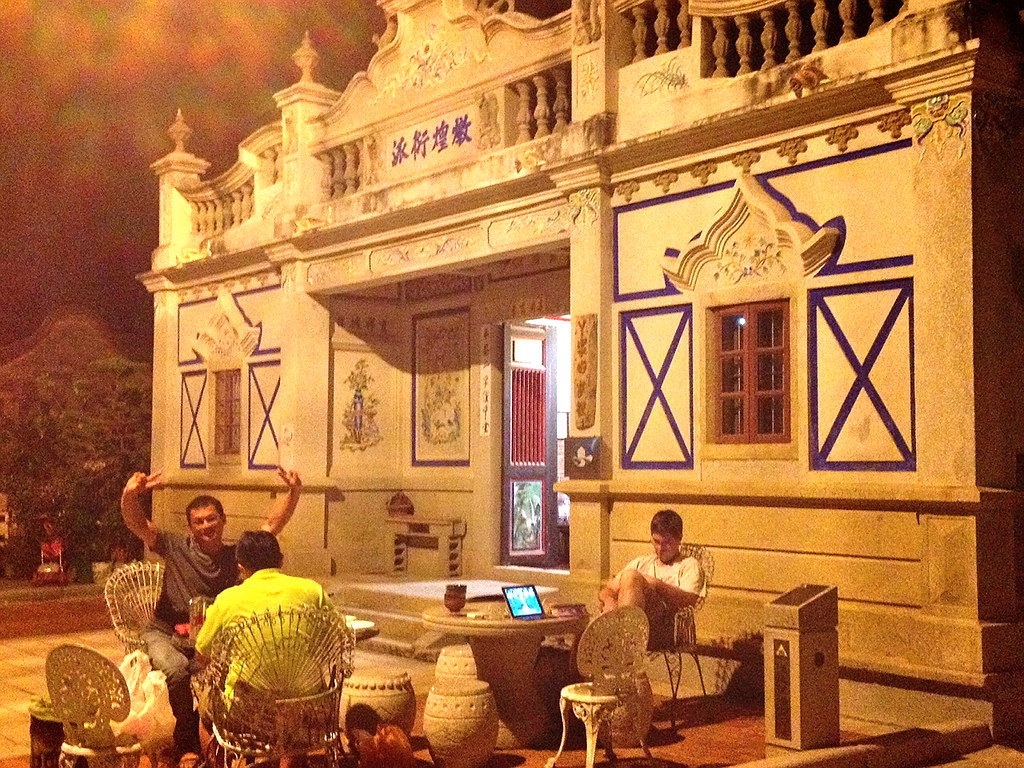
But wait, there's more!
I also can't remember when we did this, but at some point we stopped at Shanhou culture village. Historically the home of the Wang family and their many, many, many extended cousins and various relatives, now it's mainly a tourist attraction, but worth a visit. The oyster omelets are actually delicious, and there's a wind lion not far away. You can buy Kinmen Wang Da-fu balm here - a green herbal balm not unlike Tiger Balm but milder and more vegetal - the third-most popular Kinmen export after knives made out of bomb casings and Kaoliang, possibly fourth after those cookies you see everywhere. I bought some because I love balms, and we already have a bomb knife (thanks Joseph!), and I don't like Kaoliang.
Anyway, some photos from Shanhou:
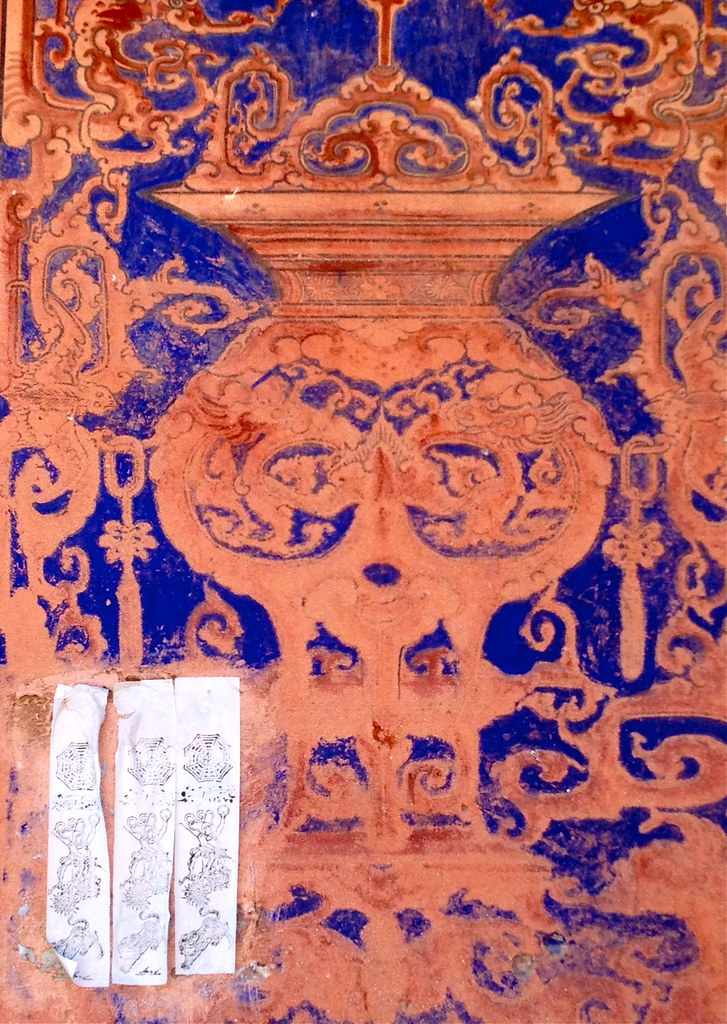
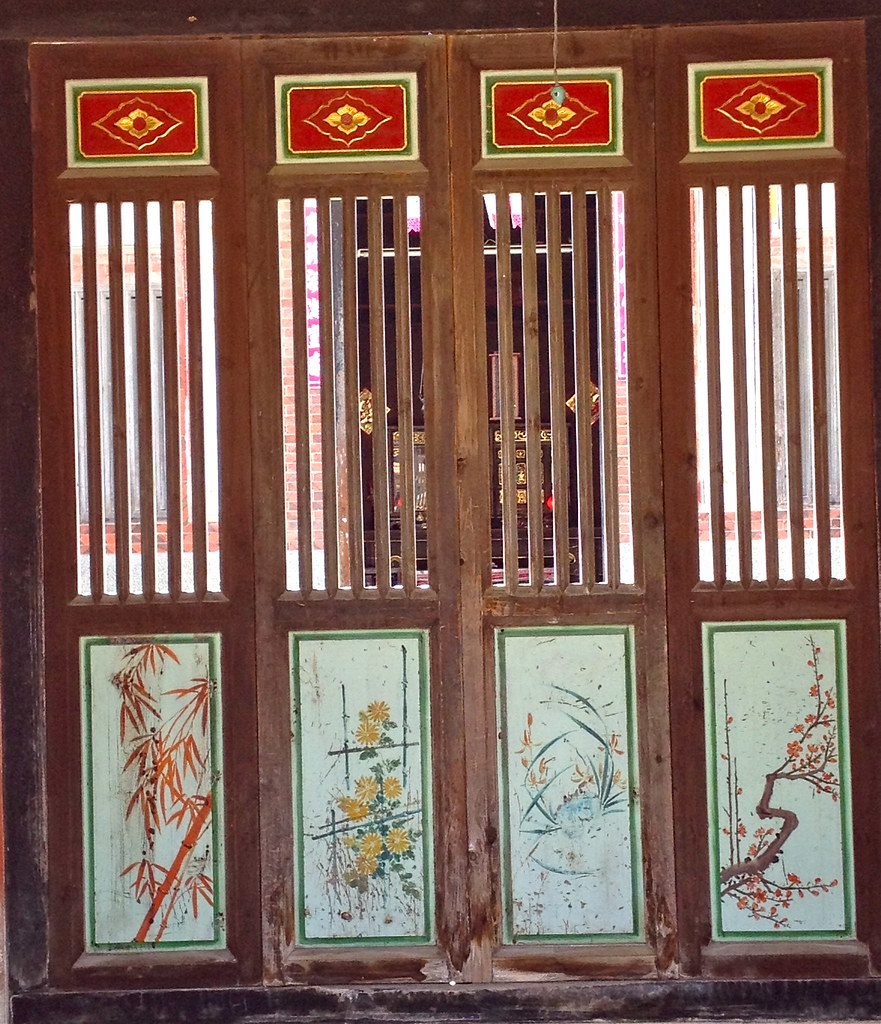

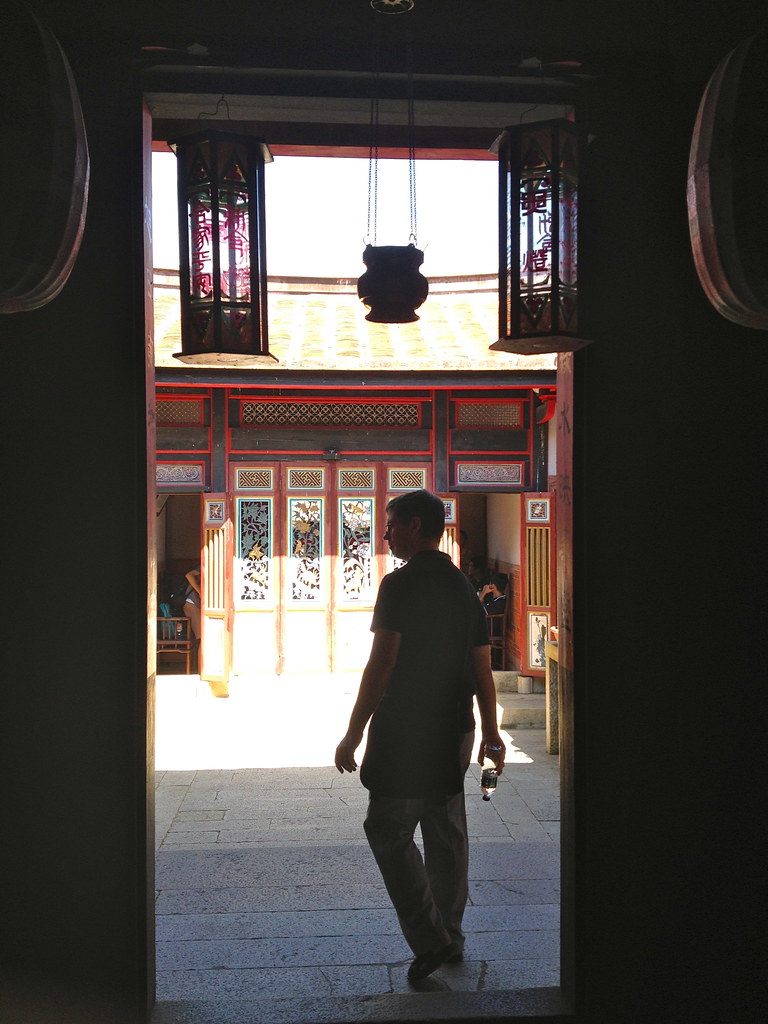
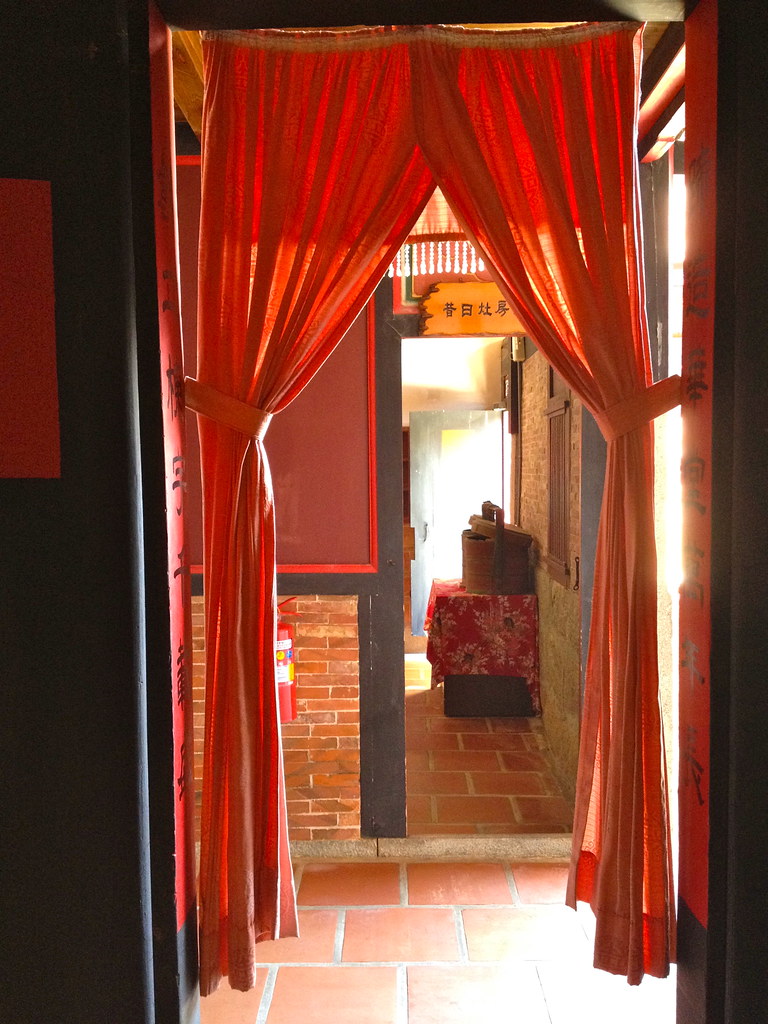
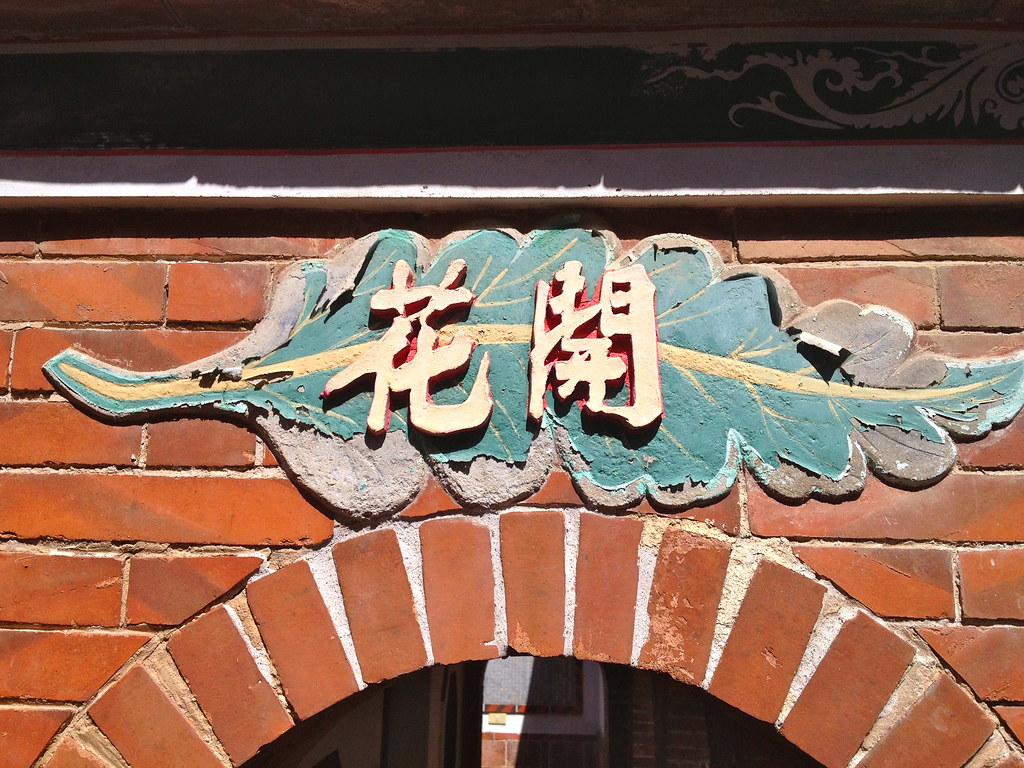
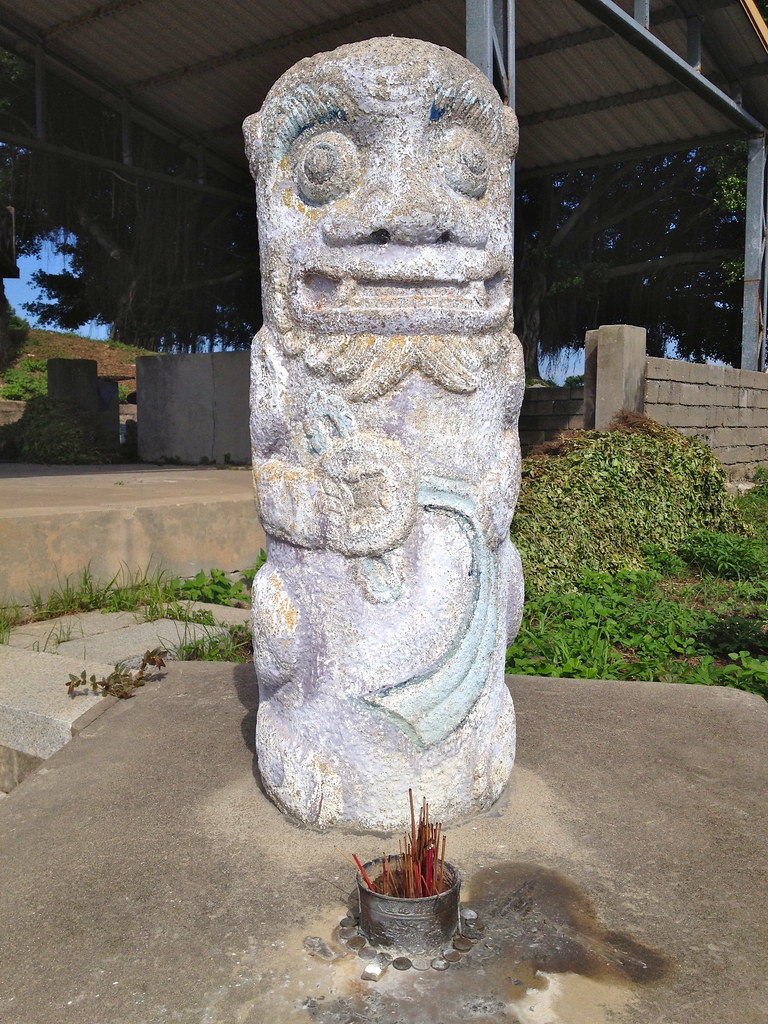
...and while we didn't make it to Maestro Wu's bomb knife shop (because we already have a bomb knife), or the Kaoliang distillery (because neither of us really likes Kaoliang), we did go to the Guningtou battle museum, with it's wonderfully/horribly propagandistic oil paintings of the ROC forces defeating the PRC on the nearby beach. Not a lot of photos from that, but here are some photos from the nearby town, with the famous bullet-ridden yanglou (foreign style house), after which we visited a temple erected for an ROC general, Li Guang-qian (李光前將軍廟), who died in the battle on Guningtou, which is a short drive south on Huandao Road:
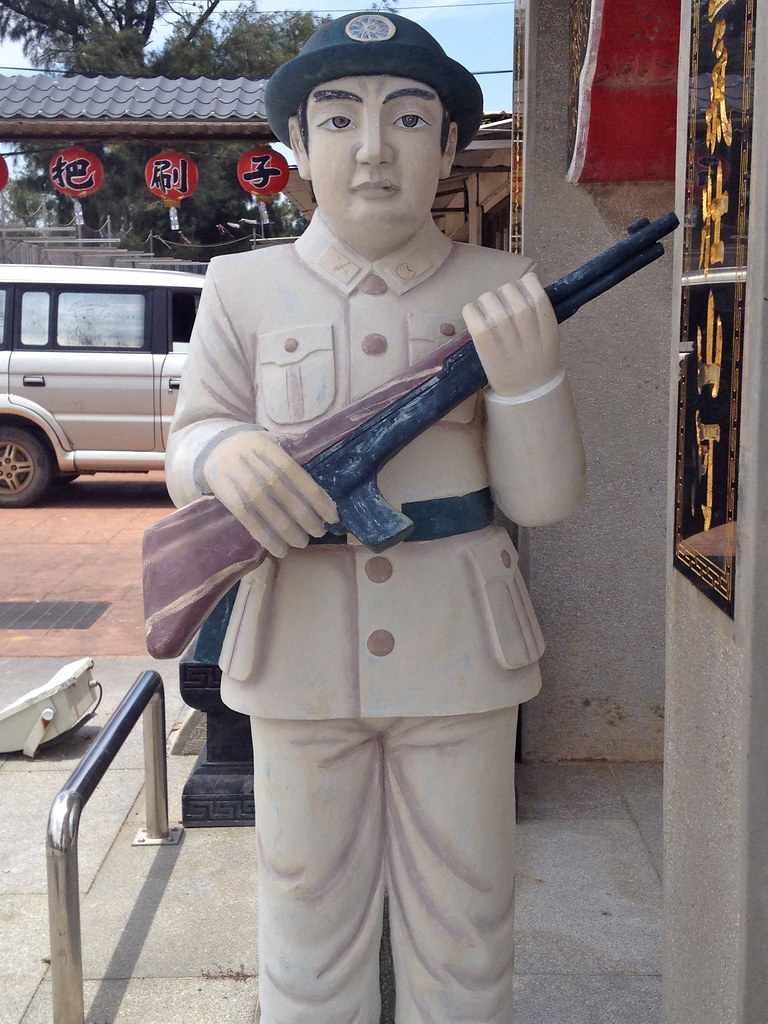
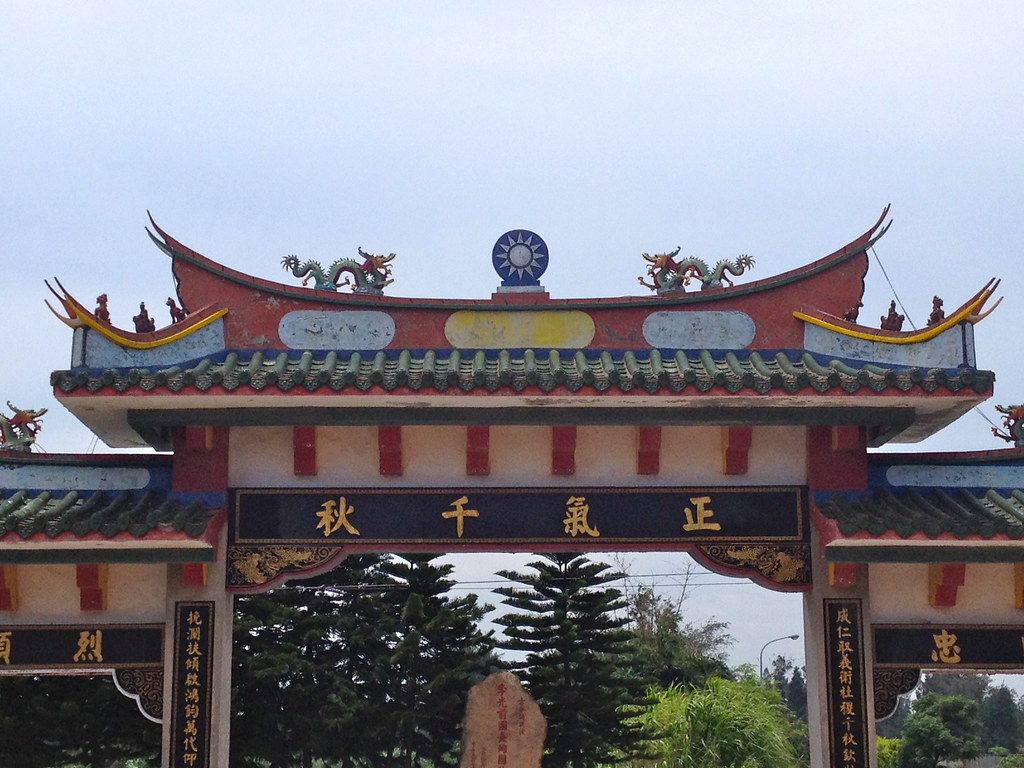
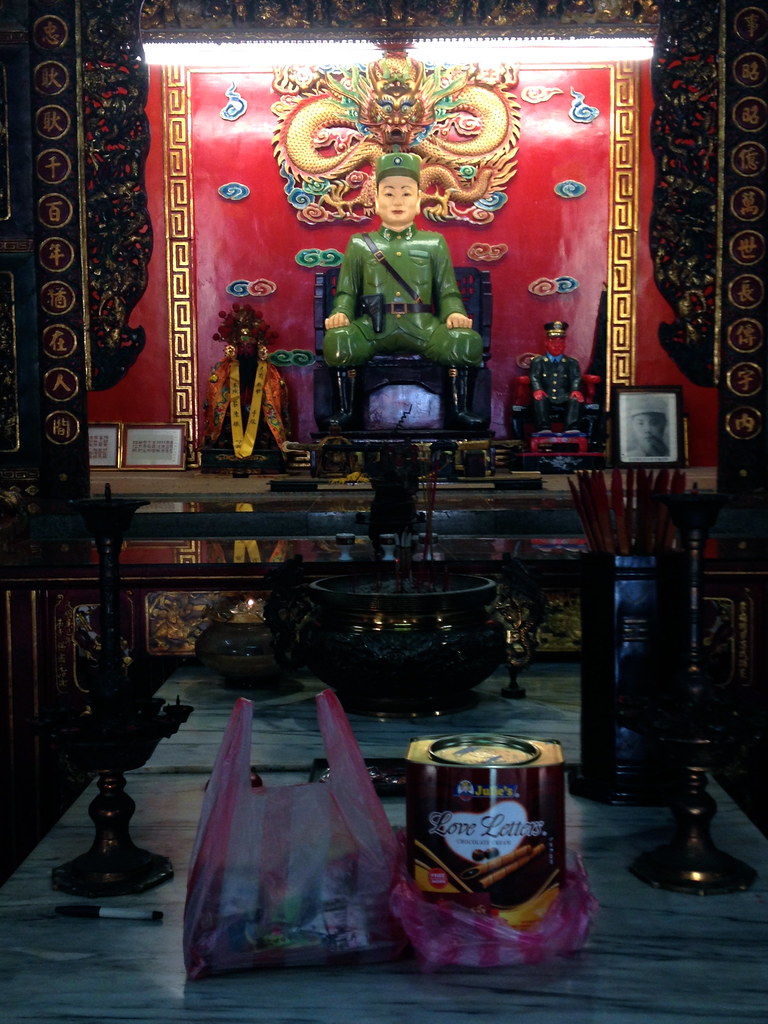
We had no particular reason to visit the temple other than that we drove by it and it looked interestingly militaristic in a way that most temples, uh, don't. That's the great thing about just tooling around and not worrying if you hit every sight in the book.

Another benefit of tooling about is that you find things you didn't even think existed. Rough Guide mentions one old granite tower (also 14th century), but if you wander enough and stop where you see interesting signs, you'll come to a few more (no idea if they are authentic vintage or were built/rebuilt some time later).
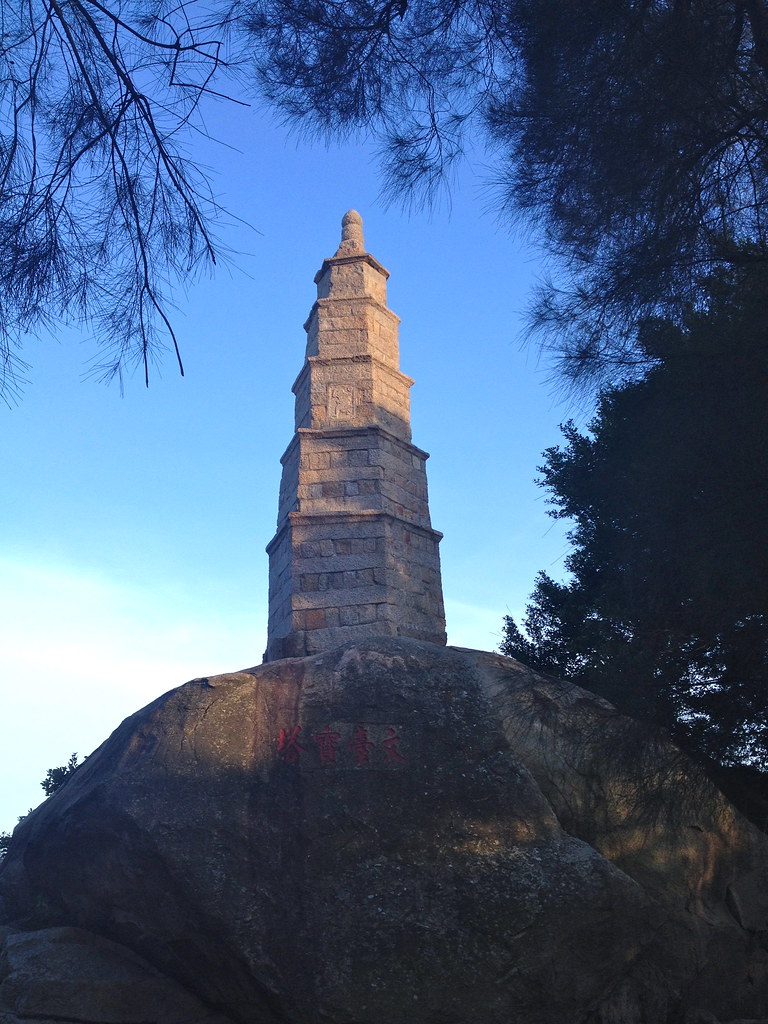
This is the one in the guidebook.
And this is one of the random ones we found:
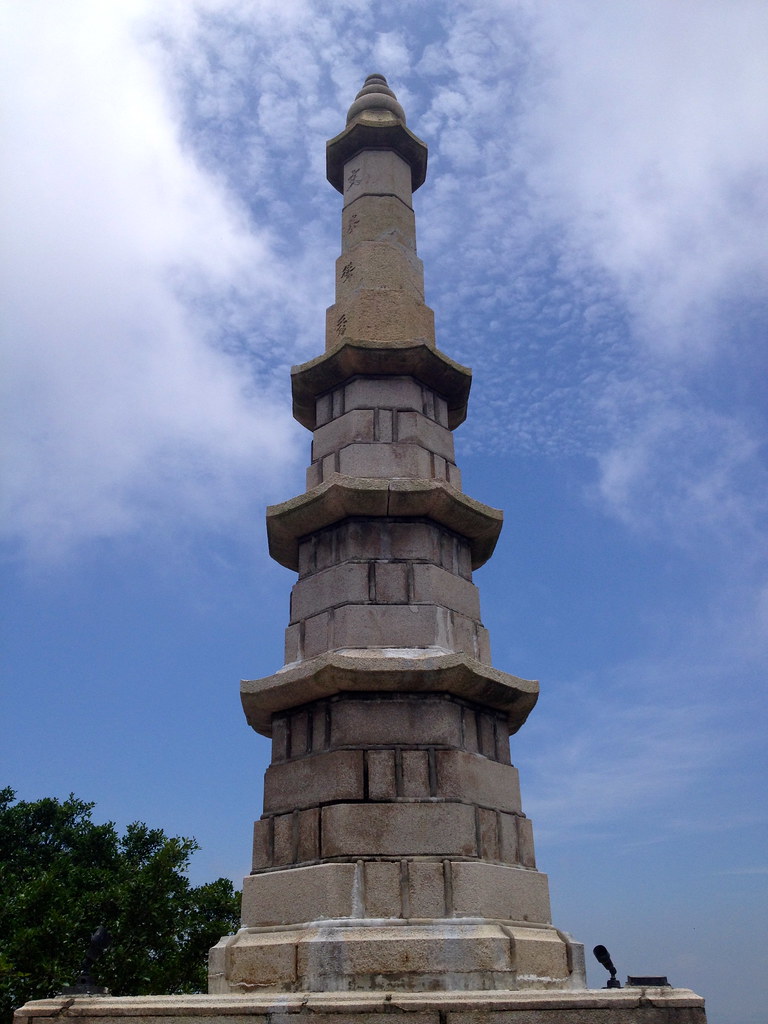
...and we found at least one more besides these two. They all look about the same though.
We also hiked up Taiwushan, which sounds impressive except it's not particularly high. Before going up we explored the old military cemetery near the car park. There are some nice views, and notably, more of Jinmen's many cats.
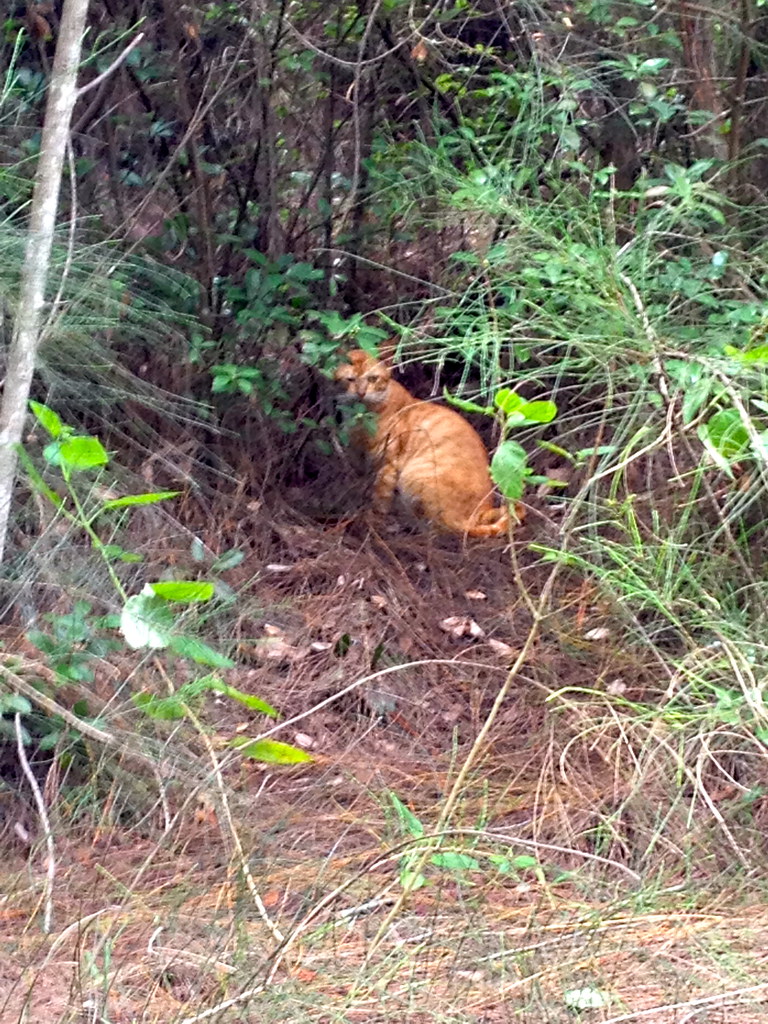
We stopped at the old inscribed stone (my photo wasn't very good) and Haiyin temple, which was a pretty good place to take a rest before heading back down (somewhere along the road up Taiwushan we found a pathway to another one of those granite towers).
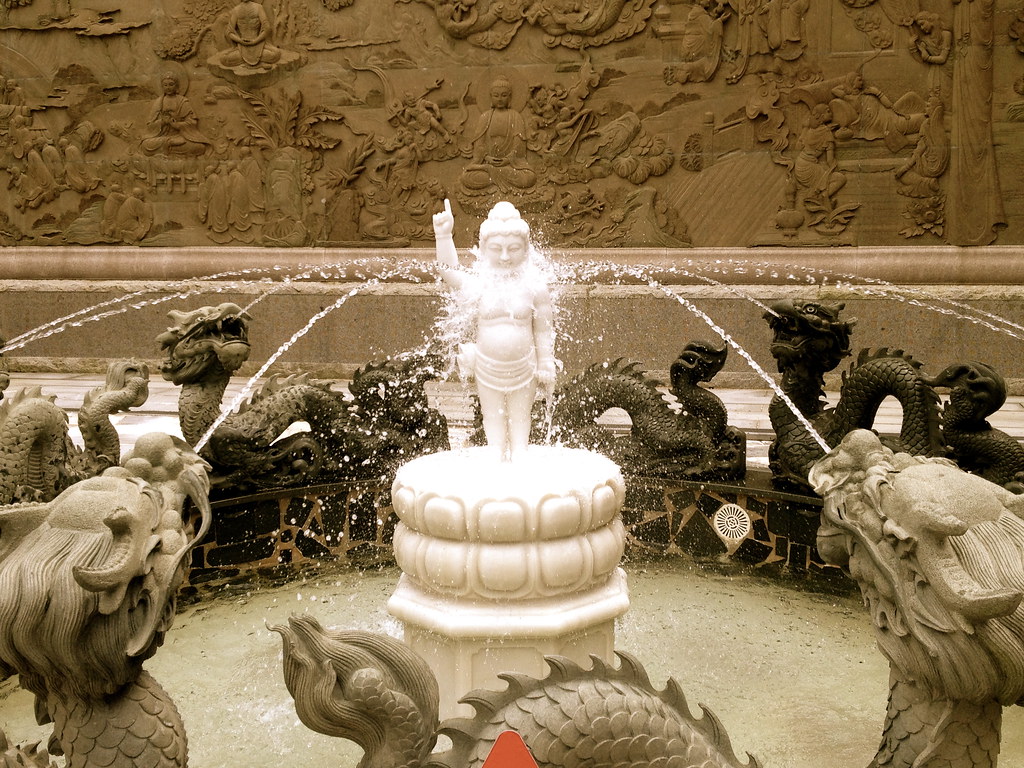
On our last day we drove around a bit more and found a few more wind lion gods, including some way out in the countryside by the airport. These lions, it seems, are undeniably gendered:
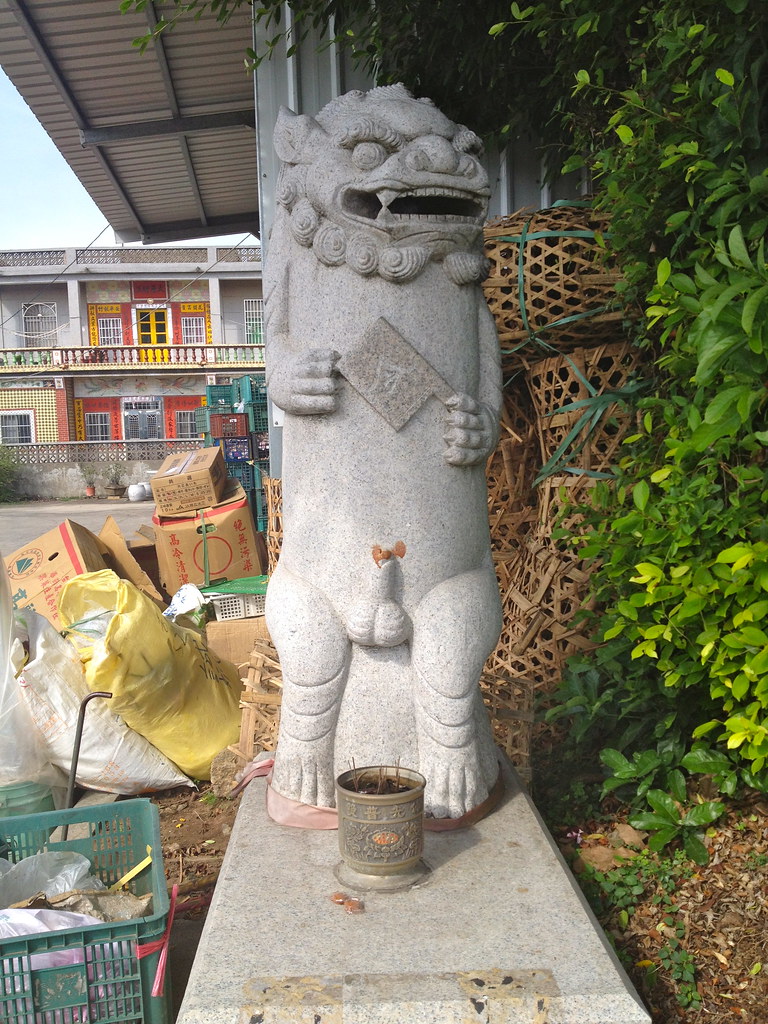
Well hello there. Aren't you just a happy little fella?
...and a few photos that didn't really fit anywhere else but I basically just liked:
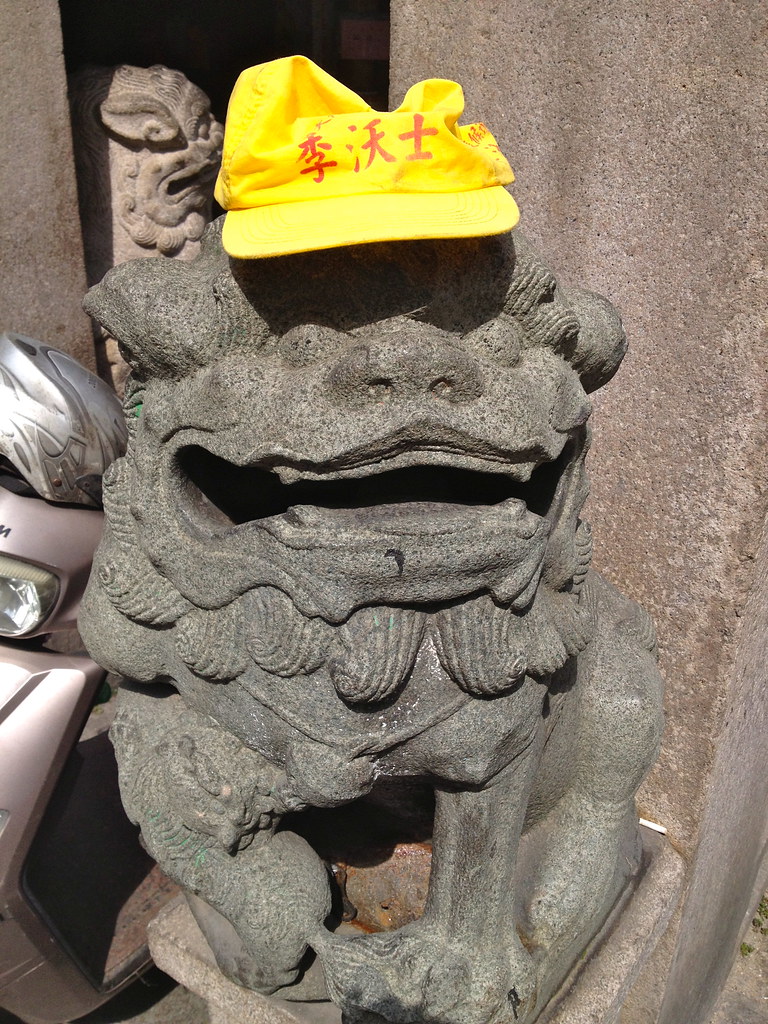
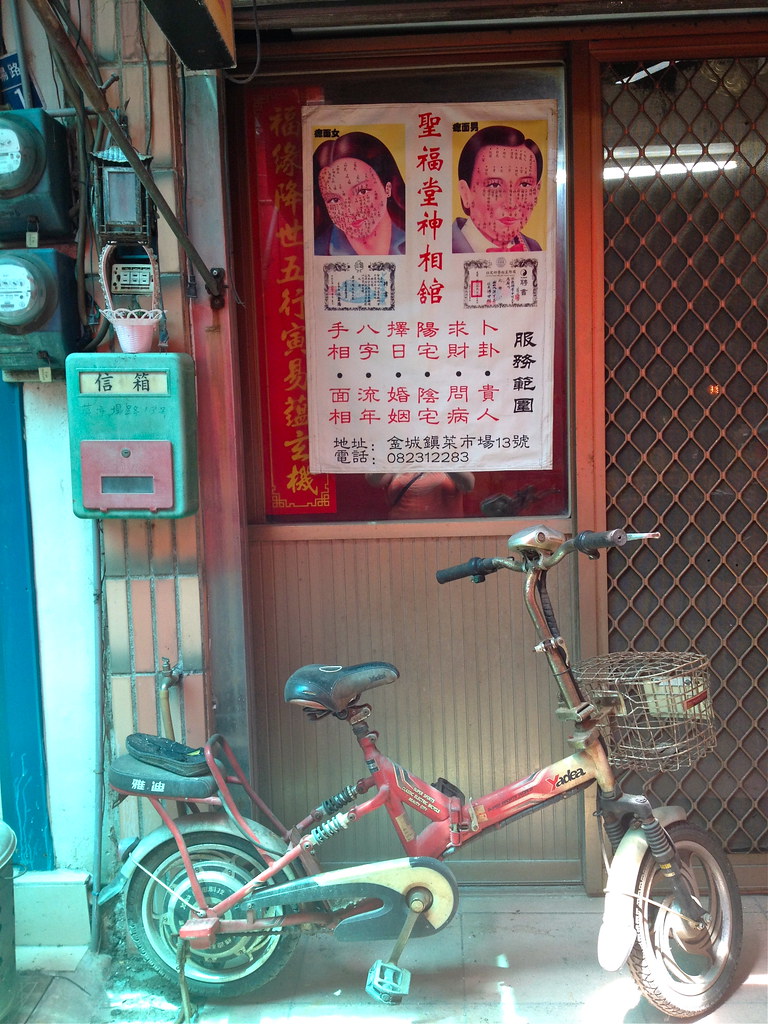
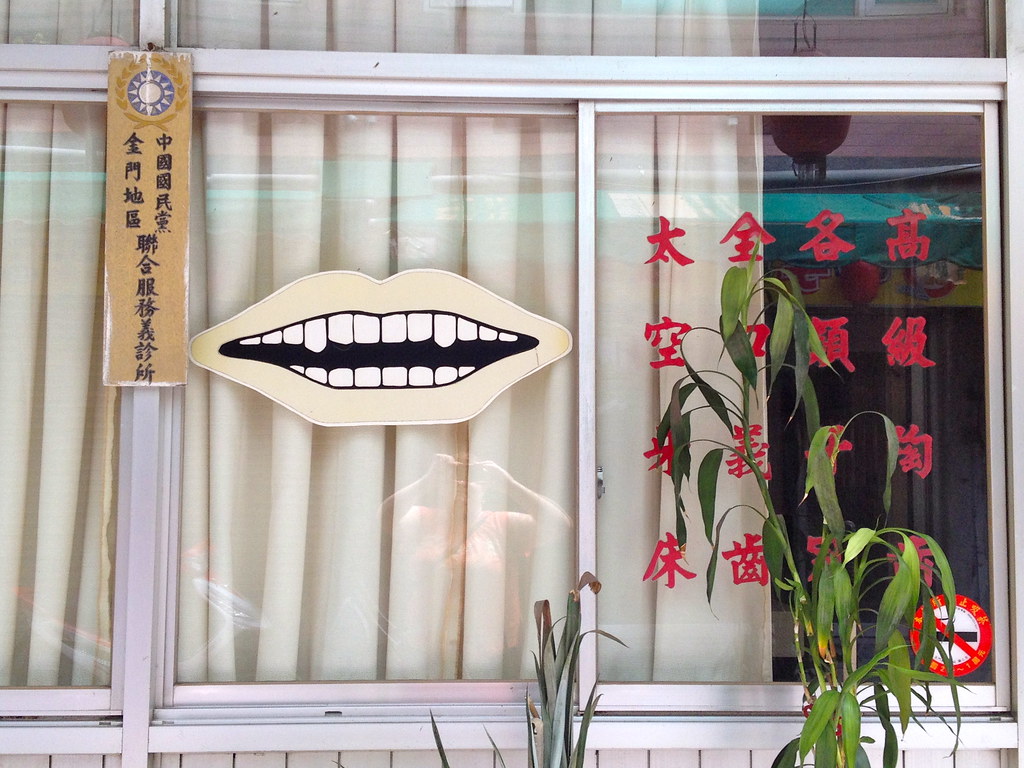
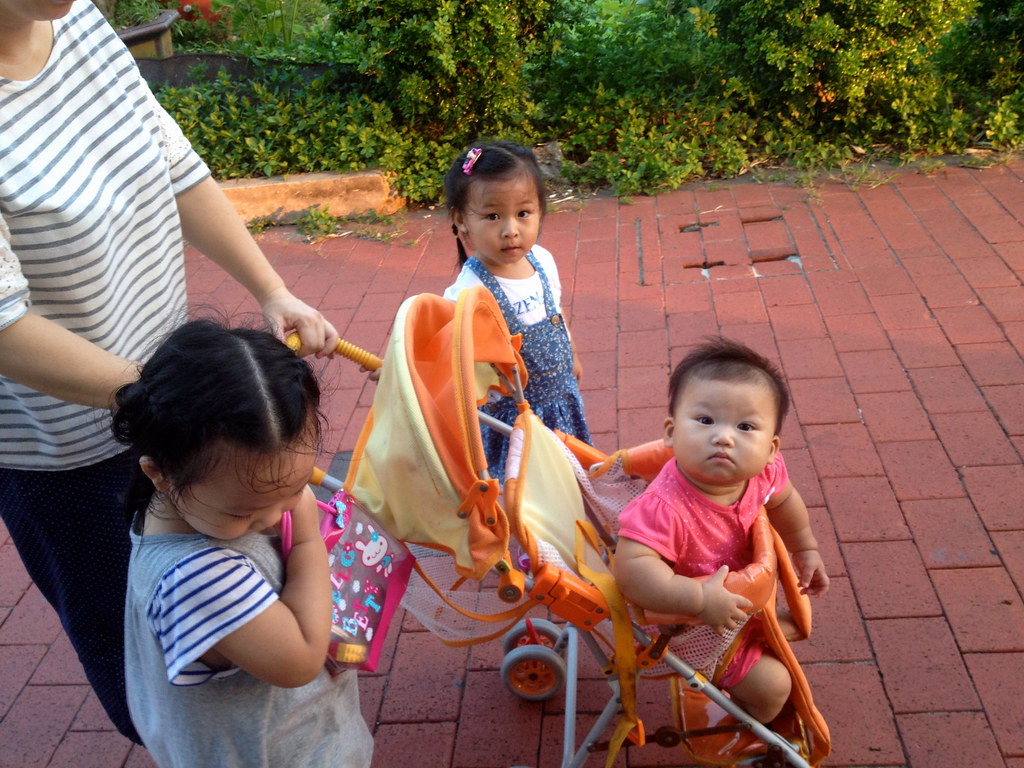
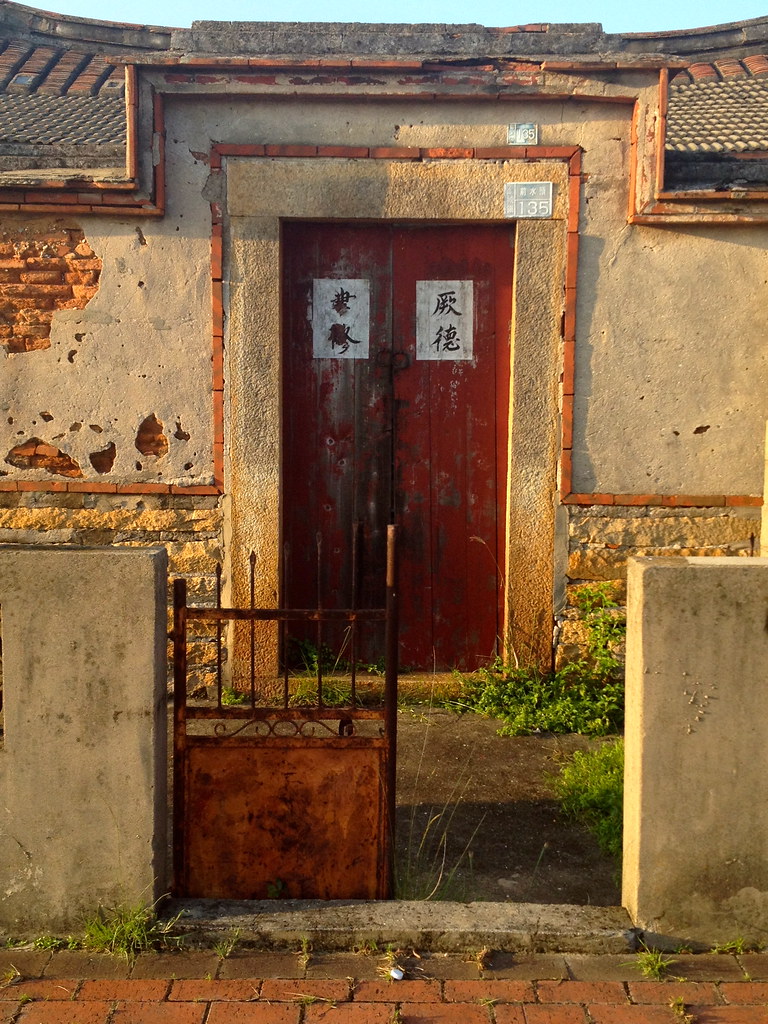
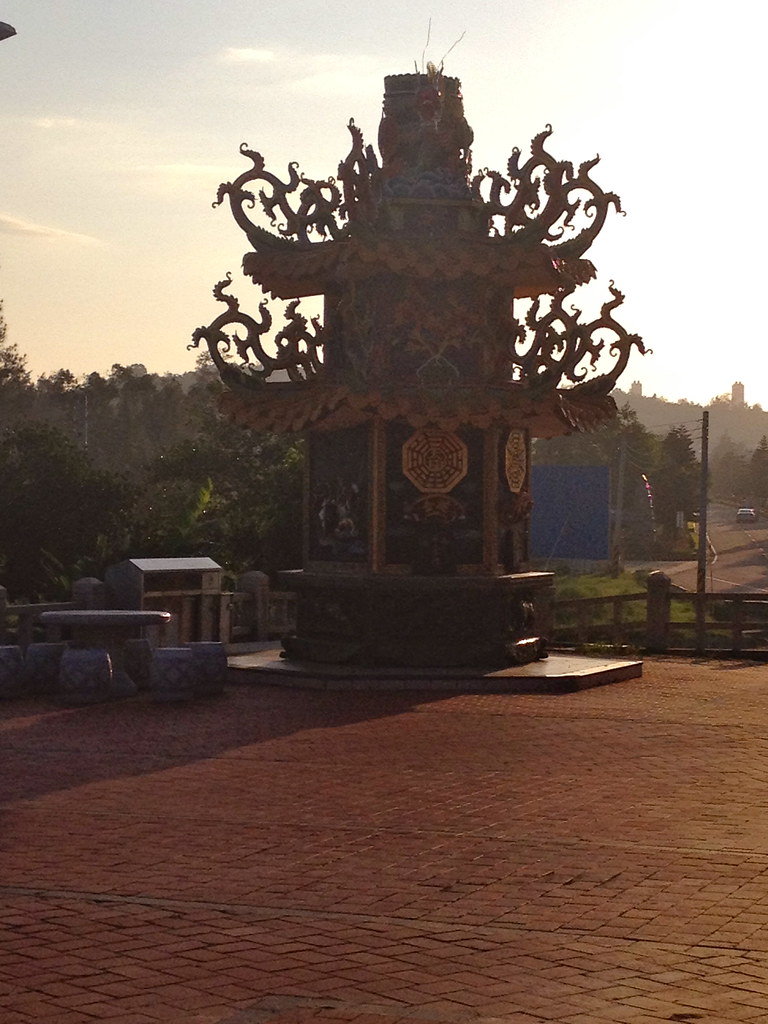


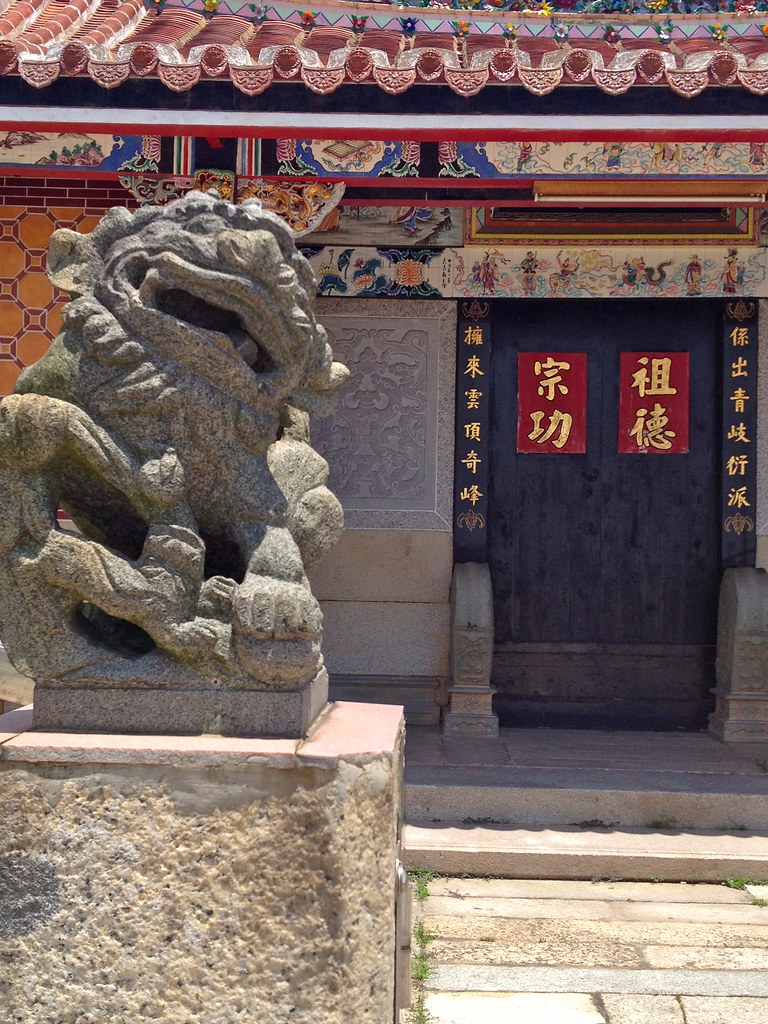
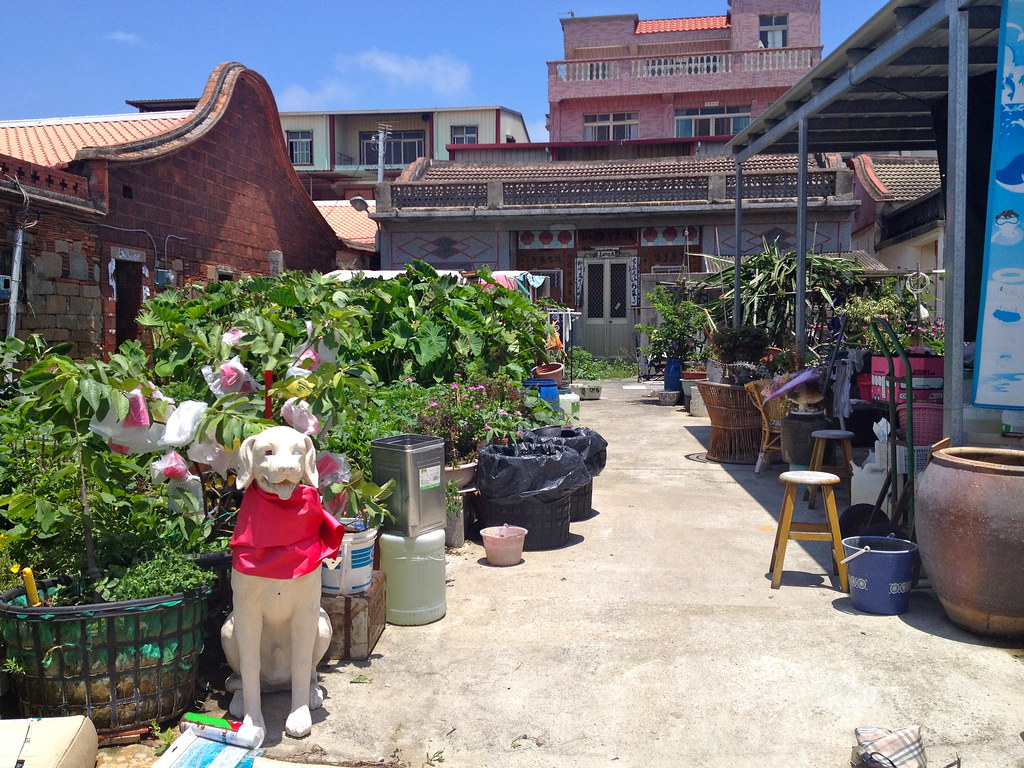
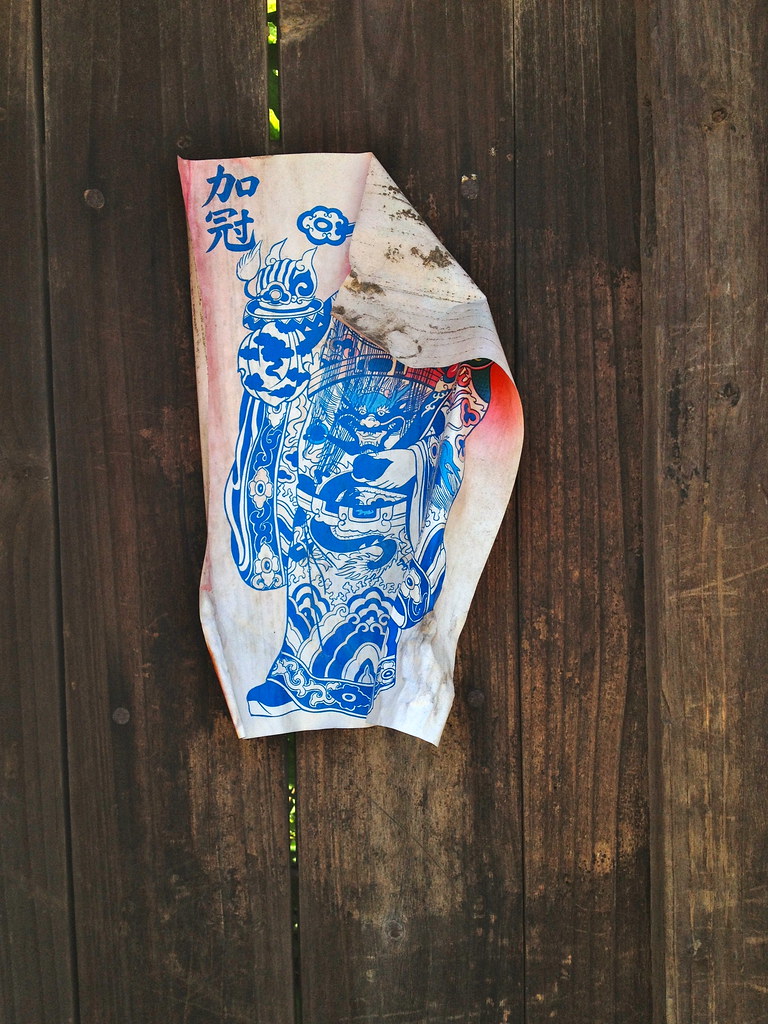

Anyway, as I've mentioned several times but haven't yet posted, over the summer Brendan and I went to Jinmen (Kinmen, Quemoy, whatever) just before I left for yet another trip to the US for yet another family issue (this one less serious). I decided I'd better post about it before I forget all of the particulars!
Two notable things about flying to Jinmen from Taipei: the first is that you pass right over Penghu, so you get a bird's eye few of Magong Island. It's quite something, and is a good reminder of how small Magong really is. Secondly, I didn't think anything of it when I took a few photos of the Central Mountain Range of Taiwan from the airplane as we flew down the coast - only to find it's actually illegal, at least according to Taiwanese law, to take photos of Taiwan from airplanes! Obviously it's a national defense thing, I just hadn't heard of such a law before.

We stayed at ㄚ樂的家, a small "foreign style house" (洋樓) a short drive from Jincheng city - you definitely need to rent a car on Jinmen, though buses do exist - to stay here a car is crucial as it's down several country roads at a tiny hamlet on the waterfront. Worth it!

The inside is also preserved in a traditional look, and there is a kitchen and dining area for your use (breakfast is provided - generous portions and very local-style).
A couple of things struck me about Jinmen - not just the sheer number of old houses and traditional architecture, but also the number of abandoned buildings, most of them old, some of them not. Some of these were foreign-style houses, others were more traditionally Chinese buildings, still others seemed to be from the 20th century.






Second, how many buildings still in use retained their traditional flavor:

Third, the extent to which a lot of iconography - old, but also at times new - conflates the KMT with the Republic of China, in a way you just don't often see in Taiwan proper these days (I'm not sure I've ever seen it).

Rui You School (not functional as far as I know) on the eastern side of the island
Check out the top of that building's arch - it's hard to see in the photo, but it's a KMT flag crossed with an ROC flag. Not something I can recall seeing in on the Taiwan mainland, although I am sure it must have at one time been quite common.
On our first day in Jinmen, we took a nap (our flight left at some crazy early time) before driving first into Jincheng city and then over to Shuitou as the sun set. I won't bore you with too many details, as Jinmen is a well-documented destination, and I primarily want to show off photos! We walked down Mofan Street, passed the maternal chastity arch, and checked out the Qing dynasty military headquarters before heading a bit downwind to the Kui pavilion - interesting in its own right but we had more fun wandering the narrow alleys and warrens between mostly abandoned buildings, which were alive with lots of scurrying cats - some well-fed, others not so much.
One quick thing worth noting before we get into photos - the Qing military headquarters' side rooms are used for storage for much of the year, leading to peeks in windows that reveal scenes such as this:

AAAAAHHHHH!
I was so intrigued by this creepy room of bridal mannequins in retro dresses that I went to some effort to ask about it - not really sure how Qing dynasty military operations and mid-century Western brides were related. Turns out they're not, this room is just given over to a local business for storage.

Ruined buildings around Kui pavilion

Mofan street - nice to walk down but not a lot going on

Another interesting old building near the Qing military headquarters

The largest surviving memorial arch in Taiwan (Qiu Liang-gong's maternal chastity arch)

Just a pretty window casement

Creepy, cool Frankensteiny abandoned "Western style house" near Kui pavilion
By the way, the Rough Guide recommended oyster thin noodle place near the arch, and the scallion-oyster bun place just under it? Both excellent. Worth it, even though they're in a guidebook. On Minzu Road just near the turn-off to the memorial arch are a few shaved ice places. The one we went to was also excellent, and I have it on good authority the others are too.
For those who need a place to relax, get some air conditioned cooling-off time or just have a decent cup of coffee, near the end of Mofan Street there are two cafes, and the one we went to was pretty good.

Special water glasses are designed to sit at an angle at this cafe, which also serves coffee grown in Taiwan among other things.
In Shuitou, which is very popular with tourists (and justifiably so), we wandered a bit until it got dark. There is a pretty good restaurant here that serves "Jinmen local food" at a set price per person - no menu, they just bring you a set number of dishes according to the size of your party. It's set in an old foreign-style house (just ask around). The inside looks like this:

One of the more ostentatious old houses is also a cafe, which is worth a stop (just to get the chance to go in), and is open until 5pm. They don't have food per se, except cafe style snacks like waffles, which are okay but nothing to write home about. Chinese tour groups sometimes come here, which may account for the Mao signs.

The next day, I realized that I had not seen any wind lion statues at all - and with wind lions being, well, THE famous thing from Jinmen (other than that historic battle, and Kaoliang liquor), so rather than hit sights in the guidebook, we just circled wind lions on a local map (they are all labeled) and took off driving to see how many we could find, with the idea that we'd see interesting stuff along the way. This is where the whole "chasing the wind lions" title comes from - we literally did that, basically for an entire day!
We drove out to the far east of the island, passing through Jinsha, Shamei, Shanwai and Shanhou. Here's the thing about posting in December about a trip you took over the summer, for which the map you'd used, on which you'd circled your various planned destinations, was so tattered by the end of the trip that you threw it out: we stopped in a whole bunch of interesting places not in any guidebook (well, not in our edition of Rough Guide anyhow), but I can't remember exactly where those places are.
I'll do my best - here are some of the wind lions we found, and things we saw along the way. First stop, Huishan Temple (會山寺), just off Huandao E. Road.


These two lions are a short walk behind (the former) and just out front (the latter) of the temple.
This is not the temple, this is an example of an old house in this area, which is well worth stopping and walking around in despite a few angry dogs, that is still very much in use and beautifully preserved.




A short drive - also walking distance - from here is a small village, notable (and most easily found) for its old movie theater (closed), which was spruced up and used as the set for the movie Paradise in Service, which I have never seen (but would like to). You can wander in and out of the old shops, which are outfitted with period furniture and even products, at least insofar as they needed to be to function as a movie set. The whole thing is now maintained as a tourist attraction and is genuinely worth a stop, even if none of the old shopfronts are authentic (and I'm not sure they are).
There's a decent cafe here called 心情咖啡 that has good stuff and is a nice place to take a break.



The old movie theater was almost certainly a part of the movie set, and features a few old-style hand-painted movie posters (which are probably too good quality to have just been the background for a movie shoot).



A big, muscled ROC soldier takes out a Voldemort-like Communist
A little further along Yangsha Road, where it meets Dashan Road, you'll come to another set of long-neglected foreign-style houses (at least one has a population of geese in its front yard) and the Rui You school, pictured near the top of this post. There are a few more wind lions around there (I think I've got the correct wind lions matched to their locations:

After the "Paradise in Service" movie set, I have to say, I was more intrigued by old-style buildings with old-style signs that are still in use, and not refurbished for a movie.








At some point we passed through Shamei and got some of the famous shaobing there (tasty - worth it - check your guidebook) though my favorite part of this section of the drive was stopping to wander some of the quiet backstreets. It is easy to get very hot and very tired in Jinmen, so we took a rest on a stoop in one of the older, more shambling back lanes and chatted with locals while local cats lazed about.






I'm not sure when this happened, though, because after we left the neighborhood with the Rui You School, we followed the road out of town right to the coast (past some interesting-ish views of windfarms), turning at a small reservoir-like lake that is either man-made or man-contained, before heading up a road that led to a turn-off (forgive my vagueness, I really don't remember well) where, completely by accident we came across a tiny little parking area with a stone staircase leading up a hill, which looked like it'd have an ocean view. Why not, right?
Turns out at the top there was some old gate - I actually don't know how old although we checked at the time, but old (like 14th century) and fairly recently restored. Checking the name online after a deft Street View search, it was 觀日門, near Tianpu (田浦) village. Of course then I upload my photo and realize the name is right there. Doof.

Then we drove along Buhua Road, which is not that interesting in and of itself but is dotted with a fairly high density of wind lions. Here are just a few:


...before heading into the Lake Tai recreation area looking for more wind lions. We missed the museum as it was getting late, but managed to get this lovely picture of the sign for the "amusement zone":

AMUSEMENT IS MANDATORY IN THE AMUSEMENT ZONE.
...and we only found one fairly unimpressive wind lion, but it was cool to ride around the back roads.
We finished off with dinner in Shanwai, after finding a few lions there, too - including this sad-looking colorful one at the edge of a parking lot who is very definitely male:

Throughout Shanwai we kept seeing these flags, and although I am fairly knowledgeable about Taiwanese folk religion and culture, I have to admit I don't know what they signify:

If anybody does know, I'm all ears. I rather hope I didn't take a disrespectful picture (though that's pretty rare in Taiwan, other than perhaps funerals you can photograph nearly everything).
Jinmen is a KMT stronghold, which means that a lot of old statues of Generalissimo and general Mass-Murdering Jerkwad Chiang Kai-shek (ptooey!) are still kicking around, where they might've been taken down in other parts of Taiwan. However, both Brendan and I appreciated the context of the statue in this circle, flanked as he is by a massive election poster - for the DPP! Ha haaaaaa, sucks to be you, Chiang. I hope you choke on it in the afterlife.

We hiked up a hill past more friendly cats - Jinmen has a lot of cats - to a few more wind lions before having dinner and driving back to our hotel. Wind lions in older sections of towns, usually far from the modern center, tend to be older:

And we also passed this dalmatian-themed hotel with a pet dalmatian:

And found parts of Shanwai to be fairly attractive:

Another good thing about our hotel is you can hang out outside at night and drink Taiwan Beer (or whatever you like), and you can even have free Kaoliang, though I only had a tiny thimbleful. I'm not afraid of strong spirits - my whiskey of choice is Laphroaig after all - but I just don't care for Kaoliang.

But wait, there's more!
I also can't remember when we did this, but at some point we stopped at Shanhou culture village. Historically the home of the Wang family and their many, many, many extended cousins and various relatives, now it's mainly a tourist attraction, but worth a visit. The oyster omelets are actually delicious, and there's a wind lion not far away. You can buy Kinmen Wang Da-fu balm here - a green herbal balm not unlike Tiger Balm but milder and more vegetal - the third-most popular Kinmen export after knives made out of bomb casings and Kaoliang, possibly fourth after those cookies you see everywhere. I bought some because I love balms, and we already have a bomb knife (thanks Joseph!), and I don't like Kaoliang.
Anyway, some photos from Shanhou:







...and while we didn't make it to Maestro Wu's bomb knife shop (because we already have a bomb knife), or the Kaoliang distillery (because neither of us really likes Kaoliang), we did go to the Guningtou battle museum, with it's wonderfully/horribly propagandistic oil paintings of the ROC forces defeating the PRC on the nearby beach. Not a lot of photos from that, but here are some photos from the nearby town, with the famous bullet-ridden yanglou (foreign style house), after which we visited a temple erected for an ROC general, Li Guang-qian (李光前將軍廟), who died in the battle on Guningtou, which is a short drive south on Huandao Road:



We had no particular reason to visit the temple other than that we drove by it and it looked interestingly militaristic in a way that most temples, uh, don't. That's the great thing about just tooling around and not worrying if you hit every sight in the book.

Another benefit of tooling about is that you find things you didn't even think existed. Rough Guide mentions one old granite tower (also 14th century), but if you wander enough and stop where you see interesting signs, you'll come to a few more (no idea if they are authentic vintage or were built/rebuilt some time later).

This is the one in the guidebook.
And this is one of the random ones we found:

...and we found at least one more besides these two. They all look about the same though.
We also hiked up Taiwushan, which sounds impressive except it's not particularly high. Before going up we explored the old military cemetery near the car park. There are some nice views, and notably, more of Jinmen's many cats.

We stopped at the old inscribed stone (my photo wasn't very good) and Haiyin temple, which was a pretty good place to take a rest before heading back down (somewhere along the road up Taiwushan we found a pathway to another one of those granite towers).

On our last day we drove around a bit more and found a few more wind lion gods, including some way out in the countryside by the airport. These lions, it seems, are undeniably gendered:

Well hello there. Aren't you just a happy little fella?
...and a few photos that didn't really fit anywhere else but I basically just liked:











Labels:
historic_sites,
jinmen,
kinmen,
kmt,
quemoy,
roc,
taiwan_islands,
travel,
travel_in_taiwan
Subscribe to:
Comments (Atom)

